#very easy to get into his character and to follow his ideology/set of mind
Explore tagged Tumblr posts
Photo
holy SHIT.
This is from 2015.... I feel old now 💀
I've had Etnar as an OC for so long now.... 😭💜💜💜💜
And to think I was able to bring him back to life in Baldur's Gate 3 warms my lil' heart ooohhh


This is the only good drawing I’ve ever done of my Argonian character in Skyrim : Etnar the Barbarian I shared it last year I think, but I need to blog it again URHUFRR I really need to practice him more gdi, he’s so precious \o/ <3
#mah drawings yeeehhh#still looks nice tho!!!!#fun fact: Etnar was first created in a book serie of mine#he was an actual green dragon that was held captive in an abandoned underground dungeon by a mad king#but then was liberated by the main character of my story and became an ally#he wasn't really important for the story per say#but then I expanded his backstory when I created him in Skyrim and now he's one of my favorite characters EVER#I always have so much fun whenever I play as him in a fantasy setting#very easy to get into his character and to follow his ideology/set of mind#etnar the barbarian
6 notes
·
View notes
Text
The "Let me go - it's okay," she told him the last time we saw the Black Widow, it was - to say the least - emotional. "Let me go - it's okay," she said to Hawkeye, plunging to her death on the arid planet Sleeping in Avengers: Endgame for the ultimate sacrifice to save the world. While the deaths in the Marvel Cinematic Universe go on - sorry, Iron Man - there was probably no more heart-stopping moment, since the former SHIELD spy who became Avenger gave her life to recover the Soul Stone.
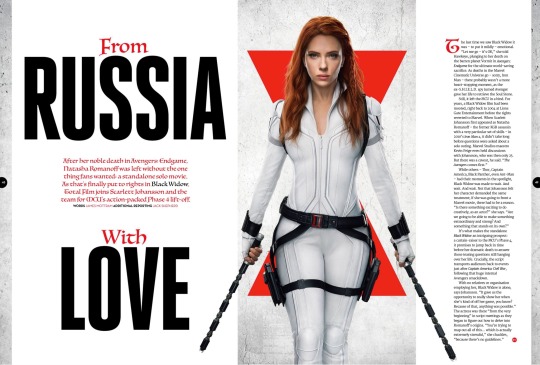
Still, it left the MCU in a bind. For years, a Black Widow film had been mooted, right back to 2004 at Lions Gate Entertainment before the rights reverted to Marvel. When Scarlett Johansson first appeared as Natasha Romanoff - the former KGB assassin with a very particular set of skills - in 2010's Iron Man 2, it didn't take long before questions were asked about a solo outing. Marvel Studios conductor Kevin Feige even held discussions with Johansson, who was then only 25. But there was a caveat, he said. "The Avengers comes first."
While others - Thor, Captain America, Black Panther and even Ant-Man - had their moments in the spotlight, the Black Widow was forced to wait. And wait. And wait. Not that Johansson thought that her character demanded the same treatment; if she was going to be in front of a Marvel movie, there had to be a reason. "Is there anything exciting to do creatively, as an actor?" she says. “Will we be able to do something extraordinary and strong? And something that stands on its own? "It's what makes the independent Black Widow an intriguing prospect: an inauguration of Phase 4 of the MCU promises to step back in time before her dramatic death to answer the provocative questions that still hover over her Crucially, the script transports audiences back to the events right after Captain America: Civil War, after that huge internal confrontation of the Avengers.
Without relatives or an organization that employs her, the Black Widow is alone, says Johansson. "It gave us the opportunity to really show her when she's kind of out of her game, you know? Because of that, anything was possible." The actress was there "from the start" at the script meetings, as they began to figure out how to delve into Romanoff's origins. "You are trying to map all of this ... which is extremely stressful," she laughs, "because there are no guidelines."
Fortunately, Johansson was not alone. In another inspired choice for the MCU canon, Feige recruited Australian director Cate Shortland, best known for discreet dramas like Somersault and Lore. While she was surprised, Shortland was encouraged by the creative freedom that Marvel was offering. “They allowed me to be myself and encouraged me to make a movie that I was passionate about,” she says. "We were allowed to have a lot of nuances and make a character-oriented film."

After several Skype sessions with Johansson, who also receives producer credit, Shortland worked with a Russian researcher to embody Romanoff's dark story: "the red in my ledger", as she told Loki in 2012 in Os Avengers. As she sings in the trailer, "We have to go back to where it all started" - the promising teaser clips of Romanoff as a young man (played by Ever Anderson, daughter of Paul WS Anderson and Milla Jovovich) in a childhood that seems far from idyllic. That's what makes Black Widow a family reunion of the kind that only Marvel would have the courage to conjure. Joining Romanoff is Yelena Belova, a sister-sister and fellow murderer who trained alongside her in the so-called Red Room, the punitive Soviet facility that produced 'Black Widow' spies.
"Their stories intersect," promises Shortland. "They clash." Played by Lady Macbeth's British star Florence Pugh, Belova is more than a physical match for Romanoff. Still, emotionally is where it really matters. "What Yelena does is kind of point to Natasha's pain," says Pugh. “She is part of Natasha's story. And I think that's why we have an opportunity to look at Natasha's story, because Yelena has been knocking on the door and says, 'Hey, let's deal with this pain. ”As Johansson comments, Belova is not just a carbon copy of his own character.
"She is completely alone. She is strong and different. She is so different (from) Natasha." Beside them are Melina Vostokoff (Rachel Weisz) and Alexei Shostakov (David Harbor), two father figures whose own stories intertwine with Natasha and Yelena. "This is the coolest thing with this whole group of people. They all had parts of their past that they regretted," says Pugh. “They’re older. They’ve had more life experience. They know more about the system, about this world they’re all living in.” Harbor, the Emmy Stranger Things nominated star, managed to put an indelible mark on the muscular Shostakov, better known as the Red Guardian super soldier, the Russian equivalent of Captain America. "There is a gangster quality to him," the actor smiles. "And he's covered in tattoos. He's got a beard and those gold teeth. He's crazy." But after years of making bad decisions, he's also full of remorse.
"He's in a bad situation," adds Harbor. "And he needs redemption." Weisz's character, Melina, is another who experienced the rigors of the Red Room, a place that put her in contact with Natasha and Yelena. Marking his first dive at the MCU, Weisz acknowledges that the film addresses the idea of discovering his favorite family. "It's definitely about finding out where you belong and where you came from, and what your background story was, and who you really are, and what matters to you - your ideology, I think." Along the way, Feige made reference to The Kids Are All Right - the 2010 Lisa Cholodenko film about a same-sex couple raising two teenagers. "Which is so weird," laughs Johansson. "You would never expect that from a Marvel movie." no it was the only strange nod to the film. Harbor speaks of Shostakov in terms of Philip Seymour Hoffman's drama teacher in the dramatic black comedy The Savages.
Or even expressing "the pathos of a small town, independent, family-run, weird movie... like Little Miss Sunshine". More understandable cinema references include "things like Logan and Aliens and The Fugitive," says Shortland. "We saw movies like that." Certainly, it's easy to see comparisons between Sigourney Weaver's determined Ripley, from James Cameron's masterpiece Aliens, and Johansson's Romanoff, an Avenger who has no superpowers. "We saw it as a force," says Shortland, "because she always has to dig really deep to get out of shit situations." According to the director, everyone in the production invested in deepening Romanoff - even Scottish composer Lorne Balfe (Pennyworth, His Dark Materials), who replaced Alexandre Desplat's original choice. Balfe looked at the character's origins, says Shortland. “He said, 'I want to put it on the ground, because it has been dug up in the movies in the past. I want to give her that flesh and blood. 'And he created this soundtrack that is really Russian."
However, perhaps the real blow here is to recruit Shortland, the first female director to face the Black Widow (and only the second, following Captain Marvel co-director Anna Boden, to enter the MCU). "This film would not be what it is without Cate Shortland," says Pugh. "I think having her eye, and having her mind with this script, has taken her to a whole different realm." Johansson agrees. "" You can feel it was made from a female perspective ... cooked there. "Although Ray Winstone's casting as Supervisor of the Red Room Dreykov (whose daughter contributed to the abundance of red in Romanoff's book, according to Loki) add more to the psychological battleground that the Black Widow will explore, it also deals with victimization, a very pertinent topic in the current climate. The Red Room itself is where trainees are brutally sterilized. "You will see that these women are hard working and strong, and they are murderers - and yet they still need to discuss how they were abused," says Pugh. "It is an incredibly powerful piece."
Judging by the 2020 Oscars, where Pugh and Johansson had their own private relationship session on the red carpet, the two actors got along very well. "She has a really beautiful career ahead of her ... she's a very special person," says Johansson, excited when Pugh's name is mentioned. More specifically, Pugh may well have more Marvel to chew on, if it is rumored that her character will take on the 'Black Widow' mantle for new adventures. By learning Parkour, kickboxing and knife fighting for role, Pugh can safely cut things physically, though she's reluctant to claim that the Black Widow is just a setup for future outings. "Even though it is obviously where everyone wants to go and want to think - think about what comes next - this film never really seemed to be what he was trying to underline." According to Johansson, however, test the audience who saw the film thinks otherwise. "Her character and her performance are so dear." Now, after more than a year of pandemic-related delays to July 2021), it will not be just a few lucky spectators who will be able to see. Black Widow will even be the first Marvel movie to debut simultaneously on the Disney+ streaming site (with a 'main hit' fee), an understandable move considering the uncertainty that still exists around the world. And in fact, after the success of the Marvel TV shows WandaVision and The Falcon And The Winter Soldier, it doesn't seem like such a strange home. Johansson believes that fans will respond to Black Widow, with this flashback of an earlier part of her life, bringing more poignancy to the Endgame's outcome. "Our goal was for them to be satisfied with this story; that maybe they could have some solution, I think, with the death of this character, in a way. It seemed like people wanted this." Shortland agrees. "We felt that we should honor his death," she says. And the Black Widow will surely honor him.
#blackwidow interview#totalfilm black widow#scarlett johansson interview#cate shortland blackwidow#scarlett johansson#florence pugh#david harbour#rachel weisz
20 notes
·
View notes
Text
Chapter 159th to the end
Hmm ‘got much more mixed feelings about the end
I wonder if the mangaka is a huge gamer because the characters tend to always compare the situation with video games. I honestly find it a bit annoying - like, I don’t mind the gamer character to think like that, but almost everyone have a thought like this at one point.
I have the feeling the whole Rika’s brainwashing was forced. Of course I wanted the two brothers to fight (Cain/Abel drama + Yuri setting as Seth yumyum) but it would had been better if Rika was the big villain the whole time/was really corrupted by Aikawa’s ideology.
That being said, I appreciated a little more Rika in the last half. I admit, he manages to do cool tricks.
Lowkey ship Sniper/White Feather for drama reason
Kuon’s death made me tear a bit - it was really heartbreaking </3
Too bad she doesn’t stay dead tho. It minimized the whole intensity of that scene and it feels too easy for the party afterward. Paradoxically, I liked the interactions she had with Yuri and Yuka.
Knowing there is a sequel, will they try to created a new body for her? Could be interesting. But I heard it was with new characters, so I don’t think I’ll read it. I was already reading it only mostly for Sniper Mask, so if I can’t get a shot of his riffle’s cannon, I’m not interested anymore.
I was honestly a bit nervous at the idea Kuon stayed in the head of Yuka - Ordinary quickly questioned this and pointed out very well my thoughts. It seems she doesn’t have to stay in his head and somehow body surfed with other God Candidates, but it still upset me for them all.
I thought Kuon was baby. She is. But she isn’t. Yet she is. However she isn’t. Actually-
(She is definitely less innocent she appears to be, as I expected, but much darker than I visualized it)
Disappointed Aikawa was just sitting there while Yuka and Rika fight. Like, I was excepting he asked Volleyball Mask to bring him some popcorns at one point.
I really need someone to make an animatic of the brothers fight with “the plagues” from The Prince of Egypt. It matchs it so well 😔
Oh look, Yukio becomes super strong! Is he a Closer to God now? Oh no wait, it’s a literal deus ex-machina!
If High Rise Invasion gets a second season, it means we will be able to admire the divine butt of Yuka at the very least twice.
The codes were interesting on paper, but I wished they foreshadowed it sooner. Making Kuon said “oh yeah, I just remember it now” every times is a bit cheap.
Makoto brothers really shined in this part. It was really refreshing to see them working together.
Does anyone have an idea of what Tenma means? I couldn’t found anything about this...
I don’t think it was a good idea to introduced Juo for the last arc. He was out of place. Aikawa was to the point to succeeded to become a god, was much more threatening and it was less thrilling to follow Rika&co fighting him. If the whole scenario happened before, it would have been more smooth in my opinion.
Tbh, I didn’t even get why Yuri wanted to save Juo at the end...
Administrator was f*cked up, but I couldn’t bring myself to hate him. His fate is just too awful and I understand he became so mad and drunk of power.
Praise Yuka for speaking the truth to the Supervisor. Wish he go further, calling him out that they succeeded thanks to their teamwork and not because they act in a "man is a wolf to man” way. Please, even bacterias understand the concept of helping the less strong to survive.
I need to pin up in my bedroom the page where Yuka said “you’re amazing” as a motivation quote.
Broke: Yuka is daddy. Woke: Yuka is a dad. Heck, he even lampshades it himself.
Did Prophet die?? He wasn’t show to be dead but he isn’t in the epilogue either...
My boy Yoshida didn’t deserved to die, especially not this way. That was dirty.
The whole betrayal of the dad is never addressed??? Where is the drama??? And the reunion of the Kusakabe didn’t move me at all. Do I am really suppose to care for a woman who tortured people with an obvious pleasure and turned my man Yuka and other countless people into puppets? Sorry but no.
Saito never becomes strong, halas. I’m not even sure if she showed up in the epilogue. It seems the author didn’t know what to do with her. She isn’t the only one in that case...
I understand why people complained the ending to be rushed. While it’s good to see Yuri alive, the whole family complete and angels stopping killing people, no god has been created (since somehow Yuri isn’t a complete god for now?), dimensions will maybe fused and insured chaos... yet the last thing the protagonist is seen doing is going to eat with her girlfriend. For a survival game genre, it’s hard to swallow — pun no intended. It’s way too cheesy after all the horrors they lived AND the threats incoming.
CONCLUSION
Yuka is definitely the best. What a husbando material.
Concept is very interesting but messy in execution at the end
Rarely boring, gorgeous art
Wished Yuka/Yuri/Rika worked more together and tried to bond as a family. It’s one of the most prominent theme of the manga, it’s too bad it mostly works as Yuri > Rika < Yuka and not all the three. (I don’t count when Yuka worked as Sniper Mask under Yuri since they didn’t know they were related.)
WISHED YURI/MAYUKO TO BE MORE OFFICIAL ARGHHHHH
Aikawa was a good villain, so was the administrator. Too bad they died so quickly. Juo could have been interesting too if he didn’t showed this late.
Wasted opportunity with Yayoi, she could have been an amazing villain.
It’s really too bad Yoshida didn’t manage to “really” meet one of the Makoto. I really think they could have influenced him positively.
...Maybe too many characters...? It’s hard to judge since there is a need to have so much (otherwise nothing would happen) but it’s difficult to find them all flesh out. And if the reader don’t care, the whole drama and horror are much less impactful.
I’m not sure how I feel towards Kuon now. I still like her, but I need to zoom off to understand better her character.
I’ll say it again: Yoshida didn’t deserved this fate :c
Ending rushed up, probably to prepare for the sequel but it’s still very brutal and cheesy, leaving a bitter taste as a farewell.
8 notes
·
View notes
Text
The Gifted Graduation: Reuniting with Channon (NON)
Pang and his two very conflicting and dark paths

Last month I said I was planning to write heaps of essays regarding the show the gifted graduation, in the end, I've just sat back and kept my theories and opinions to my self as this season started in a way I was not expecting, each time I planned to write an essay like who was the impostor, for example, it got revealed the next episode(Korn) and I couldn't find enough words and need to write it out entirely. After episode 6 though, Gifted has made me lose it, and if I don't try to break down all that's in my mind, I don't think I'll fully recover. Warning spoilers for both The Gifted and The Gifted Graduation so far. Please let us discuss this show more, for a while on Tumblr the tags were silent but I hope after this episode people run and become obsessed with this masterpiece. Also since it's spooky season Gifted and its scary themes and ideas acts a perfect Halloween show to focus on. Honestly, I'm hoping this show is the next show I focus on analysing the most. Okay, let's break down Pang and his character arc/ paths he could take this towards the end of this season.
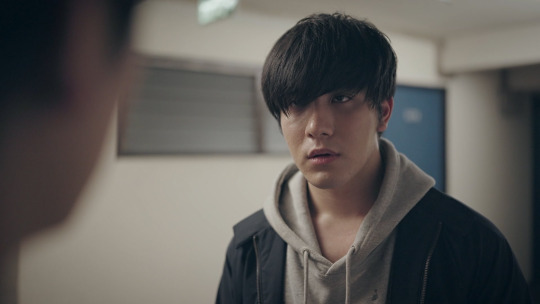
Reconvening With Non
The first thing I noticed about the scene when Pang reunites with Channon is this sense of foreboding and also a sense of a pseudo'fatherly-son' vibe from them. From season one Channon's presence has been made known as something that motivated Pang to choose good, and trust in the future, and also his story was the reason why Pang got stronger and decided to fight the system. Pang and Non have this energy around them because Pang looks up to him so much for his sheer will, kindness and heart, but also Pang was Channon's mirror/shadow character in season 1;
He also formed a close friendship with someone who he wanted to protect and understood why Channon made the decisions he made.
He also wanted to fight the system and managed to lose his memories and lose to the director.
He again got betrayed by his friends and Pom at the end of season 1 the way Pom was forced to betray Channon.
Like Non, he was meant to return back to not knowing anything and having the secrets buried of the school, he was meant to be forgotten and hidden. However, unlike Pom, Wave trusted Pang more than wanting to save his potential and strived to get his memories back and have him return to the gifted. So both Pang and Channon have both mirrored arcs where Pang represents a younger version of the latter and also foreshadows the way his psyche and character mindset is changing, growing but also could be degenerating. Before I talk about this, even more, let's focus on the other mirror character for Pang which points and alludes to another path he could take.


War With The Director and Himself
This is another reason for why I got weird vibes from the reuniting scene with Pang and Channon. I felt like I had to stay on my toes because we've done this before; trusting someone or underestimating someone as not being more vital than they are. In season 1 Pang and I failed to recognise what the director was in that season, it was clear he was the villain, but it also felt like he understood Pang the most and I couldn't for the sake of me figure out why. Until the reveal that he is an evolved version of Pang if Pang chose to succumb to using his potential for evil. It was terrifying the truth was there all along; he knew who Pang was, he learned about Pang's powers because he had the same.
The director proceeded like he did with Channon to belittle his beliefs about equality and break him down one by on; first by showing both of them how easy it is to be betrayed by their peers/and closest friends (Pom and Wave who did not want to lose their potential or suffer consequences because of them,), second by making them see they've lost and laughed in their face at their failed plans and third to degrade them down even further by returning them back to their starting position where they were unknown and not crucial (by erasing their memories).
The director is cruel, but his plans fail for both of these two as revealed in episode 6. Non had his memories retrieved but could do nothing and was left in the shadows being afraid of the director whilst working as an IT for the ministry (I call bullshit on this btw) and Pang's memory was revived by the help of his friends and Wave who believed in his vision (well some of them didn't as we see in episode 6). Season 2 keeps repeating the same motif and idea of Pang pushing down his powers, so he doesn't turn into someone like the director, he doesn't want to be evil or manipulative he wants to be a fair leadership.
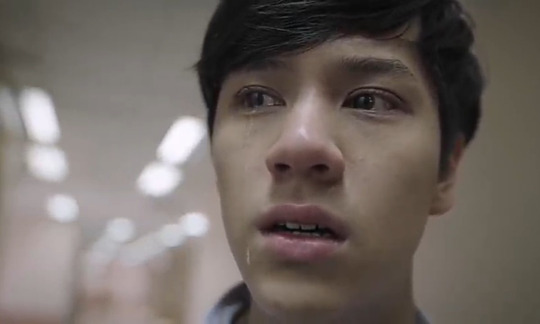
Pang's Struggle For Control
Season 2, however, seems to keep pushing Pang in the middle of this two paths, it's either he realises there's no way to survive and becomes like the director to return things back to normal, or he ends up losing the game and being pushed aside and haunted as a failure like Non.
The fight to win and have an equal system seems more impossible if Pang doesn't choose to take the director's path. The lack of unity and togetherness in his own team and the losses that have been acquired by episode 6, could drive him even further to have to submit to his potential and use it the way he's been trying to avoid.
We see hints of chaos still on the way; his trauma for losing and causing the deaths of his peers for his cause, the resentment for his leadership being questioned and replaced by Punn who seems slowly tired of being under him, and the lack of trust for both his peers and the adults. He may gradually adopt the director's mindset that equality is impossible, and being gifted is the only way to achieve victory and get what he wants in this environment. He may even use his powers to make people forget everything and go back to the start, just like how the director does whenever chaos threatens the school.


Pang vs Non
Non's return is interesting to me, he seems good, and he appears righteous but broken. It's easy to feel pity for him and be misled by his words. It's the same way we were misled by the director and thinking he knew nothing about Pang's plans in season 1, we underestimated him because we felt he had no vision. Non is like that, another mirror character that can be revealed to be evil all along, the master manipulator.
Well, why not? He's been haunted and traumatised for ten years since he got his memories back, probably manipulated and told wrong ideologies by the ministry head who wants to destroy the director and this can easily lead him to be filled with vengeance and anger and resentment, and a wish to get revenge.
Not only that he went to the one person who was also feeling just as resentful about the gifted system (he says it was an accident, but I don't believe that for one bit), his speech about him being a failure is sad. It pushes the audience to want to root for him, but it makes no sense how the ministry just hired him to become an IT man and be left in the shadows, only for him to return because he did not want to have the virus spread around and used on the director. No he implanted that idea in Korn, he pushed Korn by only giving him small details about the drug and what it does, he also seems to have little knowing looks in this episode; times where he looks a bit more menacing, more sly, more cunning. I focused on his facial expression during the confrontation with Korn, and it seemed too knowing, too secretive, to resentful.
Non is not someone who can easily be pushed away not after what happened to him in Season 1, not whilst Pom gets to run around being a teacher in the school and misleading more students to being hurt, not whilst the director continues to be director in the school and hide him as a secret, not whilst the gifted programme is still causing chaos and disasters that aren't right. His sense of justice is probably more than his fear of the director. His reason for not wanting to come back makes no sense to me, it feels off. But that's why him being the villain of the show has even more potential, to hurt us just like the director's final plot twist in season 1, someone who we underestimated because we believed he was on our side, he was right and just, and he had let things go.
That's the same as Pang, we see him as someone trying so hard to not shift from his aim and path, someone who idealistically believes in equality and winning the war but are we sure he'll stay that way. He could follow this path. Instead, becoming the resentful failure who feels exhausted from failing and having his aims ruined, he is also mentally pushed to the brim just like Non, he is also being shown futility at every try, and he is being betrayed just like Non.
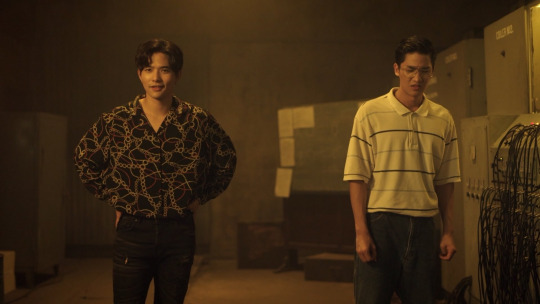
Pawns Of The Ministry
Pang joining the ministry to help defeat the director is just probably mirroring Non's real path, He's probably been told the same truths revealed to Non when he first got founded by them.
To me the ministry is our main villain this season, with opposite ideologies to the director, but how are we so sure that the head isn't on the other side of the spectrum to far, what if he harbours hatred for the gifted programme so much because he also wants vengeance, what if he wants to again do what the director wanted but even more harshly or crueller. It's one of the two.

The ministry is another form of representation of leadership from the adults, and we know in this show, the adults are not to be trusted, deceitful and cruel and too set in their own ways. Willing to sacrifice anything for their cause. Pang joining them seems good right now, but I bet Non is also one of them. He's now an adult just like Pom remember we trusted Pom in season 1 we thought he was good, only for him to indeed be weak and submissive to the director's control. Non probably is the same as Pom was, someone who wants to be good but is perhaps now instead, under the ministry's control.
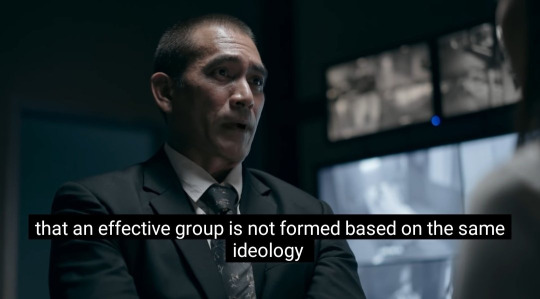
The Ideology Of The Ministry
It's a war of politics between these two ideologies and leadership from adults, and we're about to see it play out with Pang as a pawn. That's why I believe he will snap towards the end and stop being just a pawn, he will probably realise that he needs control and that's why he's most likely to mould into the mixture of these two characters he represents, and to be honest that's not a good thing. Luckily he has Wave by his side, that's one thing we can count on is Wave to bring Pang away from these two paths the way Pang brought him out from his own downward spiral in season 1. Both help the other and push the other to be better, to breath and calm down, to trust in the positives. Wave is going to do that for Pang let's hope it's not just too late when he does.
#the gifted#the gifted the series#thai bl#analysis#cwg#FVete#the gifted graduation#tgg#october#halloween
43 notes
·
View notes
Text
Sanders Sides Theory, The Sides That Aren't Pt 1: Remy and Emile
Theories Master Post
So my sick and feverish brain had an epiphany when researching a theory on Roman and Remus (two epiphanies actually) that involved revitalizing a scrapped idea and latching onto something that initially started as a joke and then accidentally found evidence for. So let’s talk about that.
So let’s start with that scrapped idea here in part 1.
Let’s talk Remy and Emile.
These are two characters who are constantly associated with the sides in fandom in various interactions and ways, and yet why? Shouldn’t they be dismissed as just two random characters that Thomas and co made in the seemingly endless number of videos they’ve created? I mean, the two supposedly live in an entirely different universe than the sides. So we shouldn’t be “reading” them as sides, logically speaking.
So why such a big part of the fandom is latching onto these characters as sides (or equivalent to sides) despite the fact that they don’t actually appear in Sanders Sides (or at least haven’t yet, but we’ll get to that)?
Well, that answer is a bit layered.
The first and obvious answer is color theory, which I talked about in my Orange side theory. Essentially the audience knew for certain the sides were following color patterns from the moment Janus made his appearance with his bright yellow gloves. Patton and Logan’s colors existing independently of each other was what brought initial hesitation to that model because they were both blue, but they aren’t exactly, instead both primary color sets (Red, Blue, Yellow) and (Cyan, Magenta, Yellow) are being employed as well as the secondary color set (Green, Purple, Orange). (Yes, yellow is included in both primaries, which is part of the brilliance of it being used for Janus because it only adds to his character as existing in binaries.) You’ll notice however, that to complete the (CMY) model, you need the Magenta. Visually speaking, it’s easy to pick out the pink tied Emile to fill that role.
As I’ve already stated, I’m not the only one who thinks Emile’s the perfect slot for that ideology, there’s a reason why he keeps appearing in fan art and fiction related to the sides. Is it his tie alone though that pushes the audience into placing him into that role? No. If it were that simple, I would simply point out that c!Thomas is also often slotted into the “pink spot” and leave it at that because c!Thomas is clearly already included in the Sanders Sides as we see him there. No, instead I’m here to tell you that assigning pink to c!Thomas is a mischaracterization.
But again, the answer of how and why is a bit layered, so let’s move onto Remy for the moment and circle back to Emile.
Going back to color theory for a moment, (CMY) is actually an incomplete version of that primary model. It’s actually (CMYK), with the K standing for Black. So in truth, to fulfill that model we actually need both a Magenta and a Black side. You are likely already predicting what I’m going to say, but Remy is indeed the perfect fit for that role and not simply because of his outfit choice.
To start off by defining why Remy is a side, we need to understand what the sides are and what differentiates them from the “shorts sides”.
For those of you who are unaware, the Sanders Shorts has a set of characters (Teacher, Anxiety, etc.) who have their own names that call back to their roles in a simplified, easy to remember way (Teacher=Teal, Anxiety=Andy, Dad=Dyad, and Prince=Pryce). These four in particular are characters that the audience immediately connects with the main four sides from Sanders sides, but can also immediately recognize a dissonance between them.
For example, Virgil and Andy are not at all synonymous with one another. Andy wears Virgil’s old jacket, it’s true, but he also has a very relaxed attitude whenever he’s not specifically “giving” anxiety. He also is different than Virgil because he clearly does not suffer from the symptoms of anxiety he gives. Instead, he simply turns up, does his job and is satisfied in that accomplishment. Andy is more like what Virgil tried to be in the first season, but failed because he simply cared too much.
Andy is more of a one dimensional character who fulfills a single role, he isn’t shown to have specific likes, dislikes, hopes, wants, dreams, or fears like Virgil is. Virgil is a complicated, multi-faceted character who cares, quite a bit. He has as much, if not more anxiety than he gives because he cares about the result of c!Thomas’ actions. He wants to protect c!Thomas and the other sides, he likes the color purple and MCR, he dislikes being patronized, but he yearns for love and acceptance as who he is.
What ultimately differentiates the Sanders Sides, from the Sanders Shorts sides is their dimension. The Sanders Sides are characters with layers, depth and personality, while the Sanders Shorts sides are flat characters in comparison.
So what does that have to do with Remy?
Remy is a multi-dimensional character. He’s defiant and rebellious, he likes to stay out late and party, he likes lavender, loud music, pumpkin spice, layered clothing, autumn. He’s over dramatic sometimes and funny. He stands out from the one dimensional characters in the Sanders Shorts because he is much more layered than them.
However, Remy’s stuck in the Sanders Shorts videos because of how c!Thomas sees him, as Sleep. How is a character who represents Sleep meant to help c!Thomas in his everyday life afterall? Except, c!Thomas historically simplifies and misunderstands his own sides. Patton is more than morality, he’s at the center of a whole range of emotions, he’s the heart. Logan isn’t just simple logic, he tries to be considerate of the others, he’s hopeful and has a deep understanding on a whole range of subjects that often go outside the bounds of simple, logical knowledge. Saying that Patton is Morality or Logan is Logic is an oversimplification of what the characters represent, that was done specifically by c!Thomas. Then, understanding Janus as Deceit was in many ways a flat out misunderstanding of what the character represented. Patton told the audience from the beginning that Janus is self-preservation. Lying is one of the tools Janus uses to achieve that end. (More on that in another theory.)
I believe that Remy being labeled as Sleep is a misunderstanding of him by c!Thomas. (I also believe that this is an intentional move made by Thomas & co.)
So, if not Sleep, then what is Remy? Well, as I’ve stated, that answer is complicated because all of the Sides are an array of things. They’re complex characters who can’t really be simplified to a single term and doing such is a fallacy, but as it helps audience understanding I’m going to do it anyway.
In simplest terms, Remy is Apathy. Consider for a moment that at his baseline c!Thomas is someone who cares a lot, like a lot about everything. The whole nature of Sanders Sides as a show is literally how much he cares. However, caring too much can be a problem, leading to emotional over-exertion. People need a certain level of apathy to be able to sleep, to push all their problems away for a little while and take time to decompress and recharge. This would be why Remy is associated with sleep. He gives c!Thomas the mindset to be able to sleep, rather than being the function itself.
We can also see evidence that Remy is apathy in the character itself. Remy lives a very “in the moment” kind of life. He parties, constantly drinks coffee, and generally seems to do what he wants, even when it gets him into trouble. (Like getting completely lost.) He plays on his phone when people talk to him too long, he gets bored with being chastised, and essentially shrugs off criticism. It’s because he’s apathetic. He is essentially the embodiment of “fuck it” behavior. In real life it’s the often people who party most nights that care the least about their lives because they’re unhappy and a little dead inside. The partying “in the moment” behavior acts as a distraction from the nothingness. Sort of like simulating emotions with physical rushes (high amounts of caffeine or alcohol, loud music, crowds, essentially anything to drown out the “nothingness”). On top of that, Remy also embodies some gay stereotypes in a way that many of Thomas’ characters don’t. Again, it’s because he doesn’t care about being stereotyped. He’ll say want he wants, act how he wants, and live how he wants.
Even his name is evidence. While we might be drawn to the conclusion that Remy is a play on the Rem-cycle (and that is almost certainly part of it given the Sleep connotation, though the Rem-cycle is actually the point at sleep where the brain is most active and a person is easiest to wake from sleep) You should also be aware that it’s a nickname for the name Remington. Remington is derived from the old English word “hremm” that meant both “raven” and “settlement”. While a raven is the perfect association for the black color-scheme and some of his personality traits, the literal and metaphorical meanings of the term “settlement” I think is the perfect idea to associate with what I believe Remy is meant to embody. Both the literal place to stop and rest, a safe place, but also the settlement of the mind, being able to push all of the emotional and literal fatigue of the day away. The fact that Remy is gone so often is very telling in the stressed and emotional state that c!Thomas is in.
Also in regards to names, Remy and Emile are intrinsically connected. While both have name meanings that are very important to their characters, they’re also the names of the brothers from Ratatouille. (A movie basically about pursuing your dreams when the world and even your family are against you.) Their names and the connection between their names is evidence that the two characters were designed together as a tribute.
So let’s get back to Emile for a bit. Like Remy we know he’s more complicated than many of the characters from the shorts. For example, we know he loves cartoons, references, and jokes. He’s generally seems to be a happy person and is a therapist (or at least plays one). So, what exactly is he if he’s a side? Well, as I’ve said none of the sides are so simple as to signify one single thing. On top of that, I think his lack of appearance in almost anything besides Cartoon Therapy is evidence to the fact that c!Thomas doesn’t understand him. Like, I think he has some grasp on Remy, despite misunderstanding him, however I think he simply has no connection or understanding of what Emile does/represents. Yet, if I had to label him with a single trait for simplicity sake, it would be Acceptance, essentially the other reason why Sanders Sides exists (or at least has conflict).
There is so much that c!Thomas hasn’t accepted about his life, his career, but most importantly about himself. It’s why the debates go on with each new episode and why the sides struggle to accept each other. It is also why Emile would not have yet made an actual appearance yet in Sanders Sides, I would consider him to be a rejected and repressed light side. Also, embodying acceptance, it would be his job above all else to listen to the other sides. A good therapist does not add their own voice and opinion into the mix until their client is ready to hear it. They need time to get through it all and process. That is exactly what Sanders Sides is already doing for c!Thomas.
Let’s get back to names for a moment, as I said, Emile’s name meaning is also incredibly fitting for what I believe that he represents as a Side. Emile literally means “coming from the Aemilian family” which is in turn derived from the Latin word “aemulus” meaning complete.
My theory is essentially that Emile is going to be our last surprise, maybe coupled with Remy or maybe directly after Remy. Remy, the “darkside” who is often AWOL because he’s self aware of how dangerous he can be in too high of doses and Emile, the “lightside” who is repressed. Essentially, Apathy, reminding him that it’s okay to let go of things for a while and Acceptance, teaching him how to accept himself above all things.
I had initially scrapped this theory because a friend told me Thomas and co had already denied that Remy and Emile are in the Sanders sides universe and I have a little bit more to say about that in particular in part 2 (which should be coming out in the next couple days, so keep an eye out) but also I want to just set a reminder that you shouldn’t believe much about what a creator denies about their work. Of course they aren’t going to reveal secrets or surprises to you early. Do I know for a fact that Remy and Emile are Sides? Absolutely not, all I can do is align the evidence and present to you my findings.
(Also general shout out to @candied-peach for listening to all of my insanity to get me to this point. Seriously, thank you.)
#sanders sides#remy sleep#ts emile#ts remy#emile#also mentioned#logan sanders#roman sanders#virgil sanders#patton sanders#ts teacher#ts dad#ts dad character#ts prince#ts anxiety#sanders sides theory#theory#long post#analysis#should be finishing#my audio#but I keep losing my voice#so that's on hold#sorry guys
48 notes
·
View notes
Text
@cameoamalthea made a post about Bo-Katan and I have Many Thoughts, but for ease of reading I’ve put my response here under the read more! (warning: spoilers for the whole of season 2 of The Mandalorian)
Why Ahsoka still supports Bo-Katan is a GREAT question (that I actually started thinking about earlier today), but first, I want to talk about the rest of Bo's past - she is NOT a good person. She's definitely a Yasha Greyjoy, believing in the conquering, predatory supremacy of the Mandalorians, and something I'm exploring in a fic series I'm currently writing is how she came to be that way.
I think it was mentioned somewhere that Satine's father was Duke of Mandalore before she was Duchess, and it was him who started the pacifist New Mandalorian government. I don't know if this is a hereditary-monarchy kinda situation or more democratic, but my interpretation is "there are sort of royal families and even though there technically are elections, it's always Clan Kryze or Vizsla or similar who get elected". My headcanon is that Satine was the eldest child and so groomed to take the throne, while Bo was sort of pushed to the side in very typical second-child fashion. So she grew up with a fair amount of internalised resentment towards her family, and then at some point fell in with some more traditional Mandalorians, and from there it was all too easy to oppose her father and sister and everything they stood for.
So, she believes Mandalorians are top-of-the-food-chain warriors, and that it's perfectly okay to burn villages, kill helpless people, and smack the butt of any skinny torgruta kid who shows up unannounced. She's a Bad Person. She’s also so committed to this ideology that she’s willing to team up with a former Sith and a bunch of criminals to get what she wants. But then Maul kills Vizsla, and declares himself leader of Death Watch and Mandalore, and this is her limit - as you said, not because he's bad, but because he's not Mandalorian. (It was at this point that I, as an audience member, really started to like her - the cool female lieutennant is standing up to a bad guy! And it's for a reason that isn't "this is morally wrong and I have developed a conscience"! I love that, because after a while that does get a bit boring.) So now she's fighting Maul, and we know the Jedi are also fighting Maul, so it makes perfect sense for them to team up against their common enemy who is far stronger than each of them.
I then think that during the Siege of Mandalore she has a bit of an internal crisis. Before, when the Shadow Collective were pretending to invade so Death Watch could save the day, yes there were Mandalorians being hurt, but it was all under control, it was just a pretend invasion, after all. Now, however, everything is much more real - the war is now on Mandalore, her home, and it's hurting her people, and there's nothing she can do to stop it without more fighting. It's actually partly her fault, because she was part of Death Watch, and they set this whole thing in motion. So she then sees Ahsoka, who is committed to peace, take out Maul with no casualties (up until this point, most if not all of the Maul fights she's seen either involve decapitation or lots of explosions - if she'd tried to take him, a lot of people would have died in the fight, both soldiers and innocents). She's also been part of the desperate fighting in the streets, and I think she's finally starting to realise that maybe Satine was right - their people can't take much more of this, because they're going to destroy themselves. Maybe they should think about less combative ways to rule themselves? She says “I wish I was good at something other than war” and then “My sister tried that. I never understood her idealism” and I always thought there was an unsaid “until now” at the end of that second one - she wants to be what Mandalore needs, and she’s realising that might not be a warrior.
But for now, they need to get through this, and that means fighting off the crime syndicates that are literally in their streets, that means accepting the help of the Republic and its soldiers, and it eventually means Bo-Katan herself taking up the position of ruler of Mandalore. We know that doesn’t last long, because Saxon and the Empire rise up to take it from her, but then Sabine finds the Darksaber and unifies the clans. Bo says “I had my chance to rule, and I failed. I am not my sister. I am not the leader you seek” - she’s definitely done some reflecting on maybe-Satine-was-right-after-all, and starting to realise how badly she’s messed up. But as you say, Sabine and the other clans push her into accepting the Darksaber and the throne.
Now I (finally) come to Ahsoka. Ahsoka saw Death Watch Bo - she directly saw her burning the village, and she also saw the effects Death Watch’s attempts at taking over had on Mandalore when she went to help weed out corruption in Sundari. Yes, a lot of it was due to the war, but a lot of those problems were definitely exacerbated by Death Watch’s actions and presence. Ahsoka then teamed up with her to fight Maul - ‘the enemy of my enemy is my friend’ - and on my first watch I didn’t think much of her saying “I’ve learned from the best, including you.” I was too busy thinking “yeah, Bo-Katan IS the best!” but on my second watch - why does Ahsoka think she’s ‘the best’? Did she see something that we, the audience, did not? The Clone Wars didn’t show us any scenes with just Ahsoka and Bo before the fighting started - perhaps they had a conversation where Ahsoka confronted Bo about the terrible things in her past, and Bo explained that she was misguided and regretted it and was trying to do what was best for her people now. That would make sense.
Because then, in The Mandalorian, Bo directs Din to Ahsoka (edit: and she does it very specifically, too - usually in Star Wars you get a system, maybe a planet, but Bo knows the exact city). Why would she even know where Ahsoka is? They didn’t interact in the Rebels arc. From what we see of Ahsoka, Tython Corvus isn’t even her permanent residence, she’s just there to help one village tiny city and get information out of someone. So why does Bo have very recent information on her location? The only answer is that they must be allies who share that information willingly. And since the character of Ahsoka is Good, her allies must also be - unless they’ve made another temporary arrangement to team up and defeat a common enemy. But Bo is hunting Gideon and Ahsoka is hunting Thrawn (I am unbelievably excited) so they’re apparently on different quests. Which means... they must be friends.
In the episode The Heiress, Bo acts pretty okay. Yeah, she calls Din’s way of life a cult and is kinda rude about it, but it’s in response to him literally telling her she’s not a Mandalorian as, like, the first thing he says to her, and there are a lot of people out there who are rude and dismissive of someone’s way of life/upbringing without being Inherently Evil and Bad. Her motivations in that episode are: save a fellow Mandalorian, who might also be able to help her find and fight Gideon, and find and fight Gideon. She’s not interested in helping Din on his side-quest to reunite a child with his people - she feels the struggle for Mandalore is more important than one child.
In the episode The Rescue, however, she definitely goes out of her way to insult Boba and Jango completely unneccessary. Maybe she has a valid reason to dislike clones? I don’t think it would have anything to do with the Republic/Empire’s takeover of Mandalore - that wasn’t the clones’ fault*. She asked for Republic help, and then it was Palpatine and Saxon who kept them there. However, other than that, I don’t think she did much wrong? She still has the single-minded determination to duel Gideon and retake the Darksaber, which she might feel a need to do this time around because she has to prove - to herself, to Mandalore, to everyone - that she’s worthy of it. But for her, even though she’s accepted that maybe pacifism is okay, Mandalore is still pretty high up on her priority list, so it comes ahead of Din, Grogu and the New Republic.
So future seasons have a lot to answer for:
Why is Ahsoka willingly allied with Bo-Katan, given that Bo has never done anything objectively good/anything that wasn’t motivated by a need to see Mandalore ruled by Mandalorians wearing beskar?
Why does Bo hate the Fetts so much?
How will Bo handle Din having possession of the Darksaber now?
(edit: the below was added after posting)
* Why I don’t think it’s the clones’ fault: Bo knew what she was doing when she invited the Republic to help her retake Mandalore. Obi-Wan specifically asked her about it, and she said she would deal with it later. She knew that by using Republic gunships and clones the Senate would take an interest in Mandalore, and it would be seen as Mandalore allying itself with the Republic. When the Republic then became the Empire, the clones would either have simply continued serving the Senate - formerly Republic, now Imperial - or been decommissioned, in which case the Senate would have sent an alternative force to represent its interests. Unless there’s a specific mention of this in canon that I’m missing, the clones would only have been following orders from the Senate, and that would have been very clear to the Mandalorians. Any betrayal of Mandalore came from the Empire not leaving after Maul was defeated, not the clones spontaneously deciding that now the Republic was gone, they’re free men, they can choose between Mandalore and the Empire, and they choose the Empire.
Bo specifically has it out for Jango and Boba for some reason. I think she knows who Boba is, and that he’s not just any clone - I’ve seen several posts on this but the most obvious is that Boba was a pretty high-profile bounty hunter in the OT who she must have heard of. I think it’s something around how she percieves Jango’s Mandalorian-ness, his status as Boba’s father and the process of cloning in general, and therefore Boba’s claim to any Mandalorian armour, heritage and identity.
12 notes
·
View notes
Text
I did a post, by request, about forgiveness earlier based on two different character relationships we have seen with Alex. This is sort of related to that, but also about the small window into the Manes family dynamic that we are getting to see glimpses of. There will be spoilers for season 2 through 2x10 so heads up for that. (Also, you know, this is based ONLY on everything through 2x10 so I’m calling it like I see it now, no liability for future nonsense that may or may not joss me.)
We met Gregory in 2x10, another Manes brother, and an interesting parallel to Flint in 1x12 jumped out at me so I’d like to talk about it here. CW for discussion of child abuse, homophobia, victim blaming, and gaslighting.
What I want to highlight is than in both episodes, 1x12 with Flint and 2x10 with Greg, both brothers acknowledge the abuse Alex suffered under Jesse. But the way each of them does so and the way Alex receives the sentiment is wildly different, and I think it tells us a lot about the family dynamic of the Manes brothers that we are not otherwise able to see.
*A small disclaimer about my headcanons, we know in canon that Flint is older than Alex. Personally, the way I interpreted the body language in the scene with Alex and Gregory is that Gregory is younger than Alex so that’s where I’m coming from analytically. Also, given that we know Flint is being blackmailed by Jesse, it’s very likely that all the Manes boys were raised in an abusive environment. It does also appear, from remarks that both Flint and Gregory make, that Alex had it “worse”, so my headcanon is that Alex bore the brunt of the physical abuse.*
I’ll start with Flint, because we meet him first. Significantly, we meet him in a military setting. This is Jesse’s world. Also, as is implied later, Jesse’s sphere of influence. Flint has clearly bought into Jesse’s worldview in at least part (the aliens), and feels powerless enough against him to accept the rest as unchangeable.
We see this also in the way he talks to Alex, “Do you ever get tired being the black sheep of the family?” The phrasing of this is distinctly victim blaming in nature. As if Alex could stop being the “black sheep” if he wanted to. It’s not necessarily implying that Alex could choose not to be gay, we actually see nothing about Flint in canon that indicates he’s homophobic in the way Jesse is, but it is implying that if Alex stopped making trouble he could be accepted. Like the responsibility lies with Alex, not with Jesse.
In fact that seems to be Flint’s strategy of dealing with his father if Alex’s rebuttal (Do you ever get tired of following the flock?) is any indication. So Flint’s relationship with Alex falls along the lines of Jesse’s. Again, Flint seems to have swallowed part of it whole (Alex could prevent his abuse if he wanted to) and accepted some of it as something he can do nothing about (”I know it wasn’t easy for you, growing up with Dad” aka, Alex was, in fact, abused).
There’s an interesting dynamic physically too. Discounting the moment in the corridor with the gun, since neither of them knew who the other person was at the time, there is a moment in the research room where Alex turns to leave and Flint grabs him
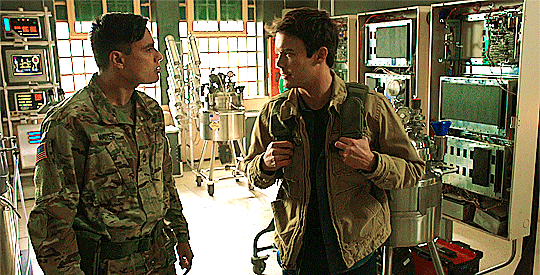
[ID: Inside the research and development room at the prison, season 1 episode 12. Alex is standing next to Flint (who is in uniform), arms folded close clutching the straps of his backpack. He turns to go and Flint grabs the top of his bag, yanking him back towards himself. Alex’s arms fling out slightly as he looses his balance.]
A couple things here. One, Flint is showing no regard for Alex’s personal space. He exerts control over Alex without hesitation; he doesn’t want Alex to leave and his first instinct is to prevent him from doing so physically. He puts his hands on him like they have a right to be there. Two, Flint yanks him in a way that puts Alex off balance. I don’t think it was necessarily deliberate, just the first thing he thought to do, but Flint knows Alex is missing part of his leg. Earlier in the scene Alex made reference to the fact that Flint is “able-bodied”, jerking Alex like that (towards his prosthetic side no less) shows complete disregard for the fact that Alex would have more trouble than most with keeping his feet. (He doesn’t fall but that’s not the point.)
The most telling thing though is Alex’s reaction to Flint. When he offers an, apparently genuine from his standpoint, expression of regret for Alex’s abuse (I tried my best to protect you from him) Alex rejects him out of hand (oh, spare me). To Alex, Flint’s olive branch has no meaning. Either because he feels it’s an empty gesture or because he believes it’s a false one.
Gregory offers an opposing viewpoint. Like Flint, the setting in which we meet him is significant. Not only is it civilian, it’s on a Diné reservation where he apparently lives. We haven’t met Alex’s mother yet and we know almost nothing about her in canon so I can’t speak to exactly what it means that Gregory is choosing to center his life with his mother’s side of the family. But symbolically, from an overarching analysis standpoint (which is my playground), there are a few things.
Alex’s mother represents Jesse’s opposite in almost every way. In the physical, female versus male and Native versus White, but also ideologically. We know at some point that she left the Manes family, which represents a rejection of Jesse’s influence and beliefs. Gregory not only leaving the Navy when it was his time but also choosing to live in a place where the US Government has extremely limited legal jurisdiction represents a similar rejection. Something Alex acknowledges when he congratulates Gregory for “getting out”.
Gregory’s language also sets him apart from Flint, he repeatedly aligns himself with Alex’s standpoint over Jesse’s. “I don’t think I get to be free until you are, Alex” indicates that he feels it is his responsibility to carry the burden of abuse as long as Alex does. In fact, carry the burden of Alex’s abuse specifically, “Let me hate him for you” tells me he is not hating Jesse for his own reasons.
“I wish that I would have stood up for you more” and “I owe you that much” also places the responsibility for Alex’s abuse on Jesse (and himself, he feels guilty) and NOT on Alex. Flint seems to imply that it was something Alex could have avoided, or made less worse, if he had kept his head down and fallen in line. Gregory is placing the blame on the abuser, not the abused.
Physically, unlike Flint, Gregory respects Alex’s physical boundaries. They greet each other with a handshake, and when Gregory goes to say goodbye he offers his hand again.
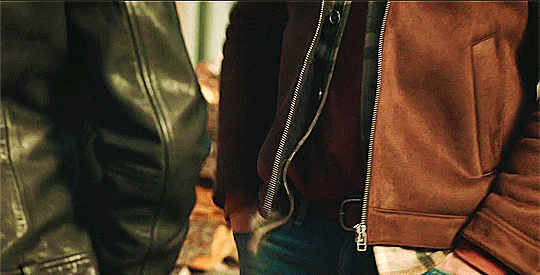
[ID: Alex and Gregory stand facing each other, their torsos and waists visible but their faces out of frame. Gregory takes his right hand out of his pocket and offers it towards Alex for a handshake. He makes no other move forward.]
Importantly, this is the only move he makes. He doesn’t move into Alex’s space and he doesn’t grab Alex’s hand. He’s following the lines set down by their previous interaction; he’s not asking or expecting anything more from Alex. He does not believe himself to have a right to Alex’s personal bubble. Alex is the one to initiate the hug, not Gregory. And again, Alex’s reaction is the most telling part in all of this.
Aside from granting Gregory access to him physically (the hug), he also explicitly invites him to visit him in Roswell, granting access to his home and personal sphere. Alex is giving permission to Gregory to involve himself in Alex’s life, which is something we don’t see with Flint.
This kind of comes back to the forgiveness part I mentioned at the very beginning, it’s clear that Flint does not have Alex’s forgiveness or trust and that Gregory does. The thing is, neither one of them asked him for it, but the reason why dictates which one he grants it to.
Flint didn’t ask for forgiveness because he doesn’t think he needs it from Alex. Flint is the one putting blame on Alex for how he was treated, in no way does he hold himself responsible for what happened growing up. In his own mind he did what he could and that was enough. Gregory isn’t asking for forgiveness because he doesn’t think he deserves it. It’s obvious that he is blaming himself as much as Jesse for what Alex went through, and he on some level expects Alex to do the same.
It’s a great dichotomy, and it’s a wonderful way of gaining a lot of insight into something that has only every really been off screen. I’m looking forward to finding out more of the Manes family dynamic as we go along, but picking scenes like this apart is honestly a little more fun for now.
#roswell new mexico#rnm#alex manes#flint manes#gregory manes#jesse manes#manes men#tw abuse#tw homophobia#tw victim blaming#my roswell meta#list#roswell season 2#a riley special
80 notes
·
View notes
Text
TerraMythos' 2020 Reading Challenge - Book 34 of 26

Title: The Harbors of the Sun (2017) (The Books of the Raksura #5)
Author: Martha Wells
Genre/Tags: Fantasy, Epic Fantasy, Adventure, LGBT Protagonist, Female Protagonist (Kind Of), Third-Person
Rating: 9/10
Date Began: 12/11/2020
Date Finished: 12/25/2020
Moon and his friends are reeling from the betrayal of a former ally. With several members of their party kidnapped, and a mysterious weapon stolen by their new enemy, the chase is on. He and the others must infiltrate unknown territory to rescue their missing family and avert a deadly calamity. At the same time, a massive army of Fell are gathering to attack the Reaches. The Raksuran colonies of Indigo Cloud and Opal Night must join forces to defend their home before they are overrun and destroyed.
“But you don’t want to be near Fell,” Moon guessed. Considering what had happened to Shade when they had been captured by the Fell flight northwest of the Reaches, it was only rational.
“No, I don’t.” He looked at Moon hopelessly. “Is that weak?”
Consorts were supposed to be weak and delicate and need everything done for them, but Moon and Shade were different, and nothing was going to change that. And “weak” wasn’t really the right word for what Shade meant. What he was trying to say was harder to express. It was giving into feelings other people thought you were supposed to have about things that shouldn’t have happened to you in the first place, but were not like the actual feelings you did have. There wasn’t a word for that in Raksuran or Altanic or Kedaic or any other language Moon knew. Moon said, “It’s not weak.”
Full review, some spoilers, and content warning(s) under the cut.
Content warnings for the book: Graphic violence and action. Implied past r*pe (it’s the same plot point as previous books). Genocide is a big plot point of this one.
The Harbors of the Sun is the fifth, and presumably final, book in the Raksura series. And boy what a ride it's been. I've enjoyed settling in with a longer fantasy series. While I'm excited to read something new, I'll miss these characters and the captivating world they inhabit. Since this is probably the last installment, I'll look into book-specific details, but also provide some series retrospective commentary. I won't touch on everything, just things that stick out to me.
From what I can tell, The Harbors of the Sun is a little controversial with long time fans. I can see why, and it's the same reason I added "Epic Fantasy" to the tag list. Most of the series has focused on small-scale conflicts centering on the Raksuran characters. There's hints of large-scale stuff in The Siren Depths, but that crisis is averted, so thus not fully realized. However, these last two books contain a much longer storyline, and the stakes in The Harbors of the Sun are potentially catastrophic not just for the Raksura, but thousands if not millions of people. Think The Lord of the Rings trilogy vs The Hobbit in terms of ramp up.
Due to the larger scale, this book also embraces a rotating point of view. The original trilogy is entirely from Moon's perspective, and The Edge of Worlds only dips its toes into alternate POVs. The Harbors of the Sun features multiple character groups all doing important things to the story, so there's lots of perspective shifts. While I still consider Moon the main character, he shares the stage with many others.
Personally, I like the scaled up conflict. It seems like a natural progression of the series. While not every point of view wows me, finally seeing some stuff from Jade and Chime's perspective (for example) is really cool. While Moon is an enjoyable protagonist, he often interprets characters and motivations wrong. Getting someone else’s take on a given situation or character is refreshing.
One of my favorite alt-perspectives is Frost. She's a young child and minor character, but serves as the perspective for a tense political discussion between Raksuran queens about impending war with the Fell. This whole section serves to convey important information, but also as great worldbuilding to see how Raksura interact with, indulge, and care for their young. While we have seen adult perspectives such as Moon happily playing with his children, it's interesting to see a child's view of life in the colony. This is emblematic of Wells' approach to the series and her technique when crafting this world. It would be easy to pick a major character like Malachite and tell this section from her perspective, but we would miss many interesting details. Using Frost isn't something I would necessarily consider, and is just a cool writing choice.
By the end, The Harbors of the Sun feels like it's been a long, epic journey-- more so than the shorter adventures of previous books. A LOT of stuff happens in this book, and there's so many different interesting places the characters visit. Even events at the beginning feel distant compared to where everything ends. There is a unique appeal in this kind of story. Maybe it's not for everyone, but I personally like the change of pace and tone, especially as a finale.
For a series retrospective, the Fell are an interesting subject to discuss. I'm impressed with what Wells pulls off with them. One of my criticisms of The Cloud Roads is the Fell aren't especially compelling villains. They're an evil race of shapeshifters, distantly related to Raksura, who infiltrate cities and eat the population. The Fell are parasites-- they have no real culture or ability to survive except through the destruction of others. They’ve recently taken to destroying Raksuran colonies, kidnapping survivors, and forcing them to produce crossbreeds. Obviously, this introduces two narrative problems. One, "evil races" in fantasy are boring and already done ad nauseam. Two, how can one make the Fell interesting when they're literally irredeemable monsters?
The answer, it turns out, is a nature vs nurture debate, and it's mostly approached through the Fell/Raksura crossbreed characters. While these ideas have been explored throughout the series, The Harbors of the Sun brings it full circle. The Cloud Roads' main antagonist is Ranea, a crossbreed queen raised by the Fell. She sees the crossbreeds as a natural way to strengthen the Fell and make them an even deadlier force than they are by default, since Raksura have their own set of powers and traits. She’s soundly defeated, supposedly concluding the subplot. Until, of course, it comes back.
In The Siren Depths, we meet several crossbreed characters who are, for all intents and purposes, Raksura. Malachite rescued them as children and chose to raise them as Raksura of Opal Night. The result is that, while Shade and Lithe are aware of their heritage, they've experienced love and acceptance throughout their lives. Sure, they may have some physical traits and abilities that differ from the others, but often these have practical uses in the story. Their families don’t treat them differently because of this. As characters, they're just as Raksuran as everyone else.
In The Edge of Worlds, we're introduced to another crossbreed queen, a foil to Ranea. While she makes some early mistakes, unlike Ranea she seems capable of reason and compassion. We learn her name and backstory in The Harbors of the Sun. Consolation was born in a Fell flight, but most of her childcare came from her father, a captive Raksuran consort. Hence her name, which is painful with context and distinctly Raksuran. Apparently, the consort's influence didn't just extend to Consolation, but to other outcasts in the flight. After his death, Consolation and her allies slaughtered the leadership and took over the flight, and seek a place to live in peace independent of traditional Fell corruption and influence.
One of the interesting things about this are the kethel and dakti in Consolation's flight. Throughout the series, these two Fell castes are basically treated as cannon fodder. If you need a big intimidating enemy, throw in a kethel. For annoying imp swarms, dakti. The Raksura tend to think of these creatures as intelligent animals, not people. They only talk when a Fell ruler takes over their mind. They're treated badly among the Fell; cannibalized them when food stores get low, thrown into suicidal situations, etc.
In The Harbors of the Sun, the kethel and dakti can speak, much to the surprise of the main cast. Consolation's main advisor is a crossbreed dakti named First. There's also a kethel (presumably pureblooded Fell) that follows and assists Moon and Stone throughout the book and engages them in conversation. They clearly distrust it, but over the course of the story go from calling it "the kethel" to "Kethel", like an actual name. It has ulterior motives-- to convince the Raksura to help Consolation-- but is certainly not "inherently evil", nor just an intelligent animal. This is counter to everything we've been led to believe through the series, and it shocks multiple characters and challenges their way of thinking.
The argument at the end is that the Fell are evil because of a poisonous ideology and the total control of the progenitors (female rulers). Raised with compassion and better treatment, they're very similar to the Raksura. I'm honestly impressed with where the Fell end up vs where they start in The Cloud Roads. I don't know if Wells planned this arc for them from the beginning, but I like the amount of nuance she introduced without it feeling gross or trite. Does it work 100 percent? I'm not sure; I'd have to reread the series in more depth. But based on my current thoughts, it’s a good development; it doesn’t “redeem” or justify the Fell, but demonstrates the ways in which future generations can change and break the cycle. It’s not all sunshine and rainbows, and many characters clearly distrust these “new” Fell (understandable considering the sheer trauma most of the cast has), but it’s an interesting take nevertheless.
On another subject, we never really learn what was up with the forerunners! Except they really liked flower motifs, I guess. I kind of like this; there's an impression that the long forgotten civilizations of the past were technologically advanced, but no one knows what happened to them. It's just an enduring mystery of the series. Ultimately it doesn't matter to the characters, and that's fine.
Also, we now have confirmation that The Serpent Sea is basically filler. It felt like a side story when I read it, but part of me hoped it would have some relevance to these last two books. Nope. I’m a little disappointed in this, but it’s not the end of the world, just something to keep in mind when reading the series. I think the book is entertaining on its own merits, but there’s little to connect it to the main story besides the characters.
Overall I recommend these books to people looking for a non-traditional fantasy series. There's no humans or typical Tolkein-esque fantasy races. Instead there are dozens of sapient humanoid species invented whole cloth, with some obvious real world inspirations. The shapeshifting Raksura are lovingly crafted, with lots of interesting detail about their culture, customs, and daily life. I love how they feel like believable people but are distinctly nonhuman. As a setting, The Three Worlds is deadly and fascinating, with lots of interesting places and people. There's always a sense of a big, vibrant world, even when the books choose not to explore it in depth. While The Harbors of the Sun feels like a finale to the current Raksuran story, I wouldn't be surprised if Wells visits this setting in the future.
There are some short story collections in this series which I do plan to read sometime in 2021. However, I'm going to take a break from the Raksura series and dive into something else for now. Thanks for reading!
7 notes
·
View notes
Text
Jojo Rabbit (2019)
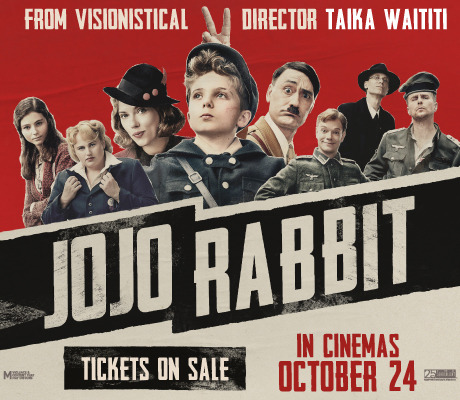
Who says you can't laugh about the Holocaust? Certainly not Taika Waititi.
The Hunt for the Wilderpeople director’s latest film Jojo Rabbit, set in Nazi Germany with a fanatical Hitler youth at its center, is uproarious, funny, and anything but glib. The story follows 10-year-old Jojo Betzler (played by the effortlessly charismatic and magnetic Roman Griffin Davis), who idolizes Adolf Hitler so much that Hitler (played by Waititi) has become his imaginary friend, popping up like a proverbial devil-on-one’s-shoulder during random moments of turmoil to comfort and counsel our budding young Nazi.
Jojo’s dedication to the cause is unwavering. Thanks to some imaginative Nazi propaganda, Jojo is convinced that his purpose is to exterminate Jews, whom he envisions as winged creatures that eat children and hoard anything shiny. Alas, after playing cavalier with a grenade at Hitler youth camp, Jojo suffers an accident that renders him unfit to keep training with the other children, including his best friend Yorki (played by the adorably precocious Archie Yates). He’s promptly sent home, where his angst grows due to being isolated from his Jew-hating peers. To add insult to injury, he discovers that his mother Rosie (Scarlett Johansson) has been hiding a Jewish girl in their home. Outraged and beside himself with indignation, Jojo hatches a plan to get rid of the Jewish girl, seizing it as an opportunity to prove himself as a true Nazi believer to his peers.

Jojo embarks on quite the character arc, and Waititi once again proves that he is a masterful director when it comes to working with children. His ability to elicit the purest, most delightful performances from child actors is amazing (just as he did in Hunt for the Wilderpeople), and the audience swiftly finds themselves endeared to Jojo and the rest of the cast. Performances from everyone were delightful, with Waititi allowing each actor (such as Johansson, Sam Rockwell, and Rebel Wilson) to bring their signature flairs to their characters. While the film is approached mostly as a period piece from an aesthetic standpoint (with costumes, set design, and color palettes largely faithful to the period), Waititi’s deliberate choices in making it anachronistic serve two purposes: to punctuate the satire, and to help make what should be a very sobering subject matter more approachable.
The story, a loose adaptation of the book Caging Skies by Christine Leunens, while quirky and sweet certainly doesn't shy away from the real horrors of the holocaust. It’s a tightrope walk to juggle humor and atrocity, but Waititi makes it seem natural. He also knows precisely how to tug at heartstrings without being melodramatic. Jojo Rabbit’s triumph is ultimately in its ability to treat the topic of ideological extremism with the ridicule it so often deserves while at the same time provoking interesting questions about why people get sucked into blindly following charismatic demagogues, entrenching themselves in hate-filled cults, and spouting toxic ideologies. The best part? Waititi does this with so much thoughtfulness and nuance, all while serving up an entertaining, poignant story.
By the end of Jojo Rabbit, you’re not raising your pitchforks screaming about the injustice of the Holocaust—that would be rather trite. Instead, you’re reminded that humans are complex, multi-dimensional, and capable of both immense kindness and unbridled terror. It’s a celebration of people’s capacity to change their minds. More importantly, it’s a reminder of the beauty of comedy and how laughter can be the best medicine during turbulent times.
(More—including spoilers—under the cut)
What I love most about Jojo Rabbit is the depth of each character and how there’s so much to dissect and unpack for each one. Beginning with Jojo—we learn that not only is his father far away, in danger, fighting somewhere on the frontlines, but that he also lost his older sister Inge. We’re never told in full detail what happened to her, but the main takeaway is that her death, coupled by the absence of Jojo’s father, were tragedies that may have propelled Jojo to seek out the philosophy of the Third Reich. It’s not uncommon for young fanatics to get swept into hate groups when they are at their lowest points. When you’re angry or feeling helpless and lonely, it’s easy to externalize your pain and find someone to blame, whether it’s an entire gender, people of certain ethnicities, or members of a different political party. It’s simpler, you see, instead of owning one’s problems and acknowledging that the world doesn’t revolve around you. By making boogeymen out of people who are easy targets, we assert control over the senseless things that happen in our lives. It’s a way to feel powerful.
When you’re young, there are so many things that are out of your control. You’re caught in this torrent of everyone else’s decisions—your parents, school, your peers, society at large—and you’re looking around, flailing and hyperaware, that you’re living what is supposed to be your life and yet there seems so very little that you have ownership of. That's Jojo’s story. Not only is he caught in the middle of a war, but he’s grappling with some seriously heavy shit: an absentee father, a dead sister, a craving for acceptance from his peer group and, ultimately, a longing for connection that is rooted in positivity rather that hate.
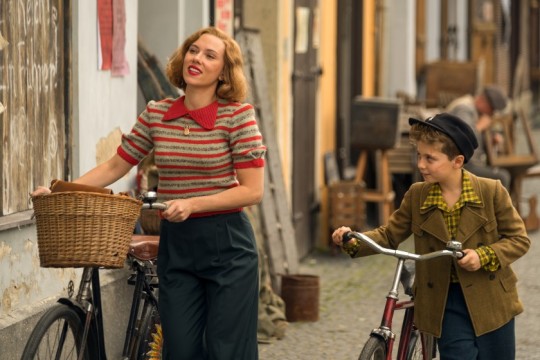
At first that connection seems to be cultivated by his mother, Rosie, who is literally and figuratively the most vibrant character in the film. From her bold, striking fashion sense and rouged lips to her joie de vivre, Rosie is, to quote Mulan, a flower that blooms in adversity. Even during the bleakest of times, she finds ways to uplift her son, whom she can tell is hurting. Her bursts of energy, her ability to find excitement and enthusiasm even in the most mundane of things, her rally to dance in the face of tragedy—all were reminders that dwelling on hatred and sorrow, while easy and sometimes necessary, is a crutch in a balm’s disguise. We must always forge ahead and seek hope when all feels lost, like “staring a tiger in the eyes”, as Rosie would say. That’s why, despite the risks of being caught by the Gestapo, she housed a Jewish girl in her home. In some small way, she was doing her part in the resistance against a hateful movement. While Rosie says she’s never stared a tiger in the eyes, her act of defiance came at great risk to herself, and that’s true courage.
In one of the most heartbreaking scenes in the film, Jojo is wandering the streets when he notices a bright, blue butterfly fluttering against the backdrop of hate-filled propaganda smattered on the city walls. He chases it wistfully and accidentally stumbles on the gallows in the middle of the town square. All the audience sees, hanging from the gallows, is a pair of legs with bright-colored shoes, and our hearts immediately sink. It’s Rosie. Waititi leads up to this shocking moment during a previous scene, while Jojo and Rosie are hanging out by a river. Rosie makes fun of Jojo for still being unable to tie his own shoes. She’s skipping gleefully on top of a concrete wall, with the camera trained low at Jojo’s eye-level, so the audience sees a shot of her shoes as she taps into a merry little dance. Waititi counts on viewers remembering this quiet scene to make what follows truly devastating. The effect is quite heart-stopping, and it’s impossible to want to reach out and give poor Jojo a hug as he cries out and wraps his arms around his dead mother’s feet. It’s then that Waititi makes his message known: Yes, there’s plenty to make light of in the world, but you can do this while also acknowledging that there’s plenty of darkness. It’s an impressive balancing act, and Waititi does it with so much wonderful exuberance and earnestness that it’s tough not to commend.
Viewers notice that the more Jojo focuses on the positive things in his life—his mother, his new Jewish friend Elsa—the less we see of his imaginary friend Hitler. And this is a deliberate choice by Waititi to prove a point: when you are consumed with hate, you’ll want to constantly keep feeding it because it’s comfortable and easy. As humans, we have a biological negative bias that we rely on as a means of survival. The very idea of entropy exists as a reminder that it takes more work to put things in order, to be good, to rise above, than for things to decay and distort and devolve. The more you fill your life with things that bring you joy, fulfillment, and contentment, the less you’ll rely on poisonous literature and toxic people. While this isn't exactly an epiphany for most of us, one may applaud Waititi for the inventive way he delivers this message.
Another delightful character who, on the surface, seemed to be solely there for comedic effect, was Sam Rockwell’s Captain Klenzendorf, who’s tasked with whipping up these little rascals into Nazi-fighting shape. From the very get go, we sense that this man’s commitment to the Nazi cause is entirely for appearances’ sake. From his clandestine romance with his right-hand man (played by Games of Thrones’ Alfie Allen) to his soft spot for Jojo, the audience is led to believe that this man is merely pretending to be a hard-ass because that’s what you were expected to do, else be accused of treason to your nation. One could assume his affection for Jojo had something to do with being able to sympathize with the young boy after Jojo is relegated to doing simple jobs due to his injury (Klenzendorf claims he was benched from the frontlines because of an injury that led to him having a dead eye). But it’s toward the end of the film where we fully realize the totality of his character. In an earlier scene, Jojo is bullied by some older boys into killing a rabbit. They jeer at him as he wrestles with the decision to kill an innocent animal. He’s torn between wanting desperately to ingratiate himself into his peer group and staying true to the part of himself that’s kind, pure, innocent, and staunchly against needless violence. The music builds as we lean forward in our seats waiting to see what Jojo does. He decides on an act of mercy at his own expense, releasing the bunny and yelling at it to flee from danger. Unfortunately, before it has a chance to escape, the bunny is snatched up by one of the older boys, who wrings its neck in front of all the young boys to see.
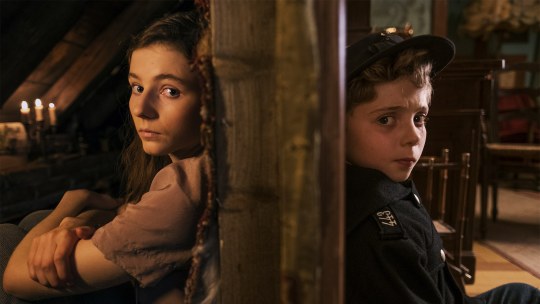
At first this seems like a scene that’s simply supposed to be an obnoxious display of bravado. But Waititi calls back to this scene towards the end of the film twice. Klenzendorf arrives at the Betzler household when it is being searched and ransacked by the Gestapo, who suspect Rosie has been aiding Jews. Jojo is terrified, not just to be discovered as traitors by the Gestapo but for Elsa’s (the Jewish girl they have been hiding who has now become his friend) safety. To get ahead of the situation, Elsa emerges from her hiding place and pretends to be Jojo’s dead sister Inge. When the Gestapo demand her paperwork, she shows them Inge’s old ID card. Klenzendorf immediately intercedes, grabs the ID from her hand and demands that she variate her identity by stating her birthday. Elsa stammers in response. “Correct,” Klenzendorf confirms flatly. The Gestapo consider this acceptable and vacate the premises, none the wiser. We discover immediately that Elsa had actually given the wrong birthdate, and Klenzendorf could have outed her right then, but decided not to. He was helping the bunny escape.
In another scene, when the Allied troops march into Germany and start rounding up all the Nazi soldiers, Jojo (who has a Nazi officer’s jacket on) is mistaken for one of them. He runs into Captain Klenzendorf, who creates a commotion by wrenching the Nazi jacket off of Jojo’s back and pushing him away, telling him to flee while yelling at him for being a dirty Jew so the Allies don’t execute him. It was an act of sacrifice from a man who recognized himself in the young boy. Klenzendorf saw Jojo’s gentleness and purity of heart and knew this kid needed to live. He released the bunny, stared a tiger squarely in the eyes—at the expense of his own life.
Jojo Rabbit, while certainly laugh-out-loud funny and full of amusement, is a moving story about heroism from a group of people who rarely ever get acknowledgment for their acts of bravery. These were Germans who defied their Führer and their Aryan brotherhood at great risk to their own lives. While these acts will never erase the horrors of the Holocaust, it’s a reminder that people are complicated creatures, capable of miraculous acts of mercy and horrific deeds of violence. It implores us to think about how some of the people that get caught up in hate groups are hurting deeply and just looking for something to blame their pain on. It definitely doesn’t excuse their actions or the bile they oftentimes spew, but it merely reminds us that behind every caricature is a human being in pain.
Even if you see Jojo Rabbit and don’t think it’s that deep—you may say “Starr, it’s just a comedy about stupid Nazis, it’s not even a true story”. What is true about it is that we live in a world of grey, and while it may be simpler to put people in buckets of black and white, hero and villain, good and bad, more often than not we are all just hurting in some way. What’s true about it is that we have more in common than we have differences and ultimately, everyone regardless of race, creed, sexual orientation, craves the same thing: freedom; Freedom from the burdens that we carry on our shoulders, from dead loved ones to strife and war. Freedom from the fear of persecution for being who we are. The freedom to wear whatever we want, screw whomever we want, and to dance like no one’s looking.
242 notes
·
View notes
Text
The Mandalorian S2: Style Over Substance – A Companion Piece
This is a companion piece to this video where I examine the strengths and weaknesses of the first two seasons of The Mandalorian. It’s a collection of ideas and evidence that were cut for time or focus reasons from the main video. I’ve included both timestamps and quotes of what section of the video each idea refers to. Under a cut for length.
[1:48] Akira Kurosawa, whose movies would be very important in the western genre was very big on complete and realistic sets and effects because it helps the quality of an actors’ performance.
“The quality of the set influences the quality of the actors' performances. If the plan of a house and the design of the rooms are done properly, the actors can move about in them naturally. If I have to tell an actor, 'Don't think about where this room is in relation to the rest of the house,' that natural ease cannot be achieved. For this reason, I have the sets made exactly like the real thing. It restricts the shooting but encourages that feeling of authenticity." – Akira Kurosawa, Something Like an Autobiography
[2:27] Like the original trilogy, The Mandalorian has its fair share of humor. The sequel trilogy also had a lot of humor, and was criticized for it, but it wasn’t the humor itself that I think people had a problem with, it was how the humor was done. See, in the original trilogy humor never changed or undercut the overall tone of a scene. If a scene is tense humor might lighten or even break the tension but never undercut it. The original trilogy would never, ever, make fun of the plot, character, or scenes in its own movie. The Mandalorian follows this mold of lightening or breaking tension without undercutting the scene itself which also helps it feel like the OT.
Just Writes video on Bathos is a good expansion on this idea. Personally, I find that particular brand of humor, popularized by the Marvel movies, extremely off-putting because it just screams at me to not take the story seriously and that makes it pretty hard for me to stay immersed in it. My three favorite marvel movies are Guardians of the Galaxy, Black Panther, and Thor Ragnarok because Black Panther doesn’t really do that kind of humor and Guardians and Ragnarok manage to make it seem natural by genuinely being comedies.
[7:18] This brings us to Episode 4. Last time I criticized this episode, but I wasn’t very specific, I just mentioned that we were starting to get away from showing and towards telling. Let’s take a closer look.
The first part of this scene, where the kid was being a nuisance, was actually really good. It kind of seemed like it was going to lead into some genuine frustration with him being a nuisance and therefore maybe some drama in their relationship.
[9:51] Cowboy Bebop is another space western with a strong style and a mix of vignettes and episodes which advance a characters story. But every single episode builds up the themes of the overall story even if the plot has nothing to do with it.
To be fair, not every episode builds up *Spike’s* story and themes, but Cowboy Bebop has four main characters and every episode works towards at least one of the characters’ stories, characterization, or relationships.
[12:20] Mando’s mistrust of IG, when they really have quite a lot in common, speaks to something about his character.
What does it speak to exactly? Well, everyone might have their own opinion about that but here’s mine:
IG-11 used to be a hunter, but now Queel has reprogrammed him. Mando still sees the droid as the hunter and is adamant that it can’t be trusted no matter how much Queel insists that Mando must trust his work reprogramming the droid as an extension of trusting Queel himself.
Now, why does Mando hate droids so much, and particularly this droid? Well, that’s an open question, but I have my theories. Part of it is the trauma he experienced when he was young, but I think it runs deeper than that. You know how sometimes the traits that really bother you the most in other people are the things that you don’t like about yourself? The IG-11 that Mando met is a lot like the part of Mando that I’ve been calling “The Professional.” IG is efficient and ruthless, just like Mando on a job. They are deaf to moral and personal appeals in the face of a contract. This is also the part of Mando that took the kid to the Imperials in the first place, the part that he conquered and redeemed by the end of the third episode.
But IG has been reprogrammed. Just like Mando, he has changed and now cares for the child over himself. IG even develops a personality, and at one point attempts to tell a joke. But because IG reminds Mando so much of that part of him he had to defeat, he can’t bring himself to trust him. The tension between them persists pretty much up until IG fully demonstrates to Mando that he is there both to care for the child, and for Mando. In this moment Mando begins to really see how similar they are.
This connection makes it hard for him to let IG make his sacrifice, and he even appeals to this by telling IG that he thought his old core functionality was gone. But by reactivating his old functionality as a part of his new core function, IG is also giving Mando a template to incorporate his Professional self into his new self. He shows Mando that those two halves of his self that came into conflict back in the beginning can be synthesized into one new whole. He doesn’t need to reject any part of his identity.
Then the newly synthesized Mando dons his jetpack, fulfilling his only stated desire in the entire season, and defeats a scenery chewing villain to win the day.
But that’s just my interpretation, and I’m willing to haggle over what exact interpretation the evidence best supports.
[15:29] Speaking of Luke, let’s talk about fanservice. Now to be clear, there’s nothing intrinsically wrong with fanservice, what matters is what always matters: how you use it.
This also applies to the other two “Trademarked Star Wars Problems” I mentioned in the last video: repetitiveness and hamfisted merchandizing. These things are not necessarily bad. For example:
I would bet Baby Yoda is the most successfully merchandized product since the OT, but there’s nothing wrong with that because they’re part of the story being told. Baby Yoda doesn’t distract from the story, they are part of the story. On the other hand you have Ewoks, which were originally going to be Wookies. I would bet they went with Ewoks at least in part to sell more cute toys…but at least they still sort of work with the story. In TLJ the penguin things are there for no other reason than to be cute and sell toys. Same with the crystal dog. They have literally no purpose in the story, and their obvious and prominent inclusion only to sell toys distracts from my immersion.
Obviously repetition is part of stories. That’s why we have tropes, and the Hero’s journey, as tools for a writer to communicate information quickly. Just from his outfit we know a lot about Han before he ever opens his mouth, same with Obi-Wan. In RotJ, the heroes need to blow up the Death Star again. It’s kind of annoying that we’re literally doing the same thing we did two movies ago, but at least it’s a little different. In TFA Han Solo reassures us that the Starkiller Base isn’t that big of a deal by saying “don’t worry, there’s always a way to blow it up.” This is an example of a character reaching out from the script and telling the writer to change their story because the repetition is getting ridiculous.
[18:32] So…why is it here? Yeah, I know who Thrawn is. I don’t know why Ahsoka does, or why she cares, or why I should care. If the writer had cared about that they would have made her talk to Mando about it so she could give some sort of story or character-based explanation for why she cares, instead of just dramatically saying his name.
I mean I know the most likely reason it was here: to build hype for her solo show, but they could have done that without punching my immersion in the kidney.
[20:20] So it was no surprise that in the end the Expanded Universe’s greatest hit of all piloted his X-Wing into the show. But, I didn’t mind this. They had been seeding that a Jedi would be coming to collect Groghu for a while now, and if you had been running through the timeline in your head you were probably at least half expecting this. It’s foreshadowed well, it’s part of the story, and it triggers our emotional climax.
The reveal is quite well done too. First it’s an X-Wing, then we see a Jedi dressed in Luke’s RoTJ gear but it’s over the security cameras so there’s no color, then we see it’s a green lightsaber, then they clearly show that it’s Luke’s lightsaber hilt, then they finally have him peel his hood back. Each small reveal builds up the suspicion in your mind that it’s Luke until it’s confirmed.
That being said I would totally understand if someone thought it was obnoxious and hamfisted to shove Luke into another story, even though it did work for me.
[29:12] Parts of it even connect back to Mando’s story and character, though not in a new way because it’s mostly a redo of Mando’s relationship with IG last season.
I understand that Mando breaks his rules a little bit more here, but it’s still a riff on the same theme of: Mando has a conflict with a character, the he sees the similarities between between them, and then circumstances force Mando to take his helmet off in front of the character.
However if his arc with the other Mandalorians was functioning properly than this could work as a synthesis of a change in ideology and a reassertion of his willingness to bend the rules, but instead it just comes across as another redo of stuff in the last season. It’s still halfway functional because by this point it’s easy to forget that Mando had a character arc last season and it reminds us of that right before they pull the trigger on his and Groghu’s separation…but redoing the development from last season doesn’t count as a real character arc.
[31:08] There is so much more I could say about all of the bad writing, plotting, and characterization in this season. There are so many things that just don’t make sense, waste our time, or just plain don’t work.
I’m still confused over what the writer was trying to do with the snow planet. Like they crash land there and Mando decides to go to sleep inside his hull-breached freezing ship and the fish chick is like “Mando this is dumb you should fix your ship” and then he just fixes it. What was even the point of handing Mando the Idiot Ball there? Why not just have him fix the ship without trying to commit suicide by hypothermia first? Like…what?
[31:27] Why are you just listing off a bunch of names that mean nothing to us like she’s a video game character telling us where we need to go next?
I want to point out that even though I’m using this footage of Delphine as a reference she’s actually managing to tell you something about Malborn and why he is trustworthy, so it’s actually better than what Bo is doing. Though to be fair the tidbit about “the forest planet” is cute since it will be a deforested planet when we show up, that line needed some character connection to not sound so weird.
[33:13] That’s what the point of Show Don’t Tell *really* is, it’s not about how much dialogue you use or whether a character is explaining something. It’s about using exposition to tell us something about a character at the same time. It’s about putting the camera in a place that shows us something about the character or the action, not just what’s happening. It’s about packing as much of the story as possible into every choice you make.
In Avatar, the way that Zhao tells us about Zuko’s banishment tells us a lot about both Zhao and Zuko. The camera angle here emphasizes Katara standing encouragingly over Aang’s back as he stares dejectedly at the ground (contrasted with Toph’s angry stare) and tells us about the nature of Katara’s relationship to Aang as his teacher and friend as opposed to Toph’s. In the opening shot of A New Hope, the low angle of the camera implies dominance and the length of the Star Destroyer shows us the long reach of the Empire. Every single time Zuko is on screen it is worth paying attention to which side of his face is dominating the shot: scarred or unscarred. Exactly what each side represents is up for debate: I tend to think of it not as good Zuko vs. bad Zuko but more as Zuko’s feelings of obligation to his family and people and Zuko’s obligations to his own sense of what he believes is right and what he needs to self-actualize.
Show Don’t Tell is just a saying. It’s a saying to encourage writers, particularly new or inexperienced ones, to focus on the *art* of telling the story instead of focusing solely on the plot and facts. I am using it somewhat liberally here to say it’s about “using exposition to tell us something about a character at the same time” but since that is about the art of telling stories, and not just a recitation of facts, it does technically count.
[34:32] With television shows and the way they can go on forever, and with how much money there is in going on forever, it seems like they always become a sagging mess at some point. Some of them manage to bring the quality back, but some of them don’t. So to a certain extent, these problems with the Mandalorian are kind of normal for television shows.
I can’t remember exactly where I stopped watching How I Met Your Mother, the last thing I remember is Ted dating some crazy girl and swearing off relationships. I abandoned The Expanse midway through season 2 earlier this year…maybe I’ll go back but boy was I bored. I made it all the way through the Wire. Season 2 had its problems but eventually got back on the right foot midway through or so, but the problems came roaring back in season 5 which it took me almost a year to finish because it was so agonizing.
Avatar is probably the most controversial choice here of a show in which the quality slipped but I firmly believe that if they cut out the second half of season 2 and the first half of season 3 the show would have been much, much better. Most everything in Ba Sing Se is tonally weird and the whole idea of a city with too many rules and bureaucracy is way too complex an idea for this show to tackle. Avatar does tackle incredibly complicated and adult themes for a kids show but in my view this was one step too far. They get Zuko to a place where he’s ready to join the Aang Gang but then have him backslide temporarily. There’s this whole idea of an invasion on the Day of the Black Sun but it would be such a story cheat to allow Aang to beat the Firelord without actually mastering the four elements and so obviously isn’t going to work. All of these things together just make it feel like wheel spinning where the story and characters aren’t actually growing or developing but just being padded out.
Except for “The Tales of Ba Sing Se” and “Appa’s Lost Days” obviously, those are great.
It’s actually pretty funny because the episode before Aang is supposed to fight the Firelord the first time (the Black Sun time) he’s a nervous wreck and everyone is trying out different psychological techniques to try and make him feel better which is…I guess sort of valuable for kids to see that nervousness is normal. But when you compare it to the second time he’s going to fight the Firelord, for real, it’s *so obviously* for real this time because Aang is having a *character* based crisis about the conflict between his pacifism and his duty to stop the Firelord. The comparison of the two is telling in terms of what was going on in the story of each.
[35:03] Now they are spinning it out into not one, not two, not three, but FOUR different shows all based on the Mandalorian. It’s almost gross how hard they are milking this.
Okay apparently they fired Gina Carano so I guess it’s not four anymore. Or maybe it is who knows. Listen, the point is they *intended* to make four shows okay.
[35:06] Thanks for watching all the way through to the end. These videos take a ton of time and effort so that means a lot. Even though I’ve reset my subscriber count to zero now that I’ve criticized the Mandalorian, I will continue to work on the channel as much as I can, so subscribe if you want to see more videos like this.
I promise to always give you my honest opinion.
Also I know I was shooting for one video a month and, well, I still am but these videos are really time-consuming. I want to make sure I maintain a really high level of quality and so sometimes I get halfway through a video, realize it’s no good and have to start over with something else. Sometimes it takes months of rewrites to get it to a place where I’m happy with it. This one came out pretty quickly, it was about 6 weeks from when I started the script to when I uploaded. Hopefully I’ll only get better and more efficient at it as I get more practice.
2 notes
·
View notes
Text
But Whose Deontology?
The Untamed: three-fifths mark
OK, @thearrogantemu I finally had a chance to look at a non-work screen for long enough to watch some more Untamed; through episode 30 now! Oh boy. Spoilers for anyone who isn’t this far yet below the cut:
I feel like this show didn’t exactly *hide* that it was interested in poking holes in everyone’s moral system, but it did spend a lot of time... not distracting us, really, but using the other assorted comical, tender, and otherwise emotional aspects of the show to deepen our investment in these characters’ lives and choices before it started really making its moves. I suspect it wouldn’t have had the same effect otherwise.
The long run up is a pacing I’m quite the fan of from almost three decades of JRPGs that start out as light-hearted adventures about teenage angst only to turn into philosophical ruminations on God and the nature of the universe (see my favorite example: Xenogears). Even The Lord of the Rings does something... similar, albeit not intentionally on the part of the author. It’s actually one of my favorite “tropes” in storytelling: the tone shift—the moment the light-hearted and comfortingly simple reveals itself to be something much wider and deeper and which will leave you unsettled in its wake.(1)
I’m really quite impressed with Xiao Zhan and Wang Yibo. Xiao Zhan manages to believably play the process of aging from arrogant and ornery but innocent and lovable “student” in Cloud Recesses, to the (still arrogant and ornery but lovable) rebellious “hero” during the Wen indoctrination, to the (still arrogant but lovable) young man forced to grow up too fast when his adoptive parents are killed, to the Master of Demonic Cultivation and head of The World’s Most Wholesome Farming Co-op (why cultivate only demons when you can cultivate turnips, too!?).(2) And he manages to play it all as believably the same character, always deeply expressive but also somehow... authentic... even when he is putting on a show: his play-acted irresponsible argumentativeness with Wen Qing; his self-infantilization whenever he wants Yanli to mother him. The latter would be laughable if we were to take it as entirely straight-faced—he knows he is playing childish, and he knows that she knows, even if he does legitimately want to be mothered. Jiang Cheng on the other hand seems to never handle the reality of Wei Wuxian as well as Wei Wuxian handles the reality of Jiang Cheng...
I understand there was some criticism of Yibo’s perceived lack of expressiveness when the show first came out, but I think he’s doing a fantastic job portraying a deeply stoic character whose emotional turmoil is buried under mountains of learned and self-enforced composure. It’s not like he’s missing beats; he’s responding, it’s just subtle. He’s responsible for two of my favorite moments so far: when he first smiles ever so slightly when he sees the lantern Wuxian has made him with the rabbit drawing(3) and the scene of him kneeling in the snow as punishment. I don’t know if it’s the lighting or the fact that it’s one of the few times he’s not carrying tension in his eyebrows, but he looks SO YOUNG in that shot. Honestly, he looks more AT PEACE in that shot than I think he does at almost any other time in the show so far. It feels to me like, in that moment, he has no regrets either about what he did nor about the fact that he should have to atone for it. Like he has internalized some sense that both things are right and can exist in tension. The weird effect of this growth next to Wei Wuxian’s feels like watching one of the two grow older (Wuxian) while the other grows younger (Wangji).
Now, I’m a sucker for every last story where two highly disparate-seeming people move from from some variation of dislike (either on the part of one or both) to friendship to, sometimes, something more (no, no BL here, none at all *looks the other way*). Certainly Wei Wuxian and Lan Wangji have very different personalities. Wei Wuxian has little regard for rules, authority, tradition, taboos, or social etiquette: he uses Lan Wangji’s ming(4) almost as soon as he meets him! The way he interacts with objects and spaces (and personal space!) shows his lack of reverence/respect for the people and things others expect him to have reverence for. He has no problem questioning what everyone else seems to see as obvious up to the point of outright suggesting the use of dark magic. Because...well, why not?? Because “they said so?”
It’s not that he doesn’t KNOW the rules. Another of my absolute favorite moments is during the Wen indoctrination when Wei Wuxian starts reciting not the Wen clan principles, but the Lan clan principles! Sure, he lacks the expected respect for sources of authority be they personal or ideological, but that doesn’t mean he doesn’t KNOW them. He’s obviously naturally talented, gifted, a fast learner, curious, but also—and crucially—he has a very strong moral compass! He does not tolerate bullies, especially when they turn their attention to the vulnerable, like Wen Chao.(5) Yanli notes that their father always favors those with moral integrity and who does he favor? Wei Wuxian.
And this is where he and Lan Wangji are more alike than Wangji initially thinks, and why I love that moment, just after they release the lanterns, when you see, just for a second, the surprise on his face at the content of Wei Wuxian’s prayer: that he always be able to “stand with justice and live with no regrets.” It is, I imagine, the moment when it really hits Wangji that this rebel he finds himself irrationally attracted to truly is *good* despite the fact that he shows no outward signs of respecting the same sources of moral authority Wangji does.
So what is the main difference? Where the rules come from. Who makes the rules? Both of them are pretty sure they know.
Lan Wangji gets his moment to present his source just after their rooftop duel when he catches Wei Wuxian drinking: the Lan Clan principles chiseled right into stone. All 3000 of them. Interestingly, even though Wei Wuxian can and does memorize the code and seems perfectly happy with the notion of moral principles in general, I’ll wager a guess that he is confused by the very idea that a moral code would be so strict and unchanging and inflexible that it could be chiseled into stone *in the first place* or that it would *need to be memorized*. Surely you’d just...”know?” Besides, morality is too contextual to treat this way surely?
As a CLH (Confirmed Lifelong Heretic) my sympathies admittedly lie more with Wei Wuxian than Lan Wangji. It’s not that traditional codes of ethics and conduct are bad things. These are the things that provide stability across entire cultures and peoples. If they’re written in stone, at least that means they’re something everyone has a greater chance of pointing to and agreeing on.(7) And just as Lan Wangji has to learn that there are moral codes that aren’t written in stone and that individual minds can have very clear senses of right and wrong outside of group structures, Wei Wuxian has to learn to temper his arrogance—that his actions, for however right he *thinks* they are, can and do have consequences he would not intend for those he loves, as when he stops himself from calling to Wangji during the hunt. I have a feeling he’s going to be learning more...
Then there’s that whole conversation from ep. 29 as Lan Wangji prepares to leave the burial mounds which is just full of whammies (set, naturally, against the exceedingly domestic reality of the community as a whole and their exceedingly sweet interactions with a-Yuan). Wei Wuxian says: “But let yourself be the judge of what is right and what is wrong, leave others’ comments aside, and care little about gain and loss. What I should do. I know it very well. I believe that I’ll be able to control it well.” And then there’s that moment where you can actually feel Lan Wangji’s heart drop into the pit of his stomach as he presses his eyes closed.
This is the reverse of the moment when Wangji directed Wuxian’s attention to the list of Lan clan principles, so solid they are written in stone.(8)
Then there is that wonderful bit about their respective paths—Lan Wangji’s path vs. Wei Wuxian’s path: the wide avenue vs the one-log bridge. I assume this is a literal translation of the Mandarin. Is it an idiom? If so, I may mangle its meaning terribly and for that I am sorry. But it seems to me that a wide avenue is safe, easy, populated; a single-log bridge is comparatively dangerous and only one person can walk it. Which seems a pretty good metaphor for the differences in whose rule-book each of the leads chooses. Not to mention, with my Western ears, it sounds a WHOLE lot like a “straight and narrow path.” Interesting then, that it is The Master of Demonic Cultivation who is choosing it, while Lan Wangji—with his brightness and discipline and clarity—is following the “easy” way.
So, there it is: whose deontology is the right one? How do you choose?
It’s the epistemological aspect of the question of ethics that Newbigin gets right in that quote I posted the other day. Honestly, I disagree with a great deal (like, a lot) of what Newbigin says in that book, and I think he spends far too much time running himself in ever tighter Calvinist circles, (not to mention I have little interest in missiology and am highly skeptical of evangelism). But! I appreciate that he does, at least, recognize the danger of believing we have insulated ourselves completely from uncertainty or of expecting that certainty is even a thing possible to achieve.
But where do we choose to anchor our axioms? And why? Whose deontology is the right deontology? The rules written on parchment and stone? Or the rules written on our souls? Remembering, of course, that both are fallible. 16 years in the future, will the two leads have changed their minds at all?
And now with any luck, I’ll have a free weekend in which to watch the last 20 episodes, assuming no one wants me to do adult things like house cleaning or completing design projects people are paying me for.(10)
Like how Tolkien switches register from the low and comedic to the high and romantic but you’re fully aware it’s all really part of the same story and suddenly, bam!, you recognize that those aspects of life are somehow not able to be disentangled.
OMG is this an intentional play on “cultivation”? Sometimes I can’t tell what might be getting lost in translation, and I’m certainly too ignorant of Chinese culture, mythology, and folklore to really appreciate everything happening in this show, not least of which due to the language barrier.
He is, interestingly, far more moved by it than the drawing Wuxian does of *him* two episodes beforehand—is this merely the result of the progression of their relationship? This is post-cold springs after all.
That took some research to understand!
The main “vulnerable” character that he never seems to swoop in to save is Meng Yao and I wonder if it’s because he can sense something “off” about him. I felt bad for Meng Yao at first but he always put me on edge. Honestly, is there anyone who trusts Meng Yao as far as they can throw him? *looks at Elrond* OK, anyone except Elrond?(6)
Honestly, before I started watching this I saw that one of the characters was being referred to as Elrond and I wondered, going into it, if I’d know which character it was, and then Lan Xichen walked in and I was like “oh, yeah, obviously!” Seriously, what is it about him? Is it his physical appearance? The way he holds himself? His outfit? His pattern of speaking? How is this person so obviously coded “Elrond?”
Except they don’t really. That’s never how it works.
And interestingly, when looking at his name: “Wei Ying, Ying is his 名, meaning, baby; Wuxian is his 字, it comes from an ancient prose “喜乐无羡赏,忿怒无羡刑”, which means when you’re delighted don’t reward without restraint, when you’re angry don’t punish without restraint. Wuxian here means exercise your power reasonably.”(9)
The richness of the world in this show really appeals to me as does the carefully choreographed costume design, productions design, and cinematography (seriously, everyone needs to dress like this all the time; end of story; I have spoken). There have been some amazing shots that I can only assume are drone footage that have been ADRed?
20 years in and adulthood still sucks. 0 of 5 stars. Would not recommend.
#the untamed#mo dao zu shi#grandmaster of demonic cultivation#mzds#tolkien#yes tolkien gets a namedrop too#he's like the linchpin of my brain
49 notes
·
View notes
Text
Acknowledgment of Contradiction And The Use of Character Foils - The Eighth Genius
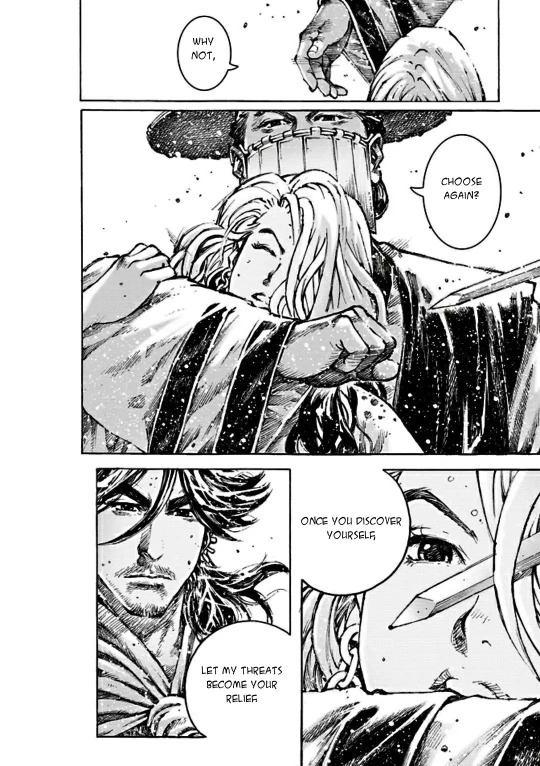
Note: that this analysis will also involve speculations to nail the point that it is centered on the character introduction and that this analysis also includes the opinions of not only me but other members of the community as well.
The first things first, let’s start with the definition of the terms that will be a subject matter in this text.
By nature, contradictions are the details that by themselves prove the wrong of a system that they inhabit, thus efforts are made to avoid them like a plague, as it is strongly believed that any combination of statements, ideas or features will crumble if it consists the inconsistent details – it is considered as an antonym of “confirmation” for a reason. They also tend to make perfect counter-arguments.
Ravages of Time argues that not only everything is consistent, but also from the point of view of the ones that are trying to assert the ideas, said ideas can be built on contradictions, can consist of contradictions, and said contradictions could be used to secure the system. It is still better to hide that fact from the masses to avoid the confusion
(Strangely enough, inconsistencies within the writing of RoT actually enhance its consistency)
A foil of a character, on the other hand, is a tool of the story-telling. It is certainly similar to the “contrast” in artworks, as it is supposed to highlight character trait by placing it near the opposite character train – common usage is the calm and pragmatic sidekick next to the hotheaded protagonist.
In idea, every character can foil any character in the story, so the key part of foiling is the interactions of the concrete personalities. In this analysis, I will explain as to how Ravages’ manages to connect the threads indirectly, through the organic mirroring of the circumstances and affiliations.
Let’s get started.
From the perspective of the governorship or leadership in general, “contradiction” and it’s acknowledgment was always one of the fundamental parts of The Ravages of Time – be it either Cao Cao’s campaign with the image of corruption, which was motivated by greed, for the greater good or selfless selfishness of Sun clan that was aimed at the fundament of the corruption that is the Han dynasty (ironically, against their contradictions) or Liu Bei’s fake image of a saint or even assassin Liu Da who seeks the comforting life through the court by going against himself to the point of forgetting it – everything is chained to the rulership, because that’s exactly what affects everything else.
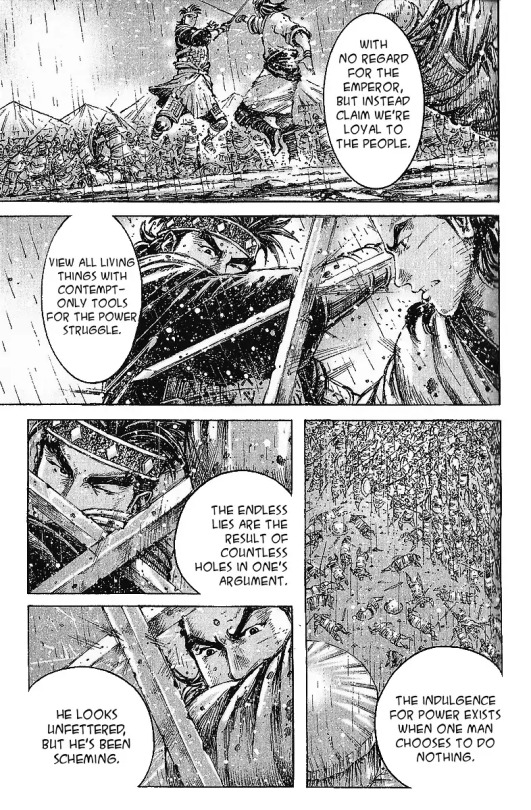
Full embracement of this exact idea – considering how coherent and varied it is with many sides, even when it comes to religion and politicians *cough* LOGH *cough* – is what allowed RoT to stand out among any other war and political drama. And despite the dense story-telling that spans more than 500 chapters, its brilliance is still being polished by not only showcasing the usefulness of this theme, but also the criticism through its shortcoming, which results in the cycle of never-endlessness (and, arguably, the placement of RoT above any competitor, but that’s but a mere meta-talk):
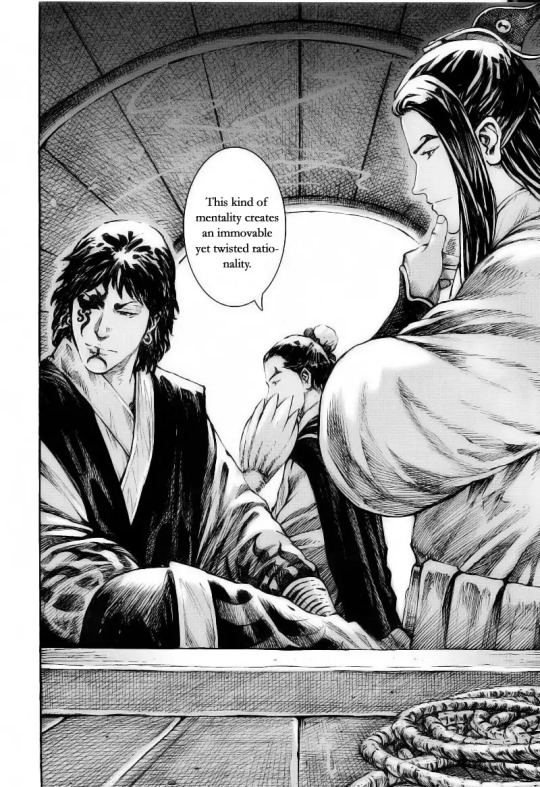
there's the floating text in 372 that appears to praise the down-to-earth approach (associated with Guo Jia) of seeing humans as being more crow-like (with its positive and negative connotations, both nurturing toward their own and vicious toward targets) rather than dragon-like (with associated images of nobility and grandeur), offering the suggestion that perhaps the thing about humans is that they aspire so much (and as it's insinuated, cause so much trouble in the process) without realizing their station and limits and how such ambition and greed are nonetheless part of how they are in the world
now it's not made completely clear how this monologue is connected to Guo Jia's stances, but perhaps one way to establish the link would be to assume that if Guo Jia doesn't have a lofty view of humans, he could embrace the path of ruthlessly carrying out the reforms one insists on (never mind if others accept them or see them as virtuous), hoping for the best that perhaps at the end of the day things could work out (and someone could pick up the pieces the morning after once he's gone and this is where Xun Yu is supposed to come in, the comfort after the chaos)
what Zhuge Liang takes exception to is the notion that the comparison of humans to crows (even if it's a useful corrective to the boastful comparison of humans to dragons) somehow justifies the brutality of the process of pacification... thus the counter retort that people are people, crows are crows (of course this too assumes that Zhuge Liang knows better about what it means to be human)
and this brings us to the 'immovable and twisted rationality' that Zhuge Liang decries (even if he concedes that some sort of peace that is to say the peace of a pacified population desperate for anyone to impose clear order and guarantee safety can be founded on ruthless subjugation as historically attested in the rise of empires and regimes)
Guo Jia (and by extension, Jia Xu and Sima Yi and others like them) wouldn't mind exploiting and perpetuating that rationality so long as there is a convenient path to quelling the unrest (which they see partly as a result of greed and ambition that form part of the human condition) and putting in place some sort of reform to help manage the chaos
on the other hand, Zhuge Liang still believes that humans can be guided and governed by virtue, that loyalty discourse can be used not simply as a cynical method to prop up the ruling order, but as a moral principle that prevents needless bloodshed (yet he finds himself in the compromised position of having to wage bloody crusades but under a righteous banner)
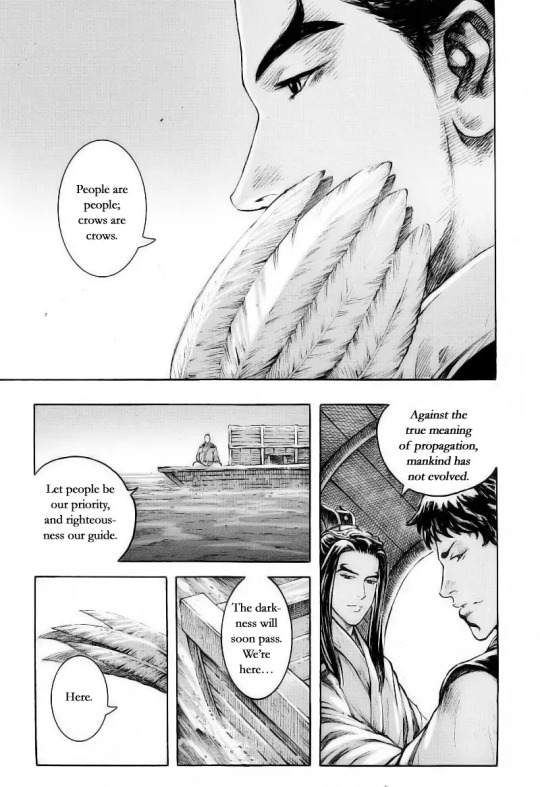
This basically serves as a set-up to what will RoT shift into and who will be the main actor of the following arc. So, in the same way as Zhuge serving as a foil to Guo Jia, the Eighth Genius is being introduced in his arc and the Eighth will even get focused in the following arc. In the Red Cliff arc Eighth did exactly what Zhuge was doing prior to active participation – judging the conflict and “reporting the weather” – and yet he fails to predict the seventh (well, at least, he waited longer). This dynamic will be further established at the end of the Four Commanderies arc and as of now, we need to completely dissect 8th’s introduction, to have a deeper understanding of what will their discord stand for. All in all, each and every sentence uttered by his mouth is quite worth the attention.
at this point, Zhuge Liang outweighs the 8th in terms of reputation and narrative placement (not to mention that throughout the series, Zhuge Liang has been the one guy most in touch with the rest of his classmates on the sidelines and the one guy the other classmates either admire or dread or want to compete against), though the 8th's status as a shadow counterpart to Liaoyuan Huo (because of the Zhao Yun angle) makes him parallel Zhuge Liang (who in turn serves as the mirror collaborator/nemesis to Sima Yi) in one respect in that both have strange ties to the eponymous duo of Ravages
in addition, the 8th parallels Sima Min (in being the last and shadiest on the list of 8 illustrious names) and possibly the 8th eccentric (assuming this member shows up and fits the pattern), and in terms of outlook he can be compared to Yuan Fang
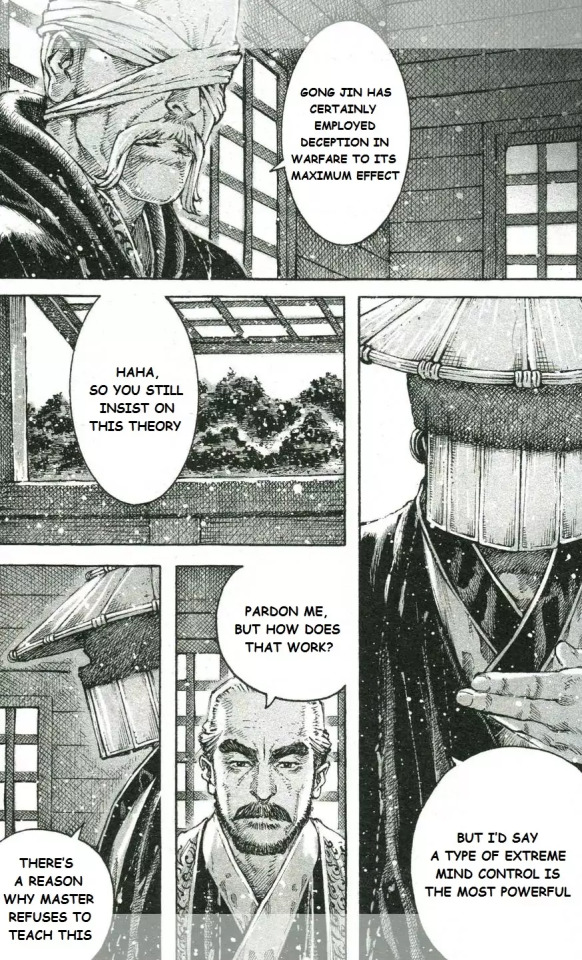
Another thing that we need to pay attention to in the Red Cliff arc, though, is Eighth’s interest in mind control (as we know, character introductions In RoT reveal a lot about the characters) – as Water Mirror says, to subdue the enemy without a fight is the strongest method of war, but the eighth insists that the method, that the evil cultists are so infamous for, is actually the most productive one (probably because avoiding the war merely keeps the people safe, but is not satisfying – it is not doing anything to enhance the condition of them, as it won’t save people from themselves), but even if one won’t give in to the temptation and derail from the bright path, these techniques are leaving everlasting negative effects on person’s mind.
So, if we were to speculate, the most likely theory is that the Eighth learned said methods, which ties to another theory of him being the renowned scholar named Zhang Song (that being said, I'd rather see Zhang Song as another character altogether (whether the 8th takes that alias later on or just cooperates with him/them since I'd rather see duplicated names than merged characters)), but let’s talk about later on.
But… why and when did he betray the expectations of his teacher? The first one is rather easy to guess. It is about his ideology of individualism – instead of waging meaningless wars with tons of unrecorded blood being spilled, which would also limit everyone else’s desires and freedom (represented by Fang-er), that comes from the natural craving to the anarchy of human nature, whenever it is caged in order, why not exploit and weaponized and control vices and viciousness of a person? Instead of forming a collective mindset, why not try to understand the mind of every single individual? Instead of relying on brainwashing through moral propaganda, why not have faith in inherent human selfishness?
Him being an assassin resonates to this idea very well, because he is doing everything on his own and is not commanding a mere group, collection of people. He is doing things alongside them, understands them, and is, in fact, closer to reality than other classmates. Sure, Zhuge, too, understands the nature of his surroundings, but he is still a man of principles and his viewpoint is stuck on that – growing colder to actually personal human interactions and yet he is the one who values a human life the most (this mirror’s to 8th’s apathy, despite him acknowledging the personal desires in an individual)
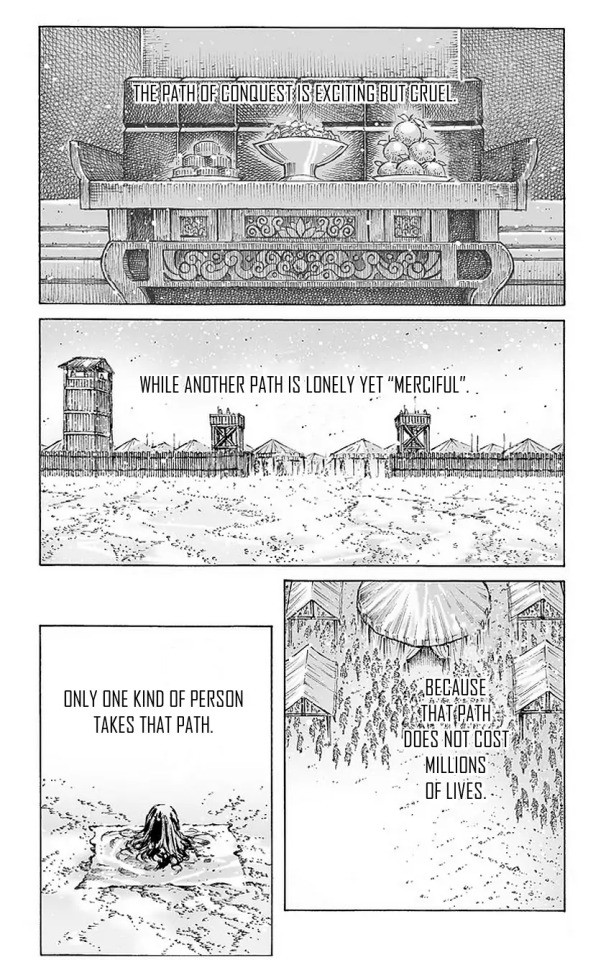
To be fair, he is more of an assassin than any other character with the same profession in this story, because he actually lacks identity as nobody knows who he is if he won’t reveal everything by himself and, funnily enough, he is free to hide his identity even if he were to choose a warlord (also, he does not really HAVE TO be devoted to any of them and choose as many he wants to choose for the sake of his plans, which would mirror 7th’s “devotion until death”) and he could attach to himself whichever identity he wishes. Lack of identity was fatal in the hands of Sun clan and lethal in the hands of Sima Yi, whereas they still had some kind of connections, so now imagine how peculiarly promising is 8th’s potential, who does not seem to have any attachments.

I may as well rightfully declare that his lack of identity has a gargantuan perk to counter the cynicism of history – Whatever he does will be judged by future generation’s own assessments, yes, but if 8th’s real identity remains unknown, no one will know to whom they are supposed to connect all of his actions that he committed with the identity of others, hence the perpetual inaccuracy of historical records. Akin to Yuan Fang, who is an original character of Ravages of Time (the difference being, that if Yuan Fang has an original identity, 8th can “grab” identities of actual historical figures and get away with it)
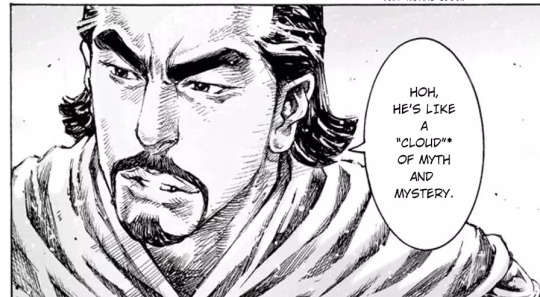
As the last student, of course, the similarity with the first student Yuan Fang (well, his “lord” was chosen instead of him, by being a son of Yuan Shao – that selfish romantic really had no chance to CHOOSE to live for himself with his loved one, huh?) is apparent. Aside of the fact that Fang was connected to the cultist, he was also trying to practice the art of survival, (which he did not manage to perfect, thanks to his daddy) and even being able to kill people by his own hands (as much of a prodigy as he is). But ironically, (which can also be considered as a contradiction) the simplest desires are the root for the grandest ambitions and at the end of the day, Fang proves this point of 8th that self-serving desires may even seduce someone to achieve grand visions, he is delving into the corruption, rather than taking care of “his” people individually. And, after all, 8th does not really resemble to romantics.
Well, it won’t be fair if I do not mention that Zhuge (by torturing people) and Zhou Yu (by being a sparring partner of Sun Ce)… and even Xun Yu (by slapping a wolfneck)… are more than capable of doing some things by their own hands.
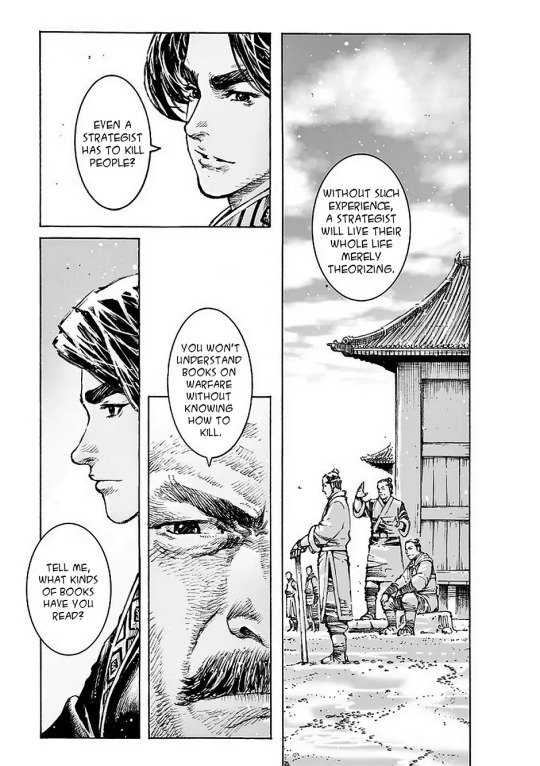
So far we can feel free to say, that 8th is not being seduced by desires (take a shot every time the eighth contradicts himself and yet never stops making sense) and he is a quite unemotional human being, considering that after the death of his oath brother he did not really look affected, remained perfectly calm and rational – basically took a duel out of respect and Yun’s lack of stamina. You could argue that he had his mask on, so it would have been hard to notice his emotions, but he instantly gave orders of retreat after the death of “the lord” and it was also implied that he does not really connect well with others.
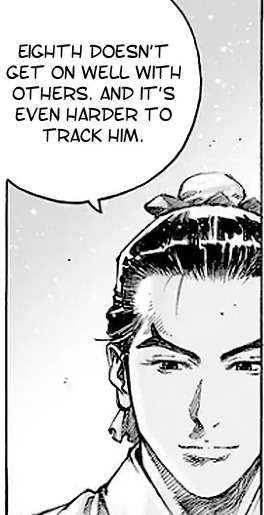
He wears the mask of a caring person, while Yun wears a mask of an uncaring person.
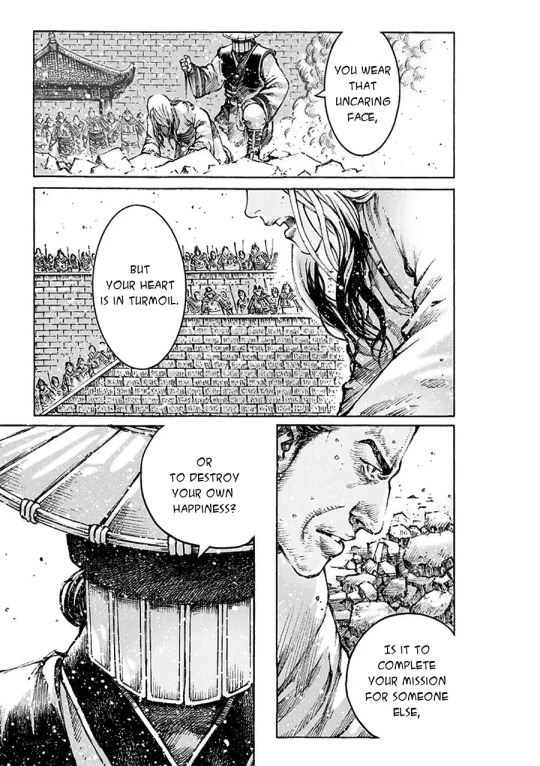
(Honorable mention of his ability to rapidly adapt to the situation – which should be coming naturally to a person who is a good judge of double meanings (pointed out by his hand signal first and then by “he discovered the secret of various books in the world”)
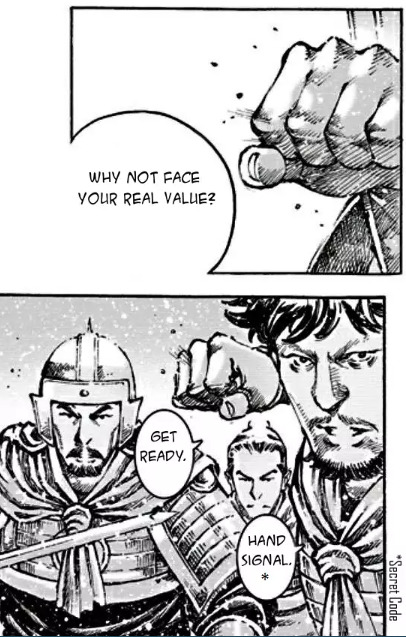
It is quite fascinating to see such a person to be aware of everything and be appealing. In some mediocre stories, he would have been extremely childish and overdramatized at it, lacking any kind of human decency. On the contrary, 8th respects his enemies, is quite affable, acknowledges the contradictions within the human nature and acts according to it, and does good deeds for others (“repair your shed”), even if not unconditionally – as he is a morally grey character, and not ham-fisted at that.
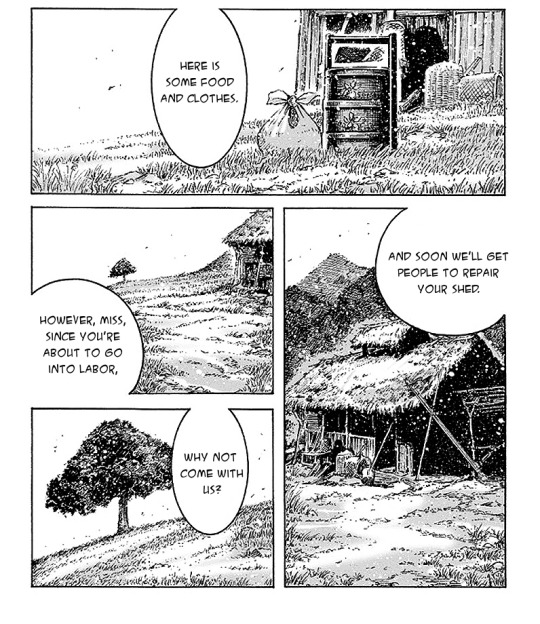
This brings us to another philosophical part of his views – the value. “Feel helpless all you want, it won’t do anything for you”, every individual has their own, but to attain said value they first need to realize what their defining uniqueness is by themselves, instead of relying on either someone else or heavens and then act on it, make use of it. They must make a choice whether they will be “childbearing” tools or… weapons. To me his reaction (or lack of thereof) to this line of his oath brother “undertake its duties when called to the office; retire otherwise” felt like he (oath brother) completely lost the value in his (8th) eyes, by not only being enslaved to the whore for naught all these years, but also clinging to the brother (when he could have just let the woman infiltrate Shu). This page here can also be easily interpreted as if someone should trade their own valuable people, but it can also mean that people should see the value in whatever they have, whether they be items or loved ones, and cherish them.
So, in short, you do not need to imagine yourself (self-delusion) as a god-emperor to give yourself the value and be content to live.
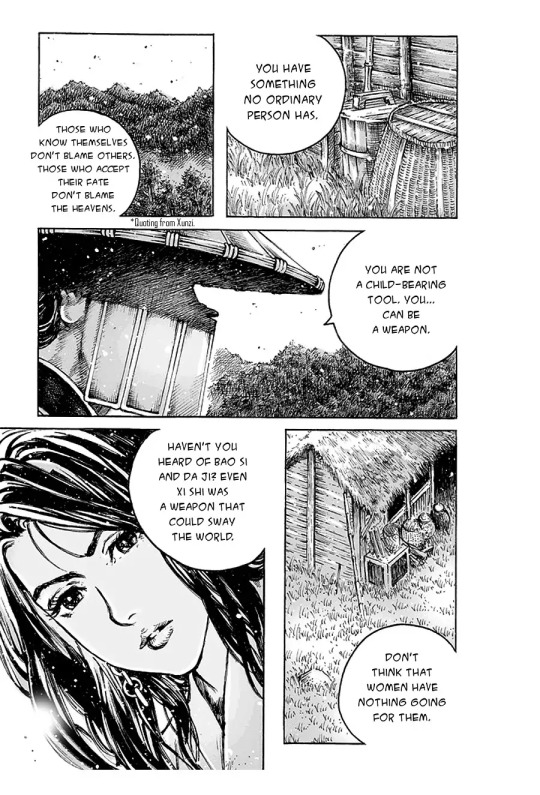
Above we discussed how 8th is encouraging and guiding others towards seeking the value in themselves, but that is not quite all, is it now. Sure, you find value in yourself and the people around you, but the said value needs to be defined by something. To apply 8th’s standards, the more benefit is from someone, the more is his or her value. And even if she was merely being traded for a lovesick man, she still had some value in her.
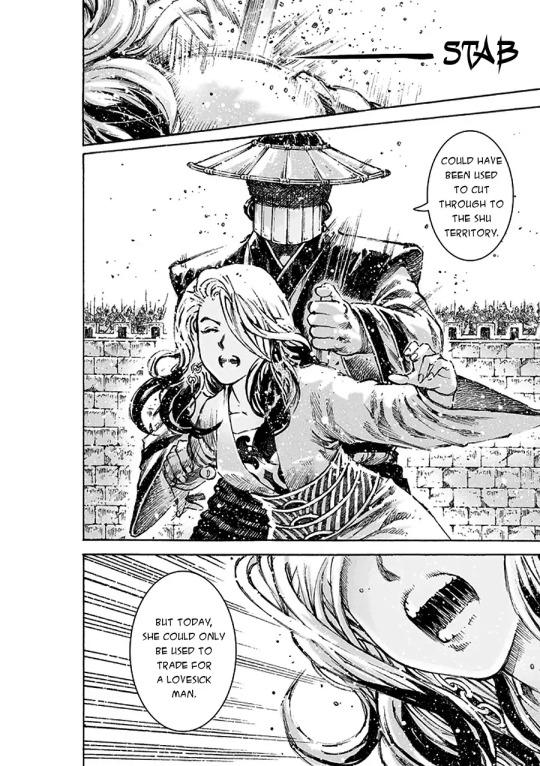
He is acting as if he does not view people as objects, Yun is acting as if he does not view her as a loved one (material value against the emotional value)
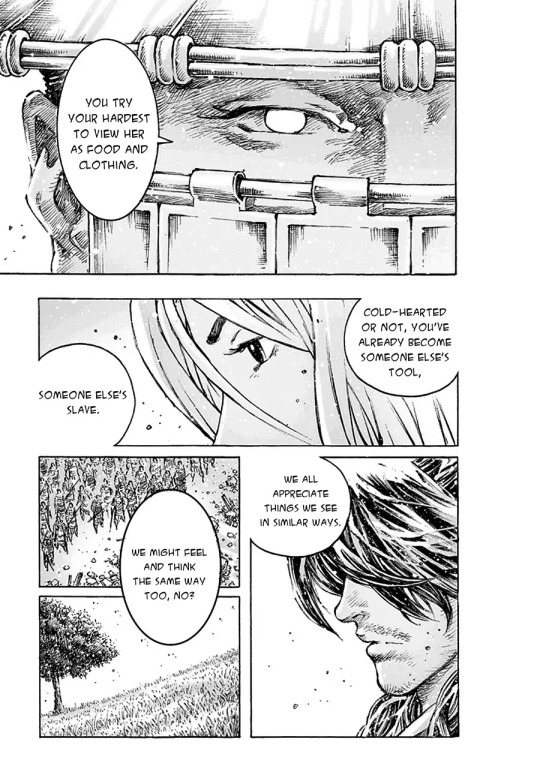
Infiltration of Shu is quite obvious with all of these details and that freely be interpreted as if 8th is focused on Shu, but we could also take it as a hint that he has tried and may still be trying to plant some moles in other factions as well.
In addition, he usually talks whatever is necessary without much care to his actual intent, which not only results in an interest rabbit hole but is also a very intriguing character trait and a means of manipulation. Reason for that being the fact, that most of what he is saying is actually… true. Yes, his words are self-serving. Yes, his words do not reveal what his actual motives are. Yes, he is purposely aiming at your most vulnerable topic. But he is the only one telling you the truth about yourself and he is the only one giving you the freedom of choice towards what you crave.
The beauty of the 8th Genius' dialogue with Zhao Yun to me is that, despite all of his words being self-serving, they were probably the most honest words Zhao Yun had ever heard. Even Liu Bei or Sima Yi never mention the fact that Zhao Yun has essentially been a slave all these years, who has given up on his happiness to fulfill the wishes of others. And yet here comes this unknown man who manages to get to the very depth of Zhao Yun's character in a mere couple words. And to make it even more beautiful, Zhao Yun faces these words that cut him to the core head-on, and not only acknowledges them but in the face of these truths and in the face of a final chance at his own happiness, he chooses again to remain a slave for the sake of someone else's desires. And that's what makes the 8th Genius so enticing to me. If he can get to the bottom of such an enigmatic character like Zhao Yun in his very first appearance, I can only imagine what he'll do later on.
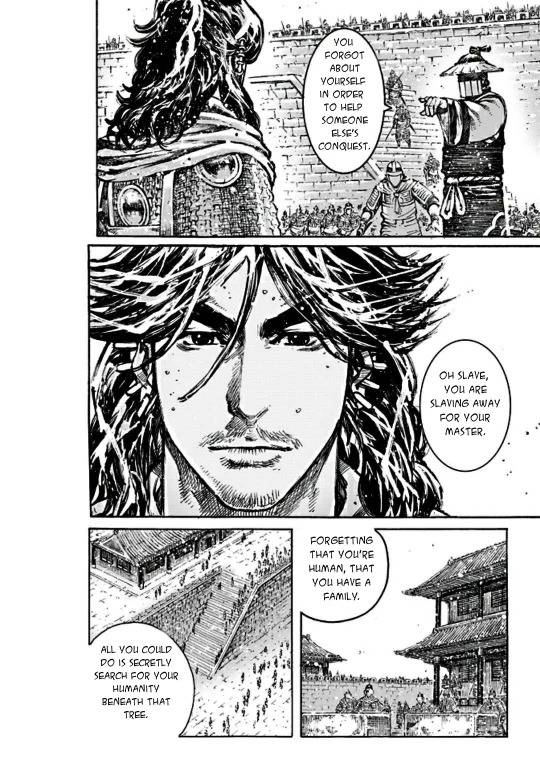
Though I have to note that the 8th isn't the only one to have confronted Liaoyuan Huo with a dilemma... Zhang Lei sort of did that in 293, Liu Da offered something similar in 384 (the difference I suppose is that whereas they challenged Huo to choose between 2 masters, the offer of the 8th, even though less genuine, is for Huo to choose between serving a master or walking away)
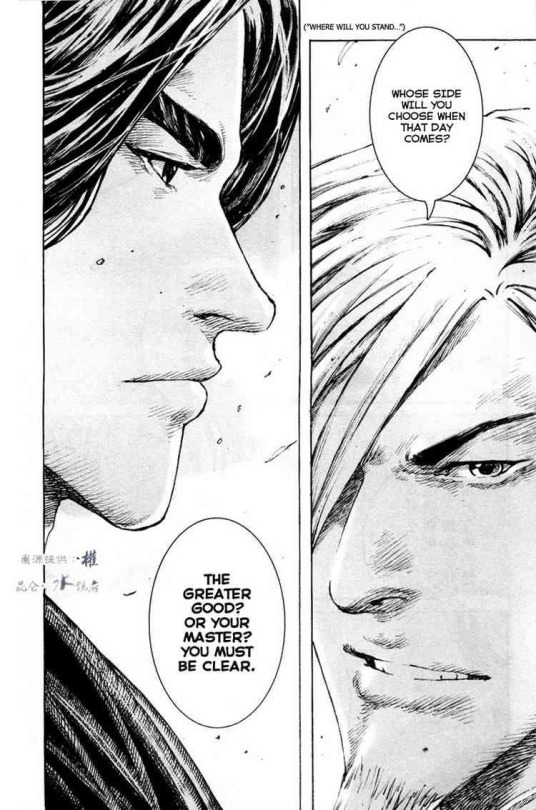
in another note, it's important to stress that if warmongering is the problem (especially if we consider that what usually happens when regimes wage war as a distinct form of mass conflict unlike popular uprisings and insurgencies is that pacified populations are coerced or cajoled into expending their labor and lives to feed machines of organized violence that mainly benefit a select few) it's not a matter of who wins or loses since the game itself is rotten regardless of goals and intentions
Alas, one other issue is that many cut ambitious conquerors (especially if they exhibit charisma and are on the winning side) some slack, while those motivated by ideology or principle (especially if they're losing) are selectively denounced as zealots for trying to push a program
And yet who doesn't like heroic tales…

That’s how the 8th stands out among his classmates mainly in terms of how his rhetoric focuses not so much on principles and ambitions (even Zhou Yu's attachment to the Sun clan involves sticking by some notion of continuity), but simple and personal desires and choices – which fits the narrative of the Four Commanderies and analogically makes it stand out among the other arcs. It is an arc, which highlights the how empty is the shell of people, who are getting defiled by their own egos or thorny roses, beneath the surface of their facade and how some of them stop, start listening to the voice of reason and thus develop into respectable men while maintaining their individuality. The unconventional part that elevates this arc into being a masterpiece is the fact that even protagonists may have a facade and in overall, not every facade is shallow or/and they do not serve solely the corruption.
Sure, I talk a lot about the comparison with Zhuge, but these details were brought from this exact arc that is not even focused Zhuge, but aside of masterfully crafted indirect hints, Four Commanderies put on a table way more than just that. The obvious one being the personal conflict with Zhao Yun, which I already mentioned:
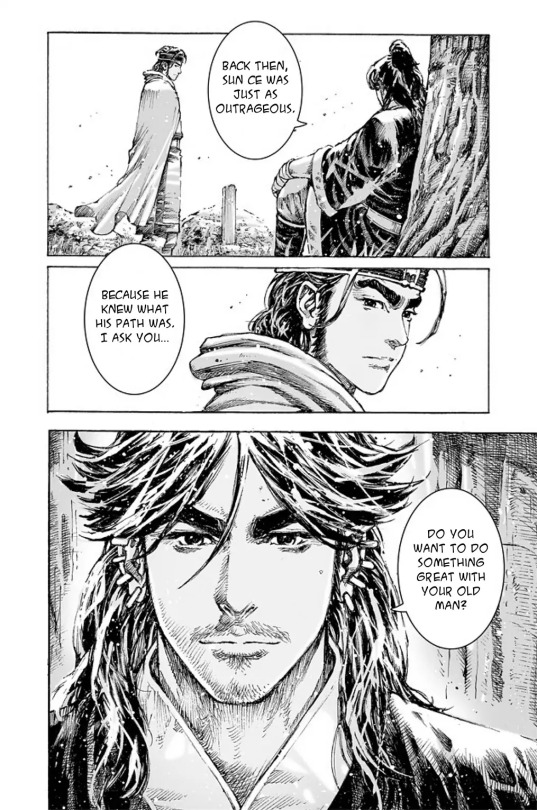
There 8th “asked” Yun to choose what’s his actual happiness, his own life or someone else’s path (that is burdened with failure) – little did 8th know that from Yun’s perspective it did not really matter what he would have chosen, because of how both of these choices are important for Yun as a person, how both of them are what he is craving for and how both of them are going to enslave. And he can’t even choose to not choose, because he would be going against himself in ANY case. As cold-blooded as he is, Zhao Yun got numb by making the best possible choice – “Three days. More than enough”. Truly, 8th failed at psychological warfare (and even if had an upper-hand in a duel, it did not really matter), but admitted that Yun made a right choice, without explaining himself – I think the existence of Zhao Tong made the choice correct. When a father and a son met, both of them found their “pieces of jade ornament that can be traded for cities” (note how Yun compared his son to Sun Ce – that was rather delightful for Tong, considering that no one was taking him seriously whenever he was comparing himself to Sun Ce). That was quite well symbolized by the lively tree near Yun. Usually, whenever a life-changing event happens in his life, he is near a dead tree.

After all, Zhao Yun is already used to selling.

So many lives that he cared about are no more, what’s one more.
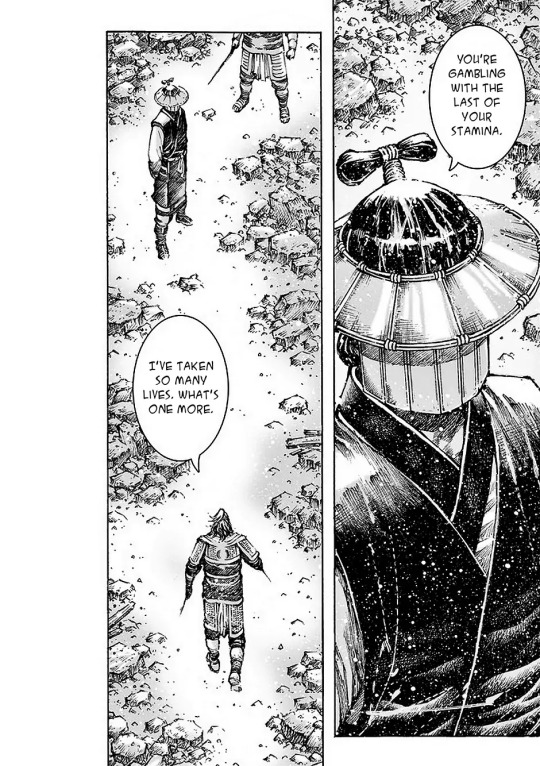
(And if I were to fanboy over him more – “Huo” did not really return after the warrior’s duel (named as “a path of no return”))
Briefly to come back to Zhuge, the one who basically pulls some strings behind Yun – when 8th mentioned the facade of the “greater good”, I was suddenly reminded of a saying by melancholy 7th about “benevolent realists” when he was talking about how people like to shield themselves with “FOR THE GREATER GOOD”, while in actuality they are masked egomaniacs. But if Zhuge says that people use “greater good” as a mere excuse (as he always dislikes the certain type of people), 8th remarks that these self-proclaimed paragons of virtue (such as 7th) are merely deluding themselves and the concept of “greater good” does not even exist.
In short, lying to others that you are a savior vs. lying to yourself that you are a savior

If you think that the introduction of this character is already great enough, you need to get prepared, because the revelation, that completely recontextualizes these events into something even more meaningful and profound, is yet to come.
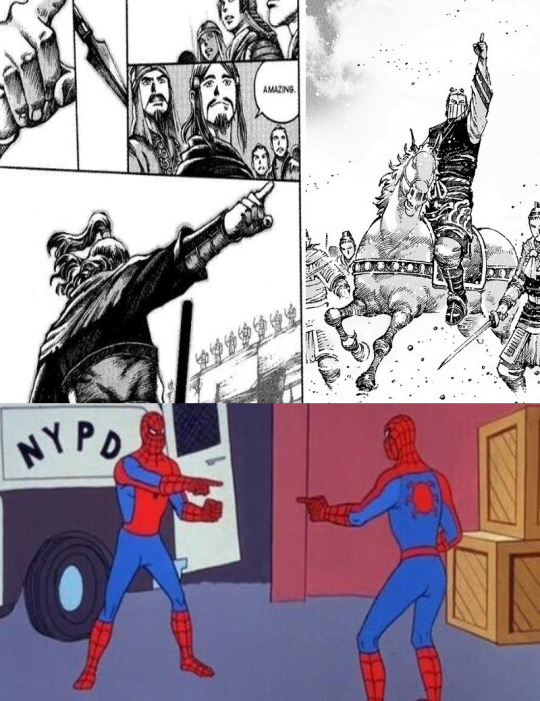
When Yun remembered the bits of 8th’s backstory from his memory, 8th pointed his finger to the sky, a call-back to that scene when Huo was named as Zhao Yun and that, as far as we know, cemented him as the perfect foil to Zhao Yun and now demands from us to re-analyze this precious arc of his as the mirrored life of Liaoyuan Huo from two respective points of view. Considering the fact that Ravages of Time is exploring the history and human condition as a theme, then it won’t really be a surprise if I would define “mirrored life” as if they were the alternative versions of how would Huo’s life continue if he were to choose different paths of life.
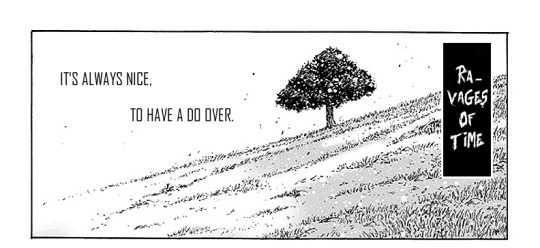
1) Zhao Fan’s case is rather easy to elaborate on. He represents the “pretentiousness” (by compensating his lack of masculinity and love from his loved one, through the pretense of just babbling hollow words (merely citing others), as he is not capable of doing anything else) against the “reality” of Zhao Yun (less talk, more action attitude of his and plus the playfulness that is hiding the coldblooded nature beneath the surface).
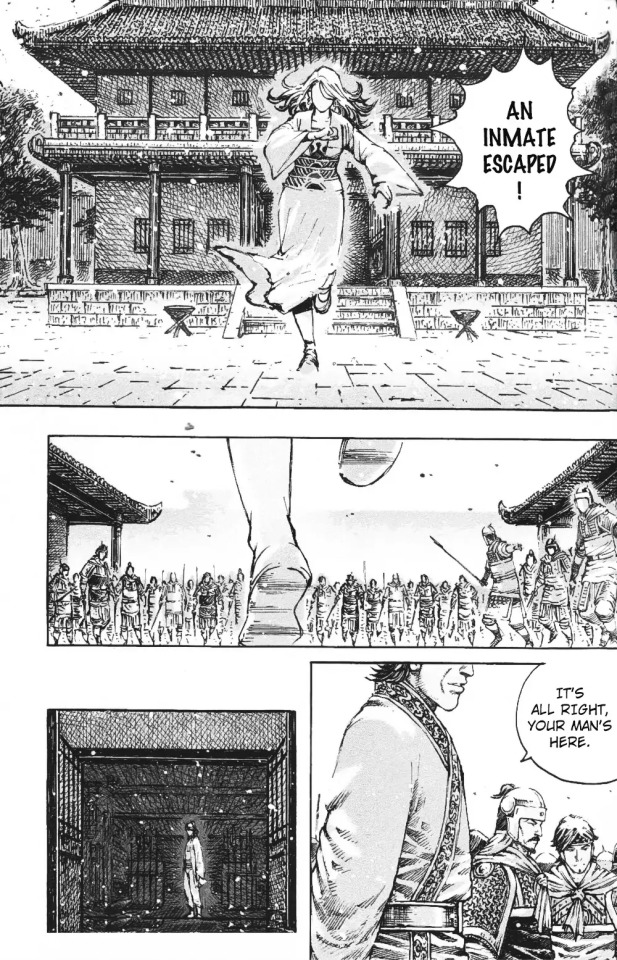
That pretentiousness would define Zhao Yun as well if he was not so hardened by the high amount of struggle he lived through and later be polished by Liu Bei. Huo would have been in his place if he were to come to his loved one instead of Xiao Meng. But that would come with its own negative consequence, as he would not have been loved.
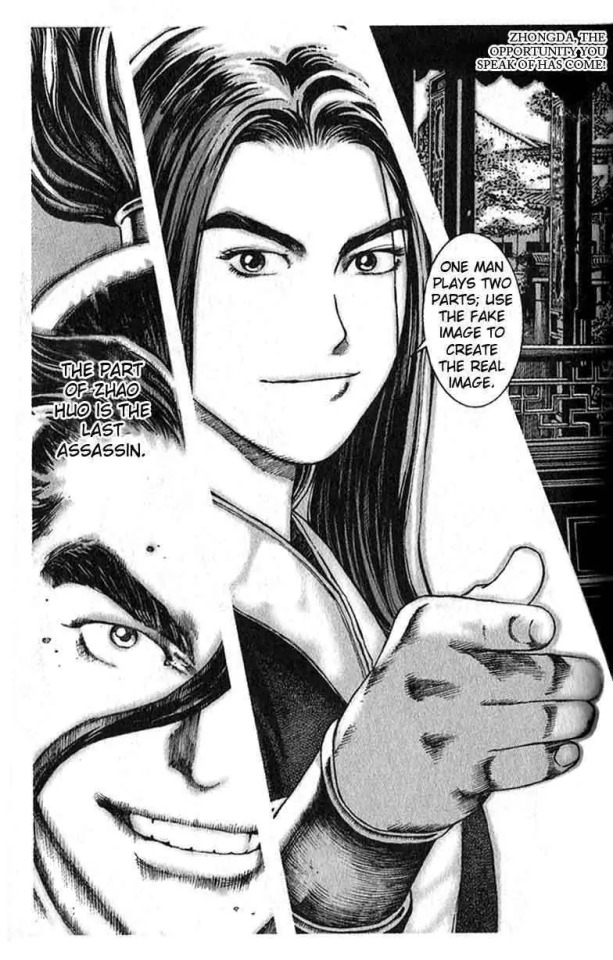
2) 8th’s case is a bit complicated. They do share the path, but with the polar opposite approach. “Sharing the path” is amusing on its own right, though. Huo took the name “Zhao Yun” and will get recorded in history with someone else’s name, but the guy who was born with the name “Zhao Yun” won’t be recorded in history with his own name as well. Still, his name will exist in history, but it is going to be a guy, who’s completely different from the original Zhao Yun. Talk about an identity crisis.
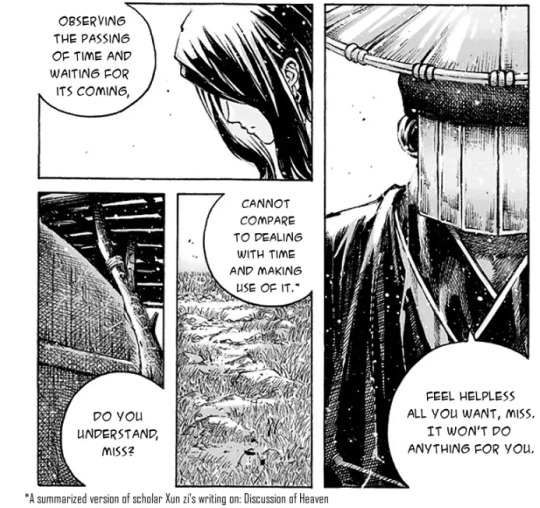
“observing the passing of time and waiting for its coming, cannot compare to dealing with time and making use of it” – This throws us back in time, as far as the early chapters go, when Yun had an internal monologue about waiting for someone who would change and save the world. Around that time, 8th was persuading Huo’s loved one about how meaningless it is to just wait for something. Perhaps Huo would have undergone 8th’s path if he were to study as a genius to save the world instead of waiting for someone else to do it, but at the end of the day, he managed to understand where he belongs to.
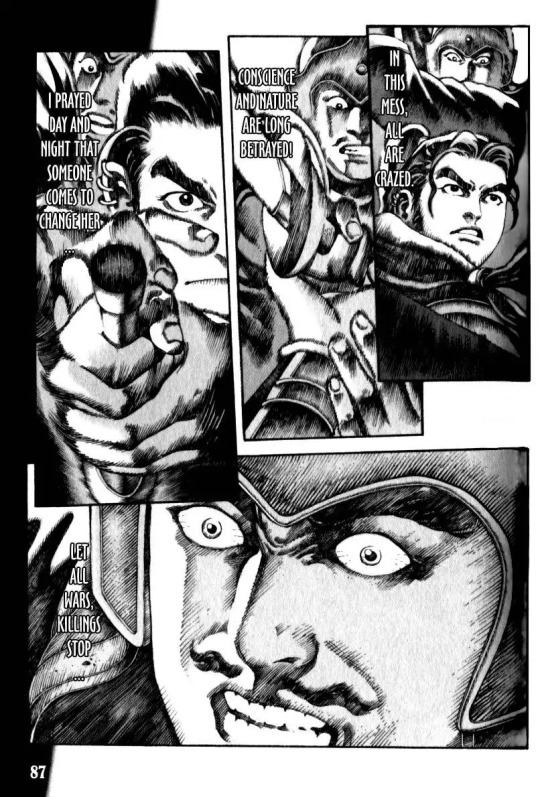
Huo was waiting because he did not see himself as someone who could really make a difference in the world (“if martial arts would have made a difference, then the key positions in the world would already be dominated by various schools”). Meaning, that only “grander” things affect the world (such as Jesus and Dragon). but 8th begs to differ, with an argument that the delusions of grandeur should be broken for people and that even “books”, as tiny as they are, can affect the masses (for example, how Sun clan was hiding the true Art of War for themselves)
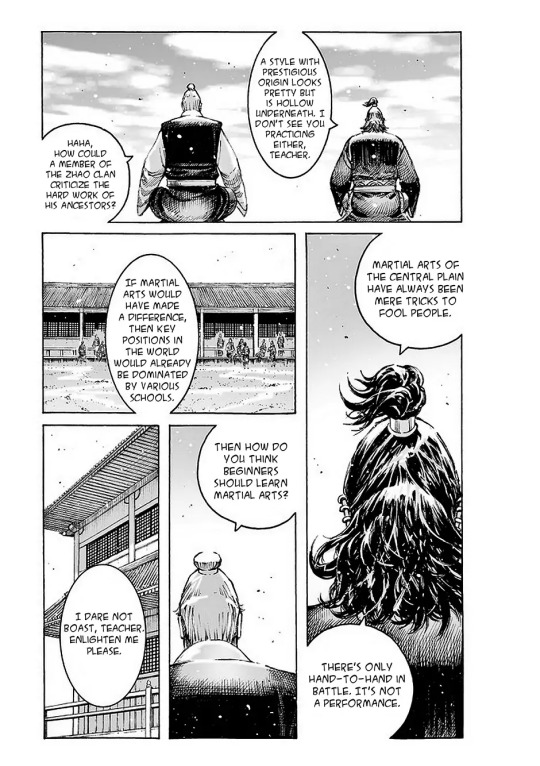
“what we need to learn now is observation and patience” – still paid off in Huo’s case and so it did for another Yun as well, as he was busy all these years, observing not only the human nature but the hidden meanings and uses of certain things, such as the literature as a tool of lying (“you won’t understand history without knowing how to lie”). This also foils how Zhuge was “waiting” and cultivating the illusions about Liu Bei for all these eleven years.
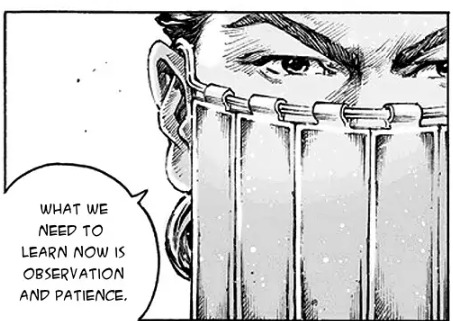
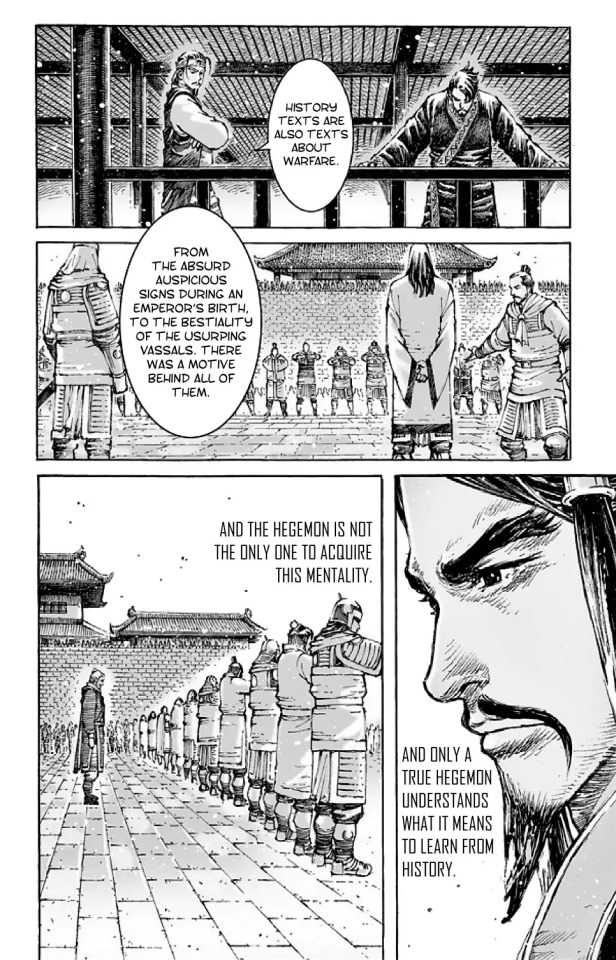
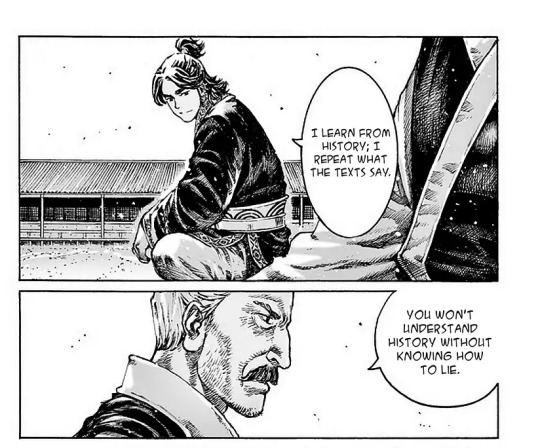
It is quite ironic and contradictory when 8th is talking about how important it is to know “where one stands” and yet he lacks identity and that helps him to stand (“infiltrate”) in any faction, at the same time. But us not knowing the identity of 8th further empowers my approach. Matches well with Huo trying to suppress his emotions and forget himself, thus becoming numb and losing his identity, as he won’t even get credit for his heroic deeds.
Basically Zhao brothers can be seen as the Yun’s identity crisis, a conflict between his duality of nature (Fan – wanting a normal life with his loved one. 8th – wanting to go with Liu Bei). And Huo killed Fan by his own hand, so killing the “longing for a personal happiness” also took a life of his loved one at the same time, by 8th mirroring his hand.
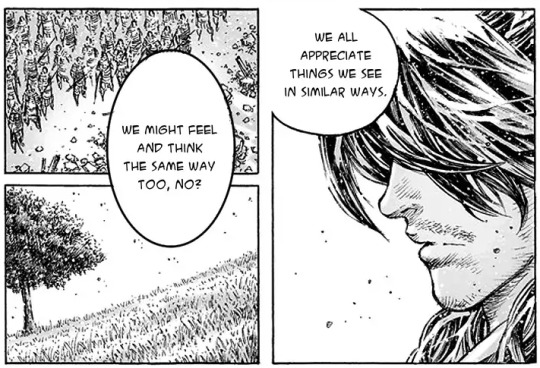
(8th casually hinting that both of them are named Zhao Yun)
The point of mirrored life is that he was always suffering, is currently suffering, will continue suffering, and would have suffered even if he were to make different life-changing choices in the past. But he will continue to live and will carry all the weight, as he already accepted it. It is as realistic as it gets – no matter what you are going to choose, the history is going to fix itself.
As to how similar 8th is to Liu Bei, we can talk about that right now. Meanwhile, 8th was judging the character of an assassin, Liu Bei was also being busy by judging the character of another Zhao and that, you guessed it, allows US to judge 8th as the mirror of our Chinese Jesus as well. To begin with, it is implied that both of them have two oath brothers so that comparison is not really far-fetched.

On the surface, both of them are good at judging the characters and while they are at that, none of them are using their real identities, but the substantial difference between them is that – Liu Bei is using the identity of being the cult of a personality, while 8th is not using any identity at all; Liu Bei is giving away a sincere brotherly love, thus gaining help from them on their own accord and that is something 8th is alien to (Zhao Fan was enslaved to his desire, rather than the aspiration of his brotherhood).
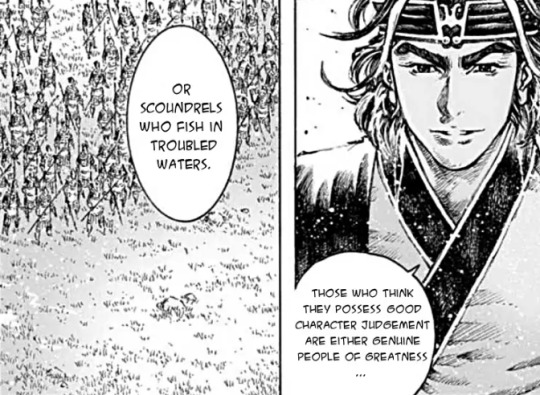
Now it should be noted that even if Liu Bei is getting a warm love and help from his oath brothers is a good thing, of course, Chen Mou has not forgotten that even such kind and heartfelt intent/actions can be harmful to the lofty aspirations. I also daresay that there is a great potential of showing the enormous flaws behind saving the world as a cult of a personality.
The first is directly connected to the relationship between the “savior” and the masses – there will be a part of people, who will have an urge to completely become reliant to the “shelter” that was provided to them and not only lose the sense of individuality in the process, but also get so soft in the process that they won’t be able to stand on their own again so easily.
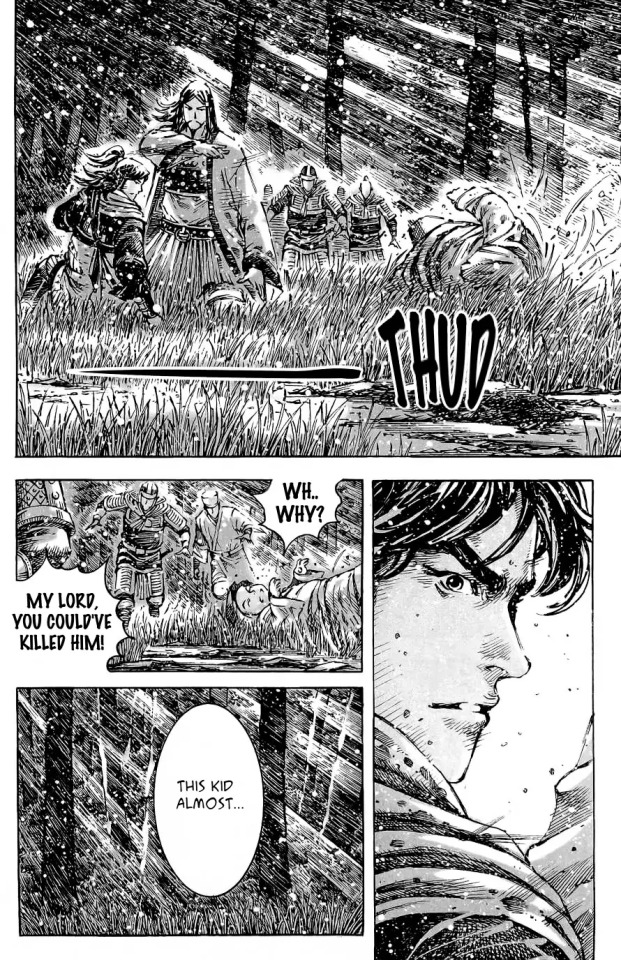
The second problem comes exactly from that and both of these could be depicted in RoT through Liu Shan’s character arc – for the world to be shaped as in the eyes’ of Liu Bei, he has to alienate himself from the garden of earthly delights and the human beings themselves, thus he himself will become a tool, who will only be able to care about his comrades-in-arm. After all, he values them more than his own son.
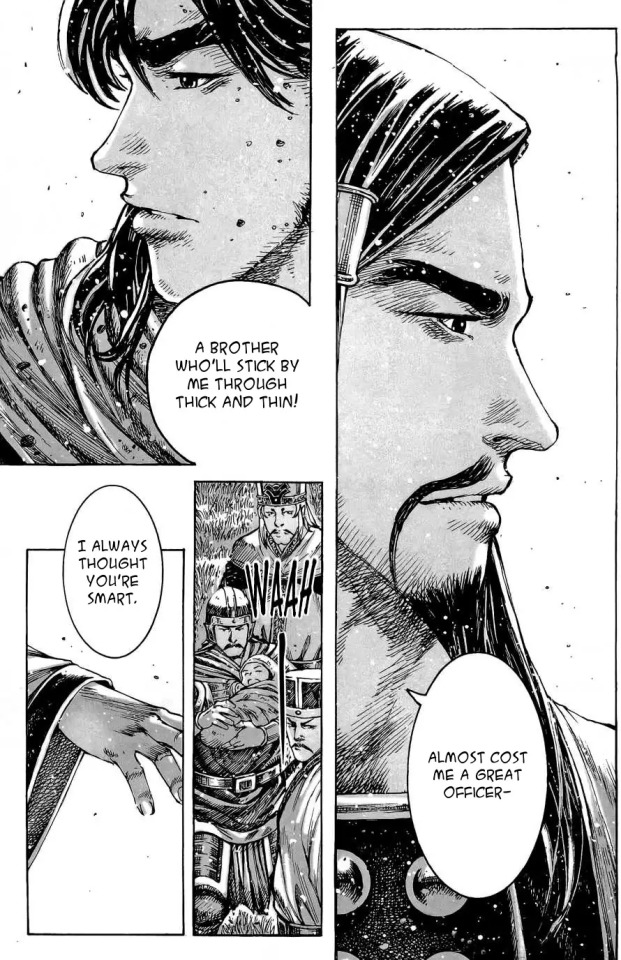
Right in the queue is standing a dragon (aka, not human) Zhuge Liang, who will also drag Liu Bei’s son to the moon. Moon of course represents the principles of Zhuge Liang and he is going to nail them in Liu Shan’s mind so much, that there will be no one to take the child on earthly adventures to gain necessary experience about the reality and human interactions. After all, Liu Shan is neglected to the point of being used in schemes even as a child. Although the role of Sun Shu in this ordeal is still a mystery.
One thing is clear – without Sun Shu, Liu Shan is going to become an anti-thesis of 8th’s ideology.
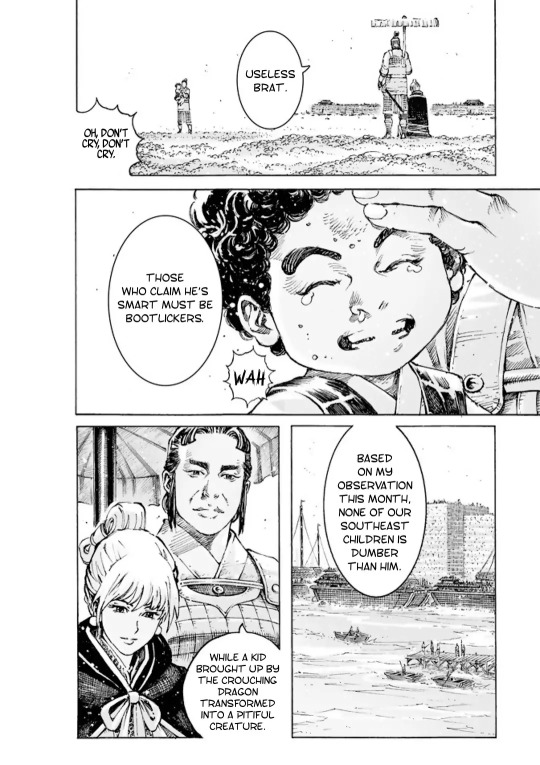
To have a clear idea and understanding of what I am talking about, you could always watch that Ghibli movie named “The Tale of the Princess Kaguya”. The Emperor there is so out of touch, he is not even aware that he should not touch women without their consent.
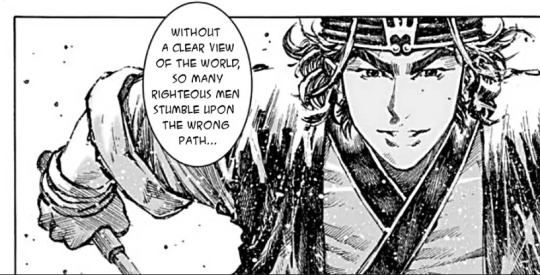
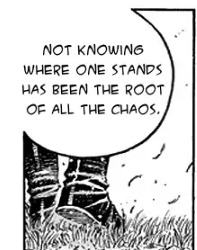
8th’s ideology won’t result in such degradation, but Liu Bei has his own arguments against that world-view. If 8th blames people for having the delusions of their own grandeur, Liu Bei says that people have delusions not about their own selves, but about the world itself, as to how it is “structured”. So, people are not defiled, they are just following the wrong path and guidance could fix that. Zhao Tong depicted as someone who is not being as educated and well-read as Liu Bei further nails the point.
(Thanks to the translator Merc, who told us that this idea was conveyed through the wordplay that was lost in translation)
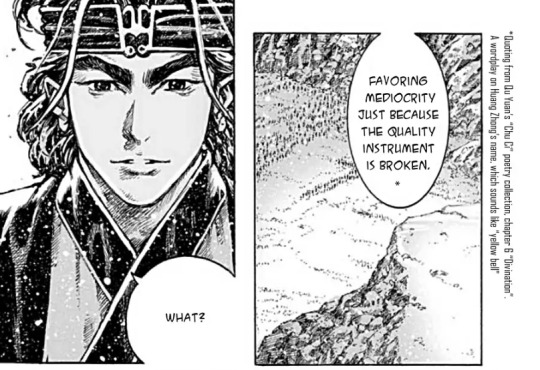
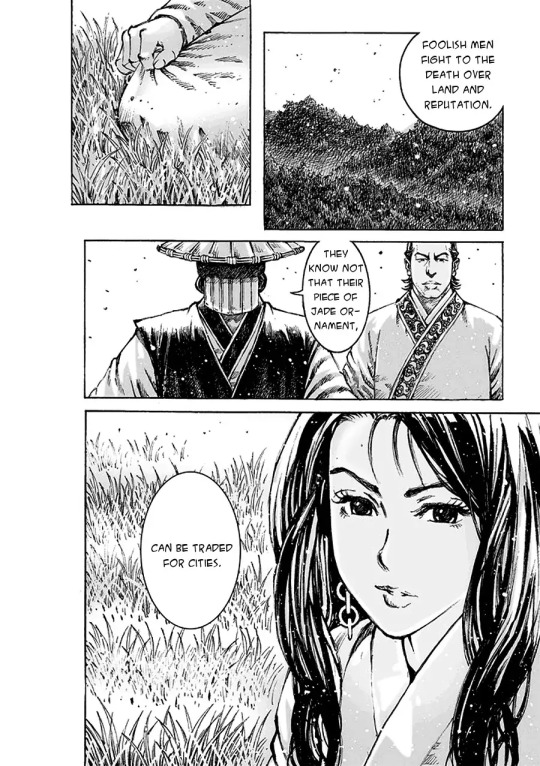
Surely, they won’t settle about the definition of the right path so easily. If 8th thinks that people should start valuing whatever they have and whatever they are able to do. Basically, the idea of saving the world won’t ever be fulfilled, because the world will only be saved after people save themselves – Liu Bei answers that one does not have to choose necessarily a mediocrity (in 8th’s case, broken people that he chose, such as Xiao Fan) and give it a value, just because the world in their eyes is ruined. Basically, gems still can be found in every corner, but they won’t polish themselves, so the world is still worth saving and could be saved if only we showcase what they can value.
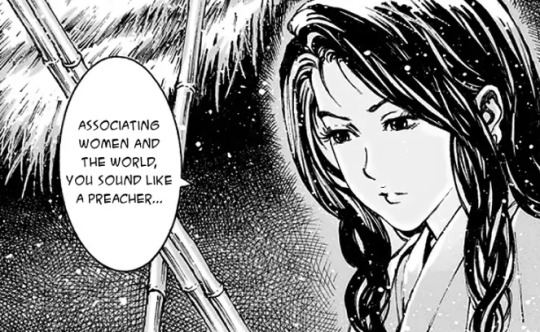
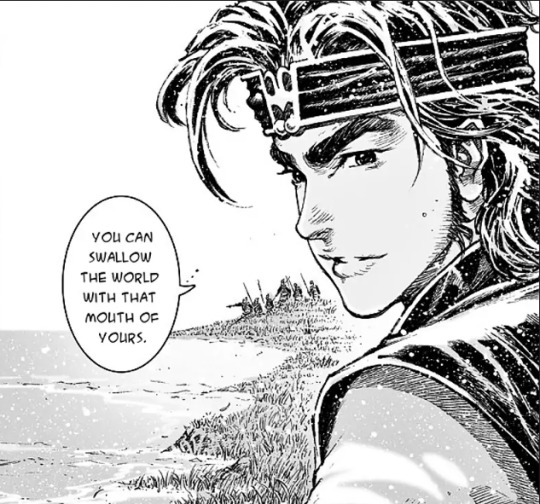
In short, 8th thinks that everyone could have their own things to find value in, but Liu Bei wants to create one general “shelter” that everyone will find value and solution in (and our boy Huo got both)
What makes the feud between 8th and the Shu compelling could be summarized in two features
1) When Cao camp is full of elite soldiers who were trained for what they are doing and Sun clan is fully family oriented and thus chains the family members, Liu camp is full of opportunistic individuals that choose their path on their own. On face value, 8th should be quite fond of them, but divergence comes when the said individuals view someone else’s path as something grand and enslave themselves, forgetting to why even they want a better world and are sacrificing themselves just for someone else. Despite that, they still remain as somewhat respectable in the 8th’s eyes.
2) The inherent duality of men, as both of these approaches find their justification within the human nature and, at the same time, it also serves as a counter-argument to each other – in times of order, people are going to seek disorder and in times of disorder, people are going to seek disorder, hence comes the pivotal point in the dynamic between 8th and 7th – If one wants to make use of human’s longing for peace through crafting the fake cult of personality, which will achieve stalemate and turn into status quo, another one wants to make use of human’s craving for desire through the dispersion of their delusions of grandeur first, by which people would lose interest in waging meaningless wars over meaningless lands and reputations.
After all, “winner takes all” is but a surface level aspect of how Ravages of Time deals with its roots - Poetic tragedies, with proper emotional baggage to convey the horrors of war and an exploration of the inevitability of history and the meaninglessness of our struggles when confronted with it.
Of course, we are not finished here, because aside from Shu, 8th has enough potential to foil Sima clan as well.
Let us start with Sima Yi himself. I'd argue both are exceptional men from powerful clans destroyed by forces beyond their control. Sima Yi being set up by Pang Tong and Sima's destruction changing him irreparably into a darker man. Like Hamlet the main driving force of the story is his revenge and just like Hamlet his actions unknowingly cause a similar tragedy to his own occurring. Sima Yis actions destroyed the Zhao Clam just like Pang Tong eventually destroyed the Sima as a scapegoat. Both attempt to gain revenge and return their clan to greatness. Yet while Sima Yi joins a future kingdom the eight opposes one and fails with his oath brother being forfeit. The irony being that Sima Yis entire life changed by one tragedy yet he doomed another man like him to the same fate unwittingly at the very start of the series. One was Zhao Yuns best friend while the other is arguably his most dangerous enemy now. I think there's a surprising amount of similarities and parallels between the two even this early. Oh, and both killed a woman Zhao Yun loved. Sima Yi by inaction and the eight in a moment of direct revenge. I'm perhaps not articulating this the best but the aptest dramatic comparison I can think of is he's the Leartes to Sima Yis Hamlet. Whether they will end up having the same conclusion as those two characters is up in the air though.
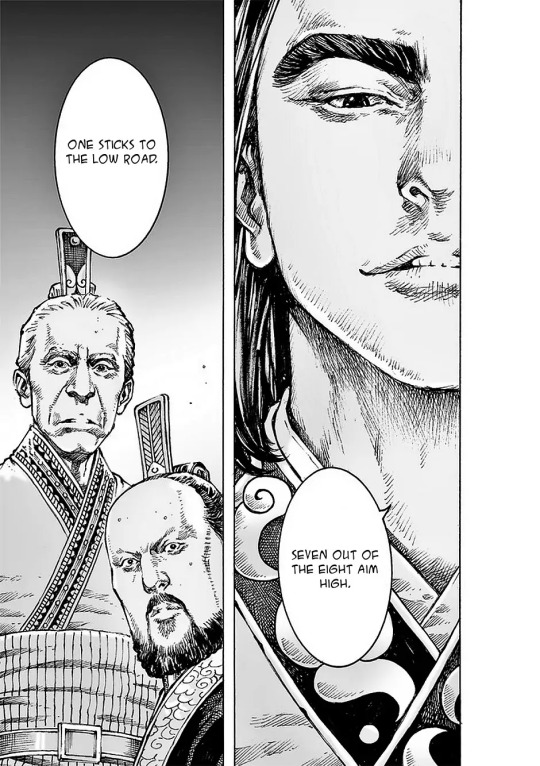
And meanwhile, 8th was concluding his not-so-grand spectacle, another member of Sima clan was introduced in the story – Sima Min, who is also an eighth member, rather polite and even was detached from other seven for quite a while and are considering as some kind of anomalies. After a line “seven out of the eighth aim high. One sticks to the low road”, even comes a hat of the 8th, whom we, in fact, described as someone who stands out by sticking to the low road. If I were to speculate, Min is going to be the one defending his own brothers, but 8th is going to be the one attacking his own brothers.
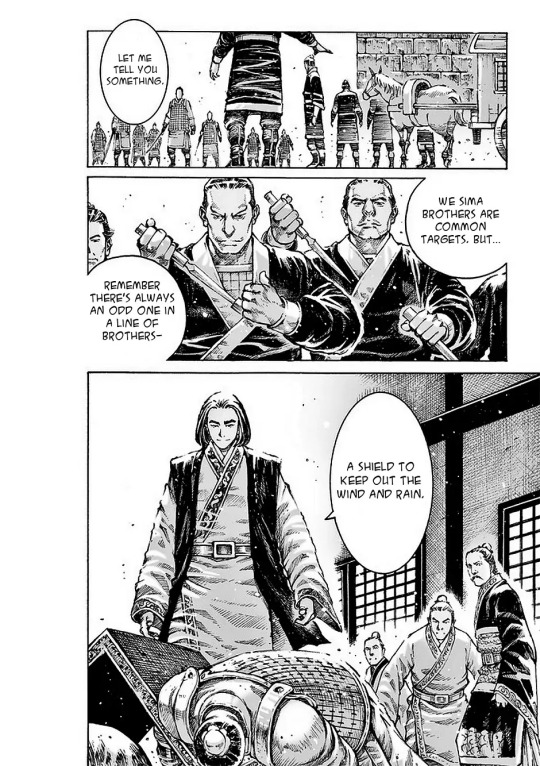
Both of them also serve as the premises for the next arc, even if they are not participated much in it, as of now: “Breaking the tradition” and the lies behind the books about warfare.
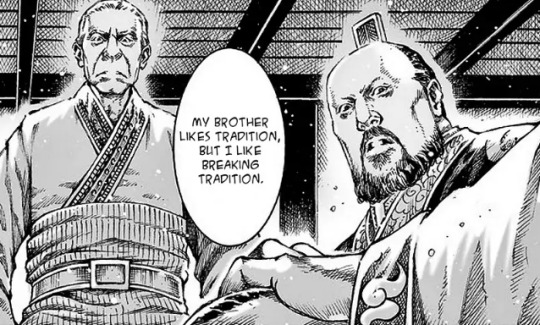
Now let’s come back to the long-postponed theory-crafting of mine.
-In the 468th chapter was revealed a dungeon that was used for torturing people. It belonged to the 8th who was gathering information about the routes of Shu. Then in 483 was revealed that Zhuge Liang had the exact same dungeon.
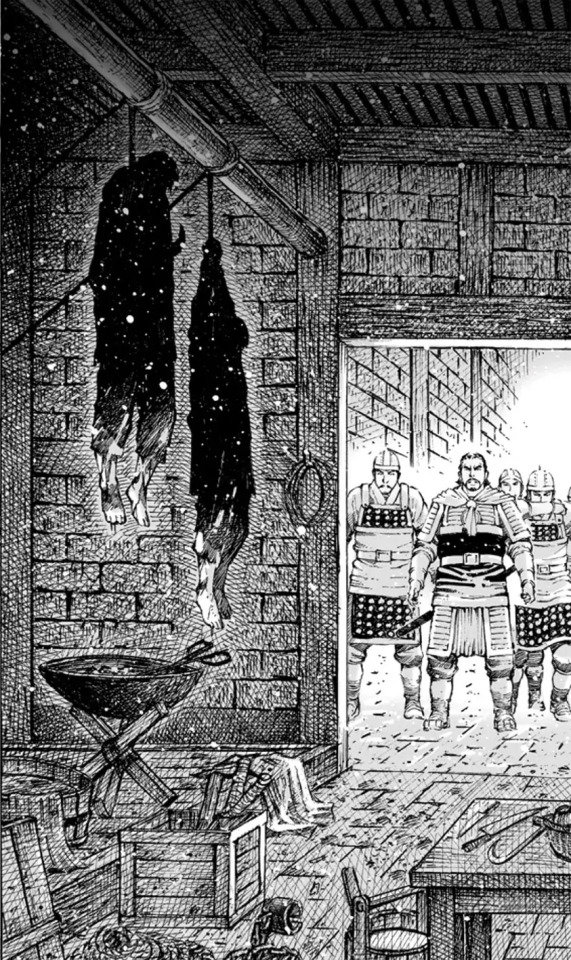
-In the 480th chapter on the other hand was revealed that Zhang Song was brought a fake map and thus Zhuge, who thought that Song was aiding Cao Cao, set a trap for him. There was someone special near Liu Zhang who was manipulating the information as if Liu Zhang was incompetent. That was a trap for Shu.
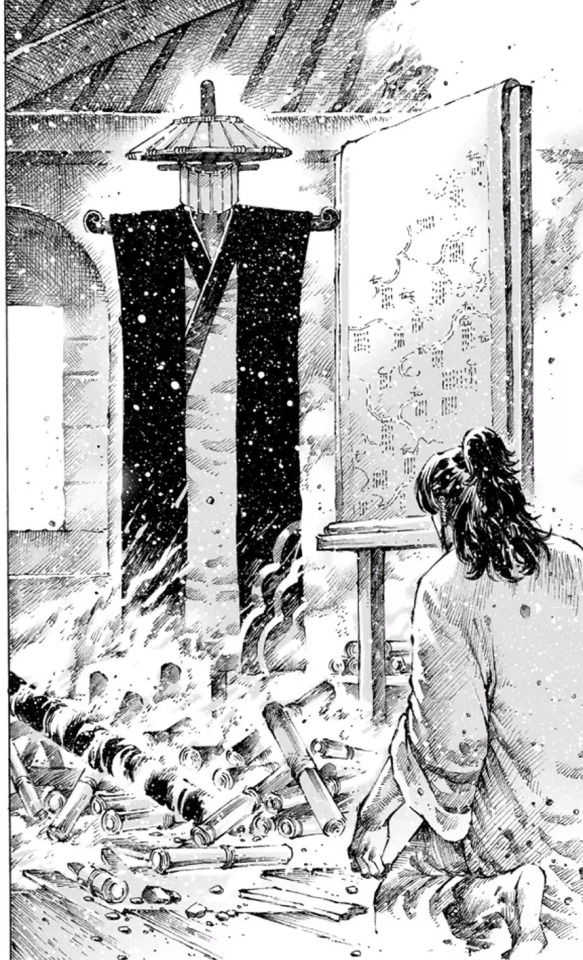
-Now in 483th Zhuge started a discussion about Zhang Song and 8th at the same time. After all, in the 468th chapter was also found a map, which was most likely made by the 8th. Key point was, that both of them were made in the same style, thus were made by the same person. The difference was, that the map made for Shu was fake, and the map made for 8th – was legitimate.
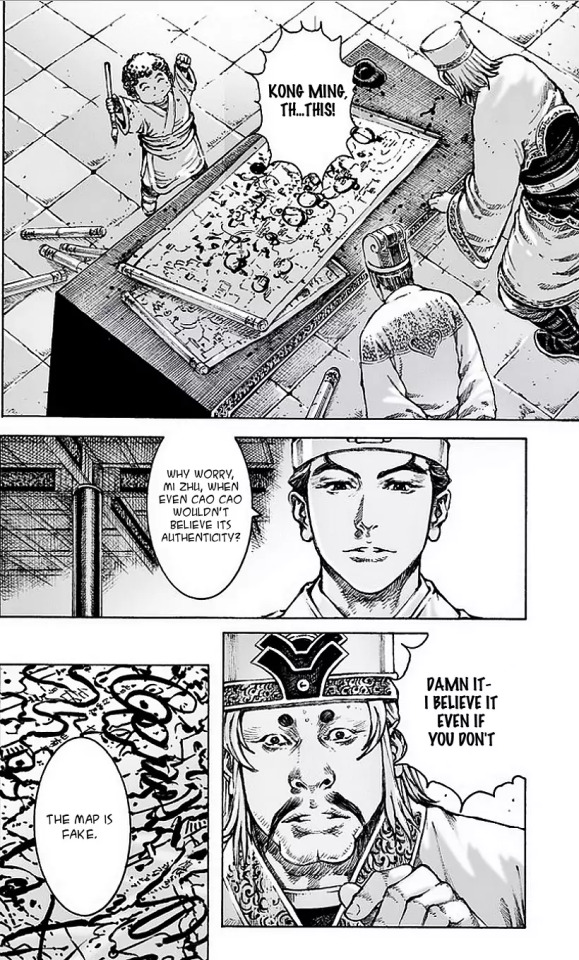
-At the start of the 483 chapter, Zhuge mentions how hard it is to track 8th and unless he announces his name, no one will know and yet, as a result of what was mentioned above, Zhuge deduced that 8th indeed graduated. Meaning, he has actively participated in the ravages of time already.
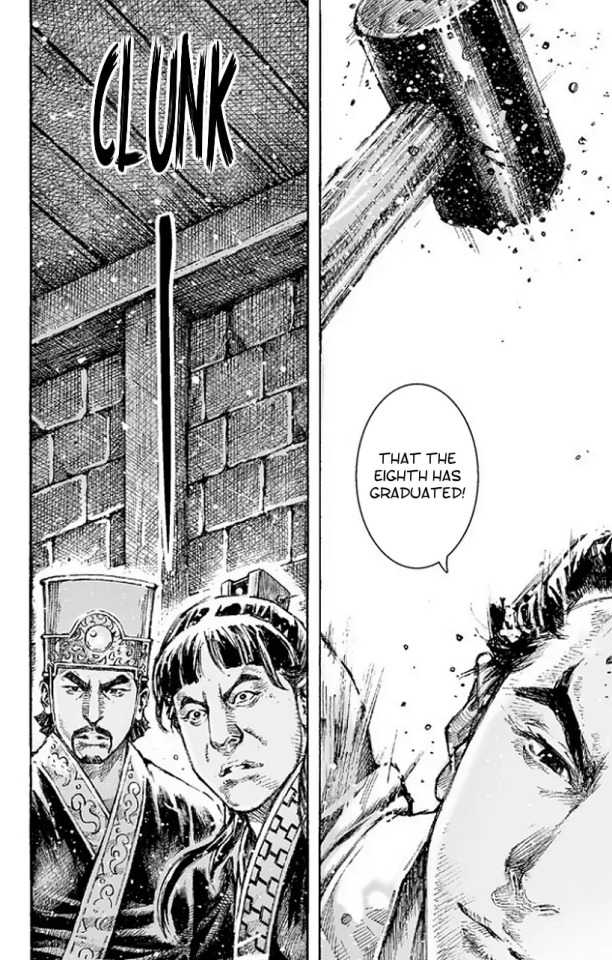
-In 483 Zhuge also did deduce that this man was merely “named” as Zhang Song. Meaning, his actual name is different. Now, how did 8th managed to convince him to not reveal that even after the torture session is a mystery. I can only think of “eccentric magic” (which I think is exactly what 8th needs for his plans, but it is also something that he wants the least) or heavy psychological pressure (considering that one guy with the damaged psyche in his chamber, chapter 468)
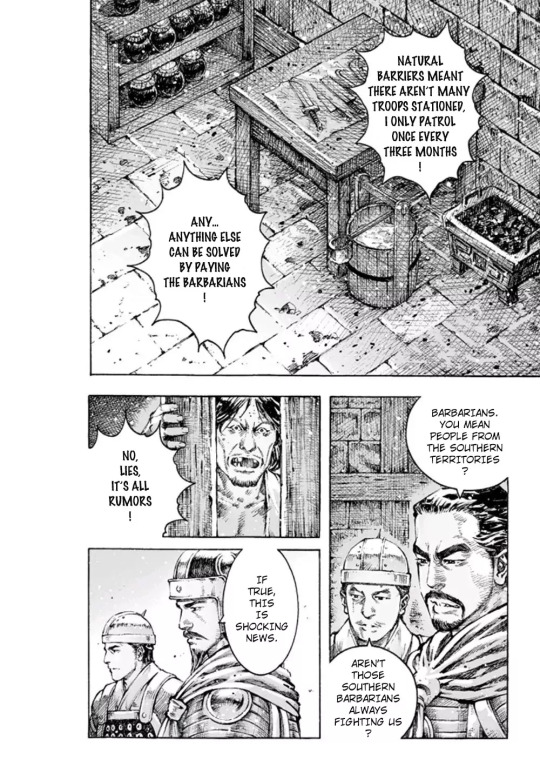
-Even more interesting came into the play after several chapters. It was revealed that there is another Zhang Song, who was aiding Ma Chao (who was also getting help from the Sun clan) and whose face was not revealed suspiciously. Why would there be several people with the same name? That’s rather CLOUDED (excuse the pun). One thing is certain, 8th is behind Song tricks, whether he is the one using that name, is actually named that or is cooperating with original Zhang Song – is another mystery. Zhuge did ruin his plans AGAIN (was it the third time?), but he still is cultivating his influence.
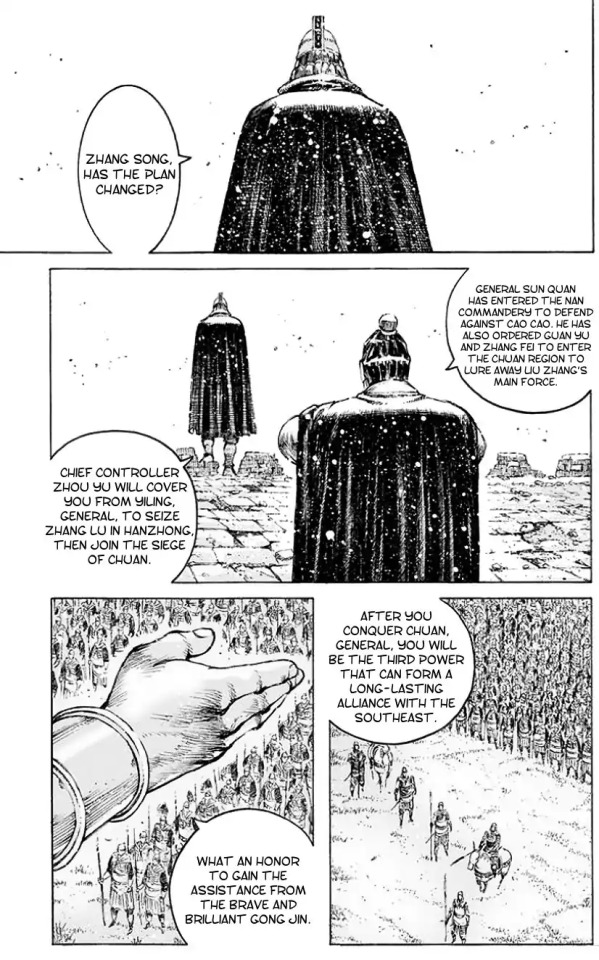
To conclude the analysis, let’s get back to the titular topic with a little hierarchy.
On the first level, there are stories with a black and white morality. Usually, black side is cartoony cynical, with no redeeming qualities and white side is cartoony idealistic, with irrelevant flaws (being hot-blooded and etc) – and the Ravages of Time even features such “stories” in deceptive schemes and labels them as “propaganda” (social commentary)
These “black” sides sometimes tend to be “justified” as if they were realistic (for example, for some reason, it is ok to have such characters if the setting is in the middle ages). Such explanations completely ignore the fact that no fiction is realistic and that every “realistic” being has redeeming qualities.
On the second level, there are stories with seemingly grey morality, through the presentation we do not actually see this moral ambiguity, so the presentation falls apart just because the characters’ words (what is talked) and actions (what is shown) contradict each other so much, that story does not seem self-aware anymore – a prime example would be a good guy, who wants to achieve a stalemate, but his actions tell otherwise and no one is actually calling him out on that hypocrisy. Also, everyone he faces is clearly inferior to him from a moral stand-point.
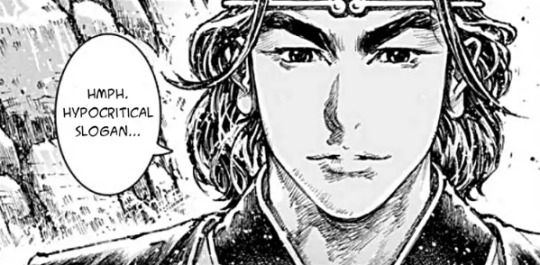
In such stories “black” sides may even have characters that were abused and victimized in childhood and now they are apparently pointing out the flaws in the system by blatantly indulging themselves in atrocities (for some reason). This is not only a cheap emotional manipulation but completely superficial and immature, as they are whining about the system by being worse than it and do not offer any solution to fix the system or a better alternative – they are merely amazed by the fact, that the world is imperfect and cannot accept it.
On the third level, there are stories with seemingly grey morality, but now they are doing the opposite. Characters constantly talk about the loss of humanity for the greater good, but they never commit to it and even if they were to do some questionable things (that most likely are glorified), they would still whine how bad the “greater good” is, despite not finding (or even trying to find) any better alternative. Here lies a huge contradiction in the presentation – It is preachy propaganda of “necessary evil” and, at the same time, does not want to acknowledge it, thus the story has a hypocritical point.
In such stories, “black” sides tend to be THE flaws of the system, with no redeeming qualities. They will be one-dimensionally incompetent and just abuse their power just for the main characters to have an excuse to commit “necessary evil”. In such cases, people tend to close their eyes on them being one-dimensional “as soon as they fir the narrative”. Such readers/watchers forget why it’s relevant for characters to not be one-dimensional – it is not realistic, considering you can be a flaw in a system and still have positive dynamics to something/someone else. It also lacks artistry, considering how crystal clear will the stance of the author is going to be by implementing such cartoony characters in his story. So… if the writing is so implausible… how are we supposed to trust the author on his beliefs and preferences, if he can’t implement said beliefs and preferences in an organic way even in his own world?
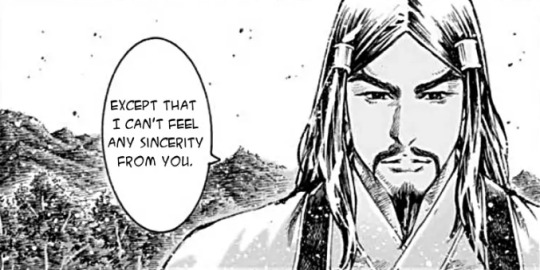
On the fourth level, there are stories with actual grey morality, where every character AND organization has its pros and cons properly presented. Without further complications, focuses on two sides of the conflicting ideas and naturally tells a realistic story, full of plausibility (Eureka Seven and Terra E, as examples)
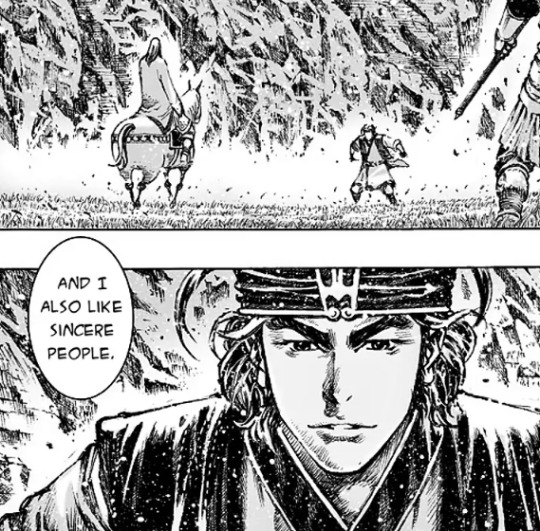
On the fifth level, there is the Ravages of Time, conceptually exploring said contradictions. It not only has more than two sides with full of characters with their own agendas, but they all are making use of various “contradictions” and that is something I wanted to highlight through the Eighth Genius, who is full of contradictions externally, but fully self-aware internally.
Now it is not outright said that contradictions are bad. Quite the opposite – even if they are full of shortcomings, they are also full of benefits and if everything can be used your and someone else’s good, why would contradictions prove the exception? After all, if any effort is futile and doomed, what it all meant to you and how content you were at your death’s bed is all that matters. Which is another contradiction, because on face value, there is no objective reason to do anything if everything’s meaningless, but at the end of the day, you at least accumulated the experience for the future generation, who will also have to postpone the passive decay of the world (but the said shared experience will lead to even more bloodfest, which is unfortunately inevitable in any case)
Failure of self-loathing stories is not seeing beyond the fixed framework. Ravages’ point, on the other hand, is that – contradiction, like anything else (for instance, loyalty), is simply a method and it was set as a framework to fit someone else’s agenda. Of course, merely trying to step out of a framework is not enough, as you are going to meet others who already did that. That’s exactly what’s so alluring about this piece of art – it not only examines a single contradiction with a hopeful solution (Self-loathing Zhuge not raising Liu Shan as a hypocrite), but offers plenty of other alternatives.
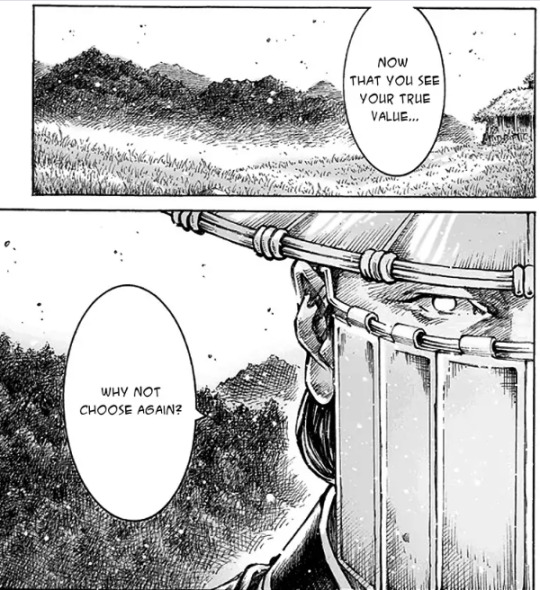
13 notes
·
View notes
Text
Homoromantic subtext in ‘The Goldfinch’
The Goldfinch is a novel written by Donna Tartt, published in 2013. It follows the characters Theodore Decker and Boris Pavlikovsky. The relationship between the two is a bit controversial. Literary critics have completely ignored the implications of a romance.
Let’s start with Theo’s toxic masculinity and internalized homophobia. Since the Tumblr user @borispav has already made an excellent analysis regarding the subject, I’m going to quote them.
”…Internalized homophobia is a fear and aversion toward homosexuality that is felt by a member of said sexuality. It’s an inclination toward projection, a way of securing confidence and self-image (two things which are threatened both systematically and socially) by registering one’s own sexual identity as a flaw in other people.
Toxic masculinity (or hegemonic masculinity) is a series of behaviors and traits found in men who have been molded by the ideologies of patriarchy. This mode of thinking presents a set of standards and conventions which men are expected to both adhere to and promote interpersonally.
When it comes to men, the ultimate goal—in both these cases— is to embody the widely advertised image of what is considered to be a ‘normal’ or ‘average’ man. This man is able-bodied and strong (both physically and mentally). This man fulfills the roles expected of his gender. He is ‘masculine’ in that he does not cry nor outwardly express any emotions outside of anger and lust. As a child he is sociable and sporty. He has many friends and does not struggle with fitting in. As a teen he is rowdy and full of life, armed to the teeth with a ‘healthy’ sex drive; the ultimate manifestation of the phrase “boys will be boys”. As an adult he is married and financially stable. He is on his way to achieving the American Dream: a white picket fence, 2.5 kids, and a wife that he feels responsible for protecting. He is straight and always has been.”
”Naturally interwoven amongst the pillars of toxic masculinity sits homophobia and its internalized counterpart. Heterosexuality, after all, is a core part of being a ‘normal’ male. Any other errant attraction is therefore meant to be deftly identified and expunged.
Given the sexual nature several of Theo’s fears toward masculinity take on, I believe it is more than safe to assume that he struggles with accepting and acknowledging his own sexuality (whether it be bisexuality or homosexuality, I don’t have a definite stance) as it is at odds with what has been presented as ‘normal’ male behavior.
Sexuality very nearly serves as an antagonist in this novel. It’s depicted as an emotionally draining entity, a wildness, a physical allure, tangible threat, and elusive dream. Theo is almost always at war with it—a sort of subplot to the story that mainly reveals itself in behavior and attitude, rather than direct dialogue or thought.
Sometimes the terror Theo harbors toward homosexuality (and, at its core, his own sexuality) is visceral enough to manifest itself as a palpable real-life danger. For example, aside from being verbally and emotionally abused by kids at school, Theo is also able to recall an instance where several boys held him down and attempted to sodomize him with a stick of deodorant (615). This memory, like the other, is mentioned in a passing, blasé, way. However, the fact that Theo remembers it at all as an adult—and in enough detail to recall the exact names of his aggressors— speaks to the experience’s traumatic weight.
In a similar vein, we have Theo’s negative re-entry into New York: the two different adult men who were implied child molesters (who cornered Theo and physically chased him down the street) serving as more literal manifestations of his own homophobia (404-409). This is the fear, and false pretense, that gay men are ‘perverts’ or ‘child molesters’ brought to life. It’s Theo’s repressed sexuality taunting and confronting him in a brutal, nightmarish, form; an expected effect of having been taught that a part of his identity is inherently ‘bad’ and unremovable.
This, and the bullying incident, are two prime examples of a fairly common literary technique used in which a character’s strongest fears or desires are made physical, rather than just emotional. Such a device works to symbolize/convey their fervency, demonstrate just how pressing and real they are to the afflicted character.”
A few examples of Theo’s internalized homophobia:
He can’t tell his doormen he’s going to miss them, because he thinks it would sound ”gay”. (238)
He feels uncomfortable in the cab because the driver saw Boris kissing him. (396)
He’s embarrassed to be seen with Popper because the breed is seen as ”feminine ” or “gay”. (402)
He’s distraught when Boris asks if he’s Hobie’s partner. (615)
“As for the internalized homophobia, it’s as ever-present as ever in his adulthood. In fact, I think it actually might even be morepronounced and focused than it was in his youth, when his fears primarily manifested themselves in vague and ambiguous ways. As an adult, his aversion is blunt and easy to identify. He graduates from steering clear of things that might insinuate homosexuality, to steering clear of gay men almost altogether. He’s able to acknowledge that they tend to make him uncomfortable, but in terms of trying to understand or mediate on why this is so, little is done. Instead he deems it suffice to drop in a few cursory sentences here and there whilst on the subject of something else, leaving it at that. No bigger picture is addressed, and no critical issue is implied.
For example, what we get are brief and loaded anecdotes like the following:
“I’d inherited my mother’s light-colored eyes, which short of sunglasses at gallery openings made it pretty much impossible to hide pinned pupils—not that anybody in Hobie’s crowd seemed to notice, except (sometimes) a few of the younger, more with-it gay guys— ‘You’re a bad boy,’ the bodybuilder boyfriend of a client had whispered into my ear at a formal dinner, freaking me out thoroughly. And I dreaded going up to the Accounts department at one of the auction houses because one of the guys there—older, British, an addict himself—was always hitting on me.” (472)
The sheer weariness and disdain with which he views threats to his heterosexuality is palpable here. There’s something almost sinister and deceptive about the way he chooses to portray these scenarios, something nightmarish in the way both men seem to be implicitly taunting him, confronting or incriminating him with the knowledge of a secret he pretends not to know. Both cases are clearly sources of great distress to him, as he feels the need to bring them up in context of something that didn’t exactly need the reference. It’s all fine and good that he mentions the "younger gay guys” noticing his pinned pupils, since the topic of thought was drugs, but then to go off and suddenly engage in the quotation of very specific dialogue (“you’re a bad boy”), and the discussion of very specific fears (being hit on by a guy), suggests that there is some deeper trauma demanding acknowledgment at the root. Theo is bothered by this. He is tormented by this. He uses the word dread (dread!!) to try and convey just how much he does not want to be in the same vicinity as someone who may act upon the assumption that he’s gay. (He wants us to assume that’s only because he’s confidently straight and doesn’t want the attention, but we know, in truth, that it’s because he’s both afraid and enraged at someone knowing and confronting him with such an unbidden part of himself).
Either way, it’s clear that he’s aware of the irrational severity of these fears, otherwise he wouldn’t have brought them up of his own volition or chosen to detail the day-to-day effects of their disproportionally crippling nature (i.e. him now despairing a certain department of his work environment). So yes, at some subconscious level, he knows that this isn’t normal, that he is stunted, emotionally, in some way. However, as I said before, he doesn’t ever think about why this is. He doesn’t try to find the problem, or even allude to there possibly being some small discrepancy in the way he’s always perceived his sexual identity. His aversion toward gay men simply remains a ‘mystery issue’, something of obvious weight that Theo wants us to feel, but not know. (Though, we know what it is anyway.)
And as if all this wasn’t obvious enough, we also get the very particular way in which Boris is framed in reference to Kitsey. He reenters Theo’s life right as Theo’s in a crisis over her, the engagement, and the fact that he’s not in love. And I mean this literally; Theo runs into Boris at St. Marks because he’d been on a walk in efforts to find ease of mind, a refuge from the daunting prospect of upcoming marriage (525). What he does find is Boris. Boris, who then, briefly, assumes the role of a hero— the knight in shining armor who’s come to sweep Theo up and away from the worldly snares of expectation and social-rule. This image is only further enforced when Boris comes billowing into his life again at the engagement party, graciously saving him from what (to Theo) was a downright nightmarish scenario. “Let’s get out of here,” is what Boris implores of him, leading them both to the door excitedly (635). Theo’s immediate response is to recognize that this is what he’s been unknowingly hoping this entire time, that Boris’ plea to run away from the engagement party with him is the “only thing that has made sense” to him all night (635). This is the ever-warring sides of illusion and reality at direct confrontation with each other. Choosing to stay at the party would imply that he has an unwavering loyalty to Kitsey (as in to heterosexuality/convention), while choosing to leave would imply that there are other, more genuine, desires drawing him away to something else at heart (his love for Boris, his lust for that wild edge; life without restraint and rule).
Theo chooses to leave. Or, I should probably say, he has no choice but to leave. When given such an enchanting window of escape, at such a precise moment of emotional distress and internal turmoil, it is impossible to resist. Of course his instinct would be to leave with Boris, even without knowing the details of their destination or circumstance. There’s an innate trust and draw that has been built up inside him from their Vegas years; Boris knows the deepest parts of Theo inside and out, and there are little to no other people in his life that he is tied to like that, little to no people that would provide the same type of relief from social-performance and self-deception as Boris would. On instinct (on instinct) Theo is true to himself for once. He physically runs after the thing he prefers, the thing it is that he actually wants. However, I do emphasize ‘on instinct’ because this is certainly more of a one-time, impulsive, occurrence than it is anything else. In the end it’s still Kitsey who Theo deems worthy of a suicide-note, not Boris. It’s still Kitsey who, despite everything, he continues to remain on the fence about all the way through the end of the novel. So, yes, it’s evident that the instinct (to be honest with himself, to go after what he wants etc.) is there, that—even after all these years—it still remains strong enough to be acknowledged and acted upon. However, the pressures of compulsive heterosexuality and toxic masculinity have not lessened their grip either, and, in the end, they are the ones that win.”
(all of this was from the amazing @borispav ‘s blog, thank you for letting me quote you!)
The story is told in retrospect and therefore is completely dependent on memory. Well memory, as we all know, isn’t very reliable. You forget, remember something incorrectly, manipulate and so forth. It is also sort of implied that Theo’s been using all sorts of substances, from hard drugs to alcohol. On the pages 622-623 we find out that Theo’s a ‘black-out’ drunk (he passes out and forgets things). Boris brings up the painting which baffles Theo since he himself has shown it to Boris but completely forgotten about it. Just the fact that he’s forgotten something so insanely important and significant, makes it more than possible that there are other important things he’s forgotten about. Theo tells us that he’s written the book for his mother, and in the hopes that Pippa would read it one day. This makes him quite biased and sets up an agenda for him, therefore implying that he’s willing to manipulate the story to fit his purposes. And because he’s trying to convince everyone (mostly himself, but also the reader) that he’s in love with Pippa, it wouldn’t make much sense for him to write about the true feelings he has for Boris. Though it’s very clear that he doesn’t actually love her. He even says this on page 570;
”Worse: my love for Pippa was muddied-up below the waterline with my mother, with my mother’s death, with losing my mother and not being able to get her back. All that blind, infantile hunger to save and be saved, to repeat the past and make it different, had somehow attached itself, ravenously, to her. There was an instability in it, a sickness. I was seeing things that weren’t there. I was only one step away from some trailer park loner stalking a girl he’d spotted in the mall. For the truth of it was: Pippa and I saw each other maybe twice a year; we e-mailed and texted, though with no great regularity; when she was in town we loaned each other books and went to the movies; we were friends; nothing more. My hopes for a relationship with her where wholly unreal, whereas my ongoing misery, and frustration, were an all-too-horrible reality. Was groundless, hopeless, unrequited obsession any way to waste the rest of my life?”
Even if you were to interpret it differently (Theo actually being in love with her, or at least being sexually attracted to her) it still doesn’t overrule Theo’s love for Boris (Theo could be bi-, pan-, or polysexual etc.).
Now when talking about Boris’ internalized homophobia, it’s not as severe as Theo’s. He’s a lot more accepting and openminded. On page 314. Boris brings up homosexuality;
”…Old poofter?” he asked. I was taken aback. ”No,” I said swiftly, and then; ”I don’t know.” ”Doesn’t matter,” said Boris, offering me the jar. ”I’ve known some sweet olf poofters.” ”I don’t think he is,” I said uncertainly. Boris shrugged. ”Who cares? if he is good to you? None of us ever find enough kindness in the world, do we?“
It’s very clear that by bringing up homosexuality casually like this, he wants to hear how Theo feels about it. This dialogue also tells us that Boris is a lot more accepting than Theo, who’s shocked and troubled by the idea of Hobie being gay.
Boris doesn’t have trouble expressing his feelings, he often even exaggerates them.
Boris says he’s in love with Kotku even though he doesn’t know her (326)
Boris says that he ”loves” Kotku and that she’s ”the truestthing that has ever happened” to him (328).
Boris says that the 'fight’ he and Kotku had, was ”only out of love”, and that they realized ”how much they loved each other” (360).
Boris tells Theo how he and KT became ”so close” in one night, and how they ”opened up their hearts” for each other (602).
Boris says that Bobo was like a father to him (613).
Boris is telling Theo about his tattoo, and says this; ”…This is for Katya, love of my life. I loved her more than any woman I ever knew.” To which Theo responds with; ”You say that about everybody.” Theo’s comment proves that this is something Boris does all the time.
But with Theo, he can express himself only through action, rather than words. It’s important to bear this in mind whenever interpreting his actions.
Quoting the Tumblr user @queer-deckovskij ;
”…Part II of The Goldfinch Book contains the chapters Badr al-Dine and Wind, Sand and Stars, in which Boris and Theo meet, go on adventures, live a pair of year together, fight, love each other, then say goodbye. These 200 pages are introduced by a quote Donna put right before chapter 5, that comes from the poet Arthur Rimbaud and says,
When we are very strong, - who draws back? very gay*, - who cares for ridicule? When we are very bad, - what would they do with us?
So where do I start? This quote accurately depicts Boris’ and Theo’s friendship in a way that takes my breath away. It contains all the force and stubbornness and courage of the angry youth they represent. She couldn’t have picked a better quote to represent them. But that’s not all. The small poem doesn’t end here - Donna cut the second part of it, which says,
Deck yourself, dance, laugh. I could never throw Love out of the window.
Yes, the poem used to represent Theo and Boris’ relationship is a love poem. I think it’s really important the notion of who Arthur Rimbaud was. He lived in France during the 19th century and while still very young he had a homosexual affair with another poet, named Paul Verlaine; they ran off together and for quite some time they shared a really unhealthy and irregular life, mostly based on drugs and alcohol and dangerous experiences. Les Poètes maudits, yes? They lived in the same house for a few years and ended up splitting up in quite a violent way (Verlaine shot Rimbaud twice). Does this experience remind you of someone? A couple of guys who drank beer and did drugs like it was a packet of chips and a bottle of pepsi? Inserting that quote, Donna Tartt literally compared Theo and Boris to Rimbaud and Verlaine. Which means that, officially, Theo and Boris’s love was not a platonic one.
*I do not know if Donna inserted this translation or a more neutral one, like cheerful or jolly; the original French poem uses the word gai, which literal translates as gay.”
When Boris starts dating Kotku, Theo is forced to think about what his and Boris’ relationship was for the first time. Though, it’s already been implied earlier that Theo might have a crush on Boris.
Subtext of Theo’s attraction toward Boris;
He’s staring at Boris’ stomach (272).
He’s staring at Boris’ neck (284).
He’s staring at Boris who’s wearing nothing but Theo’s underwear (307).
He’s staring at Boris’ shirtless chest (308).
He’s staring at Boris’ lower abdomen (383).
Theo is jealous of Kotku, he’s even depicted as a pissed ‘house-wife’.
Page 327; ”…But what did bother me -a lot- was how Kotku (I’ll continue to call her by the name Boris gave her, since I can’t now remember her real name) had stepped in overnight and virtually assumed ownership of Boris. First he was busy on Friday night. Then it was the whole weekend–not just the night, but the day too. Pretty soon, it was Kotku this and Kotku that, and the next thing I knew, Popper and I were eating dinner and watching movies by ourselves.”
(Theo’s been depicted as a ‘house-wife’ before on page 277.)
Even though he’s feeling jealous and left behind, he still tries to convince himself and the reader that their relationship was nothing but platonic, that he doesn’t really care whether Boris has a girlfriend or not. Still, it isn’t so simple. He can’t find a right word to describe their relationship.
”…But who cared what crappy girl Boris liked? Weren’t we still friends? Best friends? Brothers practically? Then again: there was not exactly a word for Boris and me. Until Kotku came along, I had never thought too much about it.” (333)
If their relationship was really platonic, Boris having a girlfriend wouldn’t affect their “friendship” or “brotherhood” in the slightest.
Theo’s projecting into Boris because of his internalized homophobia. We find out that Theo doesn’t mind Boris showing physical affection, and that he even enjoys it (it’s the only thing that calms him down from his nightly terrors). This is something that he doesn’t want to admit. He’s constantly trying to convince the reader that there aren’t any stronger, possibly romantic, feelings attached. It’s actually quite comedic.
”The funny thing: I’d worried, if anything, that Boris was the one who was a little too affectionate, if affectionate is the right word. The first time he’d turned in bed and draped an arm over my waist, I lay there half-asleep for a moment, not knowing what to do: staring at my old socks on the floor, empty beer bottles, my paperbacked copy of The Red Badge of Courage. At last–embarrassed–I faked a yawn and tried to roll away, but instead he sighed and pulled me closer, with a sleepy, snuggling motion. Shh, Potter, he whispered, into the back of my neck. Is only me. It was weird. Was it weird? It was; and it wasn’t. I’d fallen back to sleep shortly after, lulled by his bitter, beery unwashed smell and his breath easy in my ear. I was aware I couldn’t explain it without making it sound like more than it was. On nights when I woke strangled with fear there he was, catching me when I started up terrified from the bed, pulling me back in the covers beside him, muttering in nonsense Polish, his voice throaty and strange with sleep. We’d drowse off in each other’s arms, listening to music from my iPod (Thelonious Monk, The Velvet Underground, music my mother had liked) and sometimes wake clutching each other like castaways or much younger children.” (335)
In the end, we finally find out that they’ve even been sexually intimate. Since this is something they’ve done regularly, it’s more than safe to say that they’re at least sexually attracted to each other. Still, Theo keeps projecting into Boris, saying that he’s the one ”who might have the wrong idea”.
“…And yet (this was the murky part, this was what bothered me) there had also been other, way more confusing and fucked-up nights, grappling around half-dressed, weak light from the bathroom and everything haloed and unstable without my glasses: hands on each other, rough and fast, kicked-over beers foaming on the carpet–fun and not that big of a deal when it as actually happening, more than worth it for the sharp gasp when my eyes rolled back and I forgot about everything; but when we woke the next morning stomach-down and groaning on opposite sides of the bed it receded into an incoherence of backlit flickers, choppy and poorly lit like some experimental film, theunfamiliar twist of Boris’s features fading from memory already and none of it with any more bearing on our actual lives than a dream. We never spoke of it; it wasn’t quite real; getting ready for school we threw shoes, splashed water at each other, chewed aspirin for our hangovers, laughed and joked around all the way to the bus stop. I knew people would think the wrong thing if they knew, I didn’t want anyone to find out and I knew Boris didn’t either, but all the same he seemed so completely untroubled by it that I was sure it was just a laugh, nothing to take too seriously or get worked up about. And yet, more than once, I had wondered if I should step up my nerve and say something: draw some kind of line, make things clear, just to make absolutely sure he didn’t have the wrong idea. But the moment had never come. Now there was no point in speaking up and being awkward about the whole thing, though I scarcely took comfort in the fact.” (335-336)
Boris feels troubled because his and Theo’s relationship has become so intimate. He’s not sure if Theo feels the same way about him, and that creates a lot of stress and confusion for him. He makes a subconscious decision to resolve the situation by jumping into an impulsive relationship with Kotku (there aren’t any strong feelings attached). The relationship is completely physical, (they’re sexually attracted to each other, that’s it) even though Boris tries to convince Theo it isn’t so. Soon after they start dating, they begin to argue like an old married couple. It even goes so far that Boris punches Kotku (in the face).
Then Theo’s dad dies, and Theo has to leave Vegas in order to avoid his worst nightmare; social workers. Tartt depicts the 'goodbye’ scene quite dramatically, starting it with Boris humming a song by The Velvet Underground called After Hours. The song is about, you guessed it, unwilling goodbyes, love etc. By inserting this song to the very start, Tartt creates the perfect atmosphere for the whole scene, implying that there are strong romantic feelings between the two. They’ve listened to the song together, and so, Boris tries to manipulate Theo into staying by humming it.
”…Boris, I realized, was looking up at the sky and humming to himself, a line from one of my mother’s Velvet Underground songs: but if you close the door… the night could last forever…” (392)
The certainty of the situation starts to sink in on Theo, and he starts expressing his true feelings for the first and last time in the novel, in fact, he’s lost all control over himself. Boris realizes that Theo’s expressing his real feelings (probably predicting a confession) and since Boris has stolen the painting (something Theo’s completely unaware of) he’s accepted that he’s completely ruined any chances of continuing the relationship, (knowing that Theo would hate him after finding out) and just can’t bear to hear any more of what Theo’s saying. So, he interrupts Theo by kissing him on the lips. Now, besides the suggestive placement of the kiss, (not only is it in the goodbye scene but its right before Theo’s confession as well) the way Theo reacts to it makes it very clear that this is unusual behavior, and not something Boris has done before, (Theo wouldn’t have missed a chance to make the whole situation seem as platonic as possible, he would have tried to pull some bullshit like ”oh yeah this is something Boris does all the time lmao doesn’t mean anything”. And they know each other so well that they can communicate without words, so I think it’s safe to say that Theo would’ve known about it if it was usual behavior for Boris.) the kiss is clearly more than platonic, to say the least.
”…Really, you have to come. We can go to Brighton Beach—that’s where all the Russians hang out. Well, I’ve never been there. But the train goes there—it’s the last stop on the line. There’s a big Russian community, restaurants with smoked fish and sturgeon roe. My mother and I always talked about going out there to eat one day, this jeweler she worked with told her all the good places to go, but we never did. It’s supposed to be great. Also, I mean—I have money for school—you can go to my school. No—you totally can. I have a scholarship. Well, I did. But the guy said as long as the money in my fund was used for education—it could be anybody’s education. Not just mine. There’s more than enough for the both of us. Though, I mean, public school, the public schools are good in New York, I know people there, public school’s fine with me.” I was still babbling when Boris said: “Potter.” Before I could answer him he put both hands on my face and kissed me on the mouth. And while I stood blinking—it was over almost before I knew what had happened—he picked up Popper under the forelegs and kissed him too, in midair, smack on the tip of his nose. Then he handed him to me. ”Your car’s over there,” he said, giving him one last ruffle on the head. And—sure enough—when I turned, a town car was creeping up the other side of the street, surveying the addresses. We stood looking at each other—me breathing hard, completely stunned. ”Good luck,” said Boris. ”I won’t forget you.” then he patted Popper on the head. ”Bye, Popchyk. Look after him, will you?” he said to me.” (394-395)
When Theo gets in the cab, he acknowledges his feelings for Boris and confesses his love for him. This is the first and last time he does this (at least according to Theo’s narrative, which as we know, isn’t very reliable).
”Later—in the cab, and afterward—I would replay that moment, and marvel that I’d waved and walked away quite so casually. Why hadn’t I grabbed his arm and begged him one last time to get in the car, come on, fuck it Boris, just like skipping school, we’ll be eating breakfast over cornfields when the sun comes up? I knew him well enough to know that if you asked him the right way, at the right moment, he would do almost anything; and in the very act of turning away I knew he would have run after me and hopped in the car laughing if I’d asked one last time. But I didn’t. And, in truth, it was maybe better that I didn’t—I say that now, though it was something I regretted bitterly for a while. More than anything I was relieved that in my unfamiliar babbling-and-wanting-to-talk state I’d stopped myself from blurting the thing on the edge of my tongue, the thing I’d never said, even though it was something we both knew well enough without me saying it out loud to him in the street—which was, of course, I love you.” (395)
When they run into each other as adults, Theo starts commenting on Boris’ appearance almost immediately. This isn’t something Theo’s done before, his internalized homophobia won’t allow him to. Boris is the only male he depicts this way.
”…There he was, sliding in across from me, slingin the hair from his face in a gesture that brought the past ringing back. “I was just about to leave.” “Sorry.” Same dirty, charming smile. “Had something to do. Didn’t Myriam explain?” “No she didn’t.” “Well. Is not like I work in accounting office. Look,” He said leaning forward, palms on the table, “don’t be mad! Was not expecting to run into you! I came as quick as I could! Ran, practically!” He reached across with cupped hands and slapped me gently on the cheek. “My God! Such a long time it is! Glad to see you! You’re not glad to see me too?” He’d grown up to be good-looking. Even at his gawkiest and most pinched he’d always had a likable shrewdness about him, lively eyes and quick intelligence, but he’d lost that half-starved rawness and everything else had come together the right way.” (596)
Then we find out that Boris has been embittered this whole time because he ruined his and Theo’s relationship (Thinking that Theo holds a grudge for him because of the painting). So, Boris projects onto Theo. He brings up their sexual intimacy, and offends him;
”…why do I feel like you’re trying to change the subject?” ”Not trying to judge! It’s just—we did crazy things back then. Things I think maybe you don’t remember. No, no!” he said quickly, shaking his head, when he saw the look on my face. ”Not that. Although I will say, you are the only boy I have ever been in bed with!” My laugh spluttered out angrily, as if I’d coughed or choked on something. ”With that—” Boris leaned back disdainfully in his chair, pinched his nostrils shut—”pfah. I think it happens at that age sometimes. We were young, and needed girls. I think maybe you thought it was something else. But, no, wait” he said quickly, his expression changing—I’d scraped back my chair to go— ”wait,” he said again, catching my sleeve, “don’t, please, listen to what I’m trying to tell you, you don’t at all remember the night when we were watching Dr. No?” I was getting my coat from the back of my chair…” (622)
Theo is clearly hurt by Boris’ words, even though he doesn’t admit it.
As if all of this wasn’t already obvious enough, Tartt’s sprinkled all sorts of subtext all over the novel;
Theo takes extraordinary notice of the sex books his therapist has. Tartt is already, this early into the book, implying that sexuality might be a theme for Theo. (162)
During Theo’s and Boris’ first conversation, Theo asks Boris to say something in one of the multiple languages Boris speaks and he decides to say something quite suggestive, which is; ”fuck you up the ass”. (265)
Theo’s internalized homophobia is taunting him, he says he feels ”shameful”, ”worthless”, ”tainted” and ”wrong”, and that he doesn’t know the origin for these emotions. (440-441)
Theo thinks about Boris every day and everything reminds him of Boris. (465)
Theo still remembers Boris’ home phone number in Vegas and even uses the last digits of it for the combination padlock that’s securing the painting. (532)
Theo confesses that he has googled Boris in the past. (595)
”You know what I did in college?” I was telling him. ”I took Conversational Russian for a year. Totally because of you. I did really shitty in it, actually. Never got good enough to read it, you know, sit down with Eugene Onegin—you have to read it in Russian, they say, it doesn’t come through in translation. But—I thought of you so much! I used to remember little things you’d say—all sorts of things came back to me—oh, wow, listen, they’re playing 'Comfy in Nautica,’ do you remember that? Panda Bear! I totally forgot that album. Anyway. I wrote a term paper on The Idiot for my Russian Literature class—Russian Literature in translation—I mean, the whole time I was reading it I thought about you, up in my bedroom smoking my dad’s cigarettes. It was so much easier to keep track of the names if I imagined you saying them in my head … actually, it was like I heard the whole book in your voice! Back in Vegas you were reading The Idiot for like six months, remember? In Russian. For a long time it was all you did. Remember how for a long time you couldn’t go downstairs because of Xandra, I had to bring you food, it was like Anne Frank? Anyway, I read it in English, The Idiot, but I wanted to get there too, to that point, you know, where my Russian was good enough. But I never did.” (614-615)
Theo depicts Pippa by referring to Boris. (678)
Tartt has placed a character from one of her earlier novels The secret history, Francis Abernathy, a homosexual man who was forced by circumstance to marry a woman, in Theo’s engagement party as a parallel for him. (710)
”Only what is that thing? Why am I the way I am? Why do I care about all the wrong things, and nothing at all for the right ones? Or, to tip it another way: how can I see so clearly that everything I love or care about is illusion, and yet—for me, anyway—all that’s worth living for lies in that charm? A great sorrow, and one I am only beginning to understand: we don’t get to choose our own hearts. We can’t make ourselves want what’s good for us or what’s good for other people. We don’t get to choose the people we are. Because—isn’t it drilled into us constantly, from childhood on, an unquestioned platitude in the culture—? From Willian Blake to Lady Gaga, from Rousseau to Rumi to Tosca to Mister Rogers, it’s a curiously uniform message, accepted from high to low: when in doubt, what to do? How do we know what’s right for us? Every shrink every career counselor, every Disney princess knows the answer: ”Be yourself.” ”Follow your heart.” Only here’s what I really, really want someone to explain to me. What if one happens to be possessed of a heart that can’t be trusted—? What if the heart, for its own unfathomable reasons, leads one willfully and in a cloud of unspeakable radiance away from health, domesticity, civic responsibility and strong social connections and all the blandly-held common virtues and instead straight toward the bonfire, is it better to turn away? Stop your ears with wax? Ignore all the perverse glory your heart is screaming at you? Set yourself on the course that will lead you dutifully towards the norm, reasonable hours and regular medical check-ups, stable relationships and steady career advancement, the New York Times and brunch on Sunday, all with the promise of being somehow a better person? Or—like Boris—is it better to throw yourself head first and laughing into the holy rage calling your name? It’s not about outward appearances but inward significance. A grandeur in the world, but not of the world, a grandeur that the world doesn’t understand. That first glimpse of pure otherness, in whose presence you bloom out and out and out. A self one does not want. A heart one cannot help.” (852-853). Since the main themes of the novel are authenticity and unauthenticity (good and bad, right and wrong) it makes perfect sense to have sexuality be a subtheme.
Love restricts one’s personal life. Committing to something so uncertain and scary, as serious romantic relationships are, is impossible for Boris due to his traumatic childhood. This (aside from thinking he’s ruined their relatonship) is the reason why he’s stayed out of Theo’s life for all these years.
”…Boris laughed. “And you love her, yes. But not too much.” “Why do you say that?” “Because you are not mad, or wild, or grieving! You are not roaring out to choke her with your own bare hands! Which means your soul is not too mixed up with hers. And that is good. Here is my experience. Stay away from the ones you love too much. Those are the ones who will kill you. What you want to live and be happy in the world is a woman who has her own life and lets you have yours.” (667)
Later, in Amsterdam, during the shootout, Boris physically follows this ideology and his true feelings- he’s ready to die for Theo. Theo confessed his love verbally, this is Boris confessing his love in the way most natural to him, through action;
”…Again Boris moaned, as the guy yanked his hair once more, and from across the car threw me an unmistakable look—which I understood just as plainly as if he’d spoken the words aloud, an urgent and very specific cut of the eyes straight from our shoplifting days: run for it, Potter, go.” (760)
Can a Pulitzer prize-winning author write this blatant subtext accidentally? Is this just another case of cheap queerbaiting? It’s up to you to decide.
———————————————————————————————————–
A look at internalized homophobia and toxic masculinity as presented in the character of Theodore Decker; https://borispav.tumblr.com/post/179768610308/a-look-at-internalized-homophobia-and-toxic
by https://borispav.tumblr.com/
Post on Arthur Rimbaud’s poem; http://queer-deckovskij.tumblr.com/post/171833208225/so-very-important-detail-i-dont-know-if-any-of
by http://queer-deckovskij.tumblr.com/
All page numbers are from my copy of the book, meaning that I’ve changed the ones in the quotations from the original ones to my own.
I received technical writing help from a friend of mine, as I am dyslexic and have trouble expressing myself sometimes, who wants to stay anonymous, thank you anonymous!
2K notes
·
View notes
Note
I HAVE QUESTIONS!!! ABOUT FLINT!!!! a lot so have fun :D 4, 9, 10, 12 :) 13, 14, 17, 23, 27, 42, 44, 50, 56, 57, 59 (i think i asked this before but i forgot the answer lol), 61, 63, 67 !! also i ask about seaweed boy !! 3, 5 lol, 11, 18, 21, 30, 40, 44, 51, 59, 61, 64 !!! and a few for cadma !! 11, 19, 30, 36, 48, 53, 64, 69
UM HEWWO?!?!? THATS A LOT OF QUESTIONS! I am so excited to answer these...
Answers are under the cut! This will be... Long
Flint
4. If they could learn one spell that isn’t available to them at present, which spell would it be?
Magic in their setting is a little different, and these questions are dnd centric, but I think I can still answer this! Flint would probably be VERY interested in divination magic, of any kind. So spells that could divine futures, locate objects, or show hidden things.
9. Do they care about their appearance? How much effort do they put into presentation?
In public, appearance is a top priority. They mingle with plenty of people whenever they can, and it's important to them that they give others a good first impression, so Flint's grooming is off the charts compared to most people.
When they're crawling around in the ancient dust of a tomb, however, the way they look isn't nearly as important as grabbing as many valuable burial goods as they can!
10. How often do they lie? What situations cause them to be dishonest?
Flint's no saint, and lies plenty enough to prove it. Most of the time it's white lies to spare feelings or to get out of doing something, but the bigger lies come when people probe about their past. It's pretty obvious they don't want people to know about who they used to be, and the bigger the secret the bigger the lie they tell to keep others off their tail.
12. Have they ever been in love?
Plenty of times! Enough to count on a few hands. It's infatuation that strikes them most often, but they have been serious on occasion too.
13. What do they dislike about themself? Why?
They dislike how weak they can often be, as well as how easy it is to take advantage of them sometimes. It drives them to take the easy way out of difficult situations no matter the cost.
14. What is something they love about themself?
They love their body! All the little details from the way their hair curls, the blue of their eyes, their stature, etc. They're very comfortable, proud, and happy being themselves!
I think this is the first character I've ever made who wouldn't want to change anything about their body for any reason :'D
17. What do they dream about, when their dreams are their own?
Beyond gold and riches, they dream about travelling to destinations both new and old, discovery, and about what stories they'll tell when they're old.
23. How do they feel about nicknames, titles, or labels that have been given to them? How do they feel about their name?
Nicknames are encouraged, but only between close friends and significant others! They don't have any titles or labels because they're not quite that infamous. Everyone who knows them refers to them by their first name, and that's what they're comfortable with because it's what they're used to!
As for how they feel about their name, they don't have strong opinions either way. It's the name they grew up with so they can't just toss it aside, but it has bad things attached to it as well. I'd say they think it's a ledger of all their (mis)deeds, and that's about it.
27. How do they mourn?
They carry on. But they swear to do better.
42. What are three words they would use to describe themself?
Confident, gorgeous, and amicable!
44. What do they need to learn?
To stop sticking their nose into trouble.
50. Can they sing? Can they dance?
Yes, Flint can sing and sings often! They will occasionally busk for lodging funds if they are ever scarce a few dollars, and have a very soothing voice that ensures at least a few people will toss them some coins. As for dancing, it's not something they're interested in, but you could always coax it out of them you can promise you'll be a good dance partner :)c
56. What animal do they most relate to?
Probably a dog? Fiercely loyal and trusting, but with a good nose (figuratively) for who they should let in on their vulnerabilities to.
57. What makes them angry?
Injustice, and the ideology that law and order outweighs the importance of the human condition.
59. What is a quiet passion of theirs?
While not exactly quiet, they have a passion for music! Singing and playing the guitar is one of their favourite pastimes.
61. What kind of flower would they choose to pick from a meadow?
This is impractical, and they also aren't exactly found in meadows, but they would go for sunflowers. Something big and bold and bright!
63. What fight has scared them the most?
They haven't gotten there yet in the story I'm building around them, but any fight where someone almost dies and they're powerless to help is always terrifying! :^)
67. What makes them laugh?
Clever jokes, outrageous stories, and the thrill that comes from doing something dangerously stupid and getting away with it.
Tangle
3. What is their goal right now?
Two things: serve their unfathomable god to the best of their abilities, and get sweet, delicious revenge on the fishermen that almost killed him. The former is his current priority, because he knows he has plenty of years to hunt down his would-be murderers. Revenge is a dish to be savored :3c
5. Do they follow a higher power? What are their thoughts on divinity?
Before he met his patron the only thing he was concerned about was surviving. There's no time for gods when you're eking out a poor life in some nowhere village, after all!
After meeting his patron, there is honestly nothing in this world he could devote more time and attention to. So their relationship with higher powers and divinity etc all are attached by one string to a single entity!
11. What skills are they proficient in? Why?
Arcana, religion, and insight for obvious reasons! However he's also proficient in intimidation, because while he may look like a sweet boy he's actually kind of creepy (in an insane cultist kind of way), and that's sufficiently off putting enough that he can be rather intimidating.
18. Do they see themself as a leader or a follower?
lmao… definitely a follower.
21. Do they follow their head, their heart, or their body?
HMMM, I am not too sure about this yet, but probably his heart! He seems like he would be easily emotionally driven.
30. What do they seek out from others?
Open-mindedness! People who would be -cough- willingtosubmittotheoldgods -cough- -cough- I mean, people who won't judge him for his faith.
40. Do they enjoy poetry?
Nope! Not that he's had any exposure to the arts, though. I guess it would be more accurate to say he doesn't have an opinion :'D
44. What do they need to learn?
That he's not special, and his devotion to his god means barely a thing. He has in his mind this idea that he's some kind of glorious, special vessel through which his patron does its dark bidding, but in reality he's just a pile of meat labeled "minion." Until he learns that awful truth, he's got an ego about his position.
51. What is the most beautiful thing in the world, for them?
The rotten bones of shipwrecks stuck deep in the sand. They're a good source of materials, a home for the night, and they make lovely silhouettes against stormy seas.
59. What is a quiet passion of theirs?
It's done out of necessity, but they enjoy sewing up and mending clothes!
61. What kind of flower would they choose to pick from a meadow?
Nothing specific, just any bud or bloom he can find :'D
64. Do they value mercy or justice more?
Probably justice! Although he's indifferent to things that happen to others, he is technically seeking justice for what happened to him, in his own… special way.
Cadma
11. What skills are they proficient in? why?
Athletics, performance and acrobatics because he's an active, swole boi! As well as that he's proficient in stealth and slight of hand because he is a smooth criminal, and he's also proficient in religion for a reason I cannot fathom or remember the reason for.
19. What haunts them? What doesn’t?
Like most of my characters… the past lol… specifically, the people he's abandoned on a whim, and more pressingly his former captain, who kind of wants to spill his guts :')
What doesn't haunt him is his decisions to leave. In every instance he's left people he's found himself in a grander adventure, and he's thankful and at peace with those life decisions!
Essentially, he has the mentality that people only stay in your life for part of the journey. There’s no such thing as a lifelong partner or friend, so while he does remember people he’s left behind he thinks that charting his own course in life is more important that unbreakable bonds.
30. What do they seek out from others?
Damn good company! If you're an interesting person in any capacity Cadma will probably take a shine to you. He can't stand a stagnant lifestyle, and wants to surround himself with people who will bring adventure into his life.
36. What’s a secret they’ve kept?
It's not exactly a huge secret or anything, and anyone with eyes can tell because he has scales, but Cadma is very hush hush about his dragon ancestry and blood. It's caused him no end of troubles and he'd really rather people see him as a person rather than the inheritor of a rare bloodline.
48. What do they see in their future?
Adventure, and lots of it. Maybe a couple near death experiences too, which he is not so keen on but it comes with the job :')
53. Which is more frightening to them: day or night?
Night. Visibility is low and it's too quiet. Fires burn too bright. You have to let your guard down eventually.
It's not a fun time.
64. Do they value mercy or justice more?
Definitely mercy! Cadma believes in second chances, and sometimes thirds. He's needed his fair share of them, so everyone else deserves chances too
69. How would they describe their party members?
Good fun and better friends! He's never been with people so easy to latch onto emotionally, and MAN is he attached to them…
---
Thank you so much for the ask, ilu!! It's so much fun talking about my characters, I love them a lot and the opportunity to get it off my chest has been really nice uwu
I am still accepting asks! And I finally have a page with links to my character's tags, in case anyone wants to peruse!
pwease... talk to me...
2 notes
·
View notes
Text
Tom Kratman’s Caliphate Review: Disturbingly Prophetic
Its easy to forget that outright right-winged/conservative literature actually exists though admittedly it’s hard to find those with actual merit nor enjoy the same popularity as other types of works. I’ve came across one example written by retired US Army soldier Tom Kratman whom you may or may have not heard about if you are familiar with the Sad Puppies incident from 2015, where the Hugo Awards were biased against writers with conservative leanings. Kratman is someone who delights in offending left-wing sensibilities by his own admission and it’s reflected in his works that often deal with themes like fighting Muslim terrorists in sci-fi settings. One such of these works is Caliphate, written in 2008 and it struck me how... prescient this book was about the contemporary times and may well still be for the future.
The premise is as follows: Islamic terrorists seize nuclear weapons and use it to nuke three American cities during September 11 (as well as London and Israel). The American outrage against Muslims spirals into the election of a third-party populist candidate who promises vengeance against this attack, which he does by simultaneously nuking all Islamic countries in the world (and North Korea for good measure). This disaster leads to an massive exodus of Muslims into Europe who migrate there and thanks to their massive birthrates, they are able to hijack countries by voting for hardcore Islamist parties (as democracy must abide by the majority). They transform Europe - or at least Western Europe or the countries associated with the EU - into a Islamic empire, the titular Caliphate which functions like a hybrid of the modern day Islamist regime like the Taliban, ISIS and Boko Haram (public executions, lashings, women can’t be seen outside without being covered), and the Ottoman Empire (conscription and brainwashing of dhimmis into military service).
The story follows two parallel narratives: one in the distant future over a century after the terrorist attack where America has transformed into a totalitarian empire know as ISA (Imperial States of America) which is in cold war against the Caliphate in Europe and a second one set in “present days” when things are relatively normal but then we witness the events quickly fall apart. The first one follows John Hamilton, an disillusioned American soldier who is recruited by the CIA to infiltrate the Caliphate and investigate a trio of Canadian scientists who are working in a virus to destroy America. The second one follows Gabrielle, a liberal German woman that sees the collapse of Europe up close and tying them together is that she is the ancestor of one of the main characters. These narratives are told simultaneously and are always accompanied by critical quotes of Islam in their opening.
You’d think a work like this would be simply “AMERICA FUCK YEAH” and “FUCK ISLAM” over and over, but Kratman actually does a surprising amount of nuance. For one, it’s made clear that this America is really a dystopia and not an ideal place to live, reflected by its actions and Hamilton’s thoughts about it - at one point, US soldiers carry out ethnic cleansing against Moros in the Philippines and Hamilton is disturbed even after someone close to him died because of them. And while the book doesn’t hold back in bashing Islam, not all of them are portrayed as intolerant religious fanatics - there are genuinely good characters and even some grey ones with complexity added to them. For that matter, even non-Muslims can be villains too so it isn’t a black and white kind of work.
A surprising amount of world-building was put in place to make this world interesting: it’s established that the USA has occupied Canada and the Philippines, England has turned into an absolute monarchy, China has become some kind of transhuman empire, only a portion of Europe is actually under the Caliphate control with most of Eastern Europe under Russia control (because of course) and it’s heavily implied Israel has carried out a final solution against Palestinians. This can however can be a detriment because all these interesting paths are presented but never truly explored. We never see how the UK is under the absolute monarchy, nor this Russian tsardom and we only hear whispers about how bad China is in the distant future (which is implied to be worse than the Caliphate). The one that truly does get any exposure is the Neo-Boer State which was established in the southern half of the African continent by European refugees fleeing from Muslims in their own country and has a section of the story taking place there.
Besides Hamilton, there are other viewpoints in the story with the ones after his following German brothers Hans and Petra, two Christian siblings that live in the Caliphate and are taken apart by the devishrme-like system. He becomes a janissary soldier, while she becomes a servant in a Muslim household. Their stories are actually far more compelling than Hamilton since their struggles are more personal while Hamilton wouldn’t be out of place in a video game where he starred as it’s generic Space Marine protagonist. Hans remains a Christian despite his outward conversion to Islam and actively rebels against Caliphate culture which leads to him adopting a crusader identity, while Petra’s storyline explores the woes faced by women under a fundamentalist Islamic regime i.e. not unlike what those who endured Taliban or ISIS regime.
And make no mistake: the story never holds back on the graphic content. There is plenty of violence including impalement, crucifixions, sexual attacks and etc, which may be a turn off for many readers, and it doesn’t help they have to drive home how dystopian this setting is. It may come across as over-the-top as it made me wonder how plausible this Caliphate could even function (it’s established that the Caliphate can only function in a slave-based economy or taxing the dhimmis, which they can’t afford to abuse or exile since they’d collapse). The Arab Peninsula was once unified under Muhammad and his four successors who drove out all Christians, Jews and polytheists from their lands, but then fell into tribalism and stayed that way for centuries with only Mecca and Medina (the only relevant sites of Islam) being controlled by outsider Muslims.
I know I make the story sound unrealistic and fantastical, but the main takeway from this book I had was how prophetic the story was in regards to the current and political atmosphere. Keep in mind that what I am about to write was published in April 2008, in a completely different scenario than the one we live:
The insane American president who nukes the Islamic world is very Trumpesque and shares similar slogans (”WE WILL MAKE THOSE MOTHERFUCKERS PAY”). He is basically what leftists believed Trump would actually do if he was elected like put Muslims in internment camps like the Japanese-Americans in WW2.
Great Britain actually breaks out from the European Union, except under much different circumstances: rather than voting themselves out like Brexit, they turn into an absolute monarchy once again and become completely isolationist.
The rise of an brutal, terrorist regime mirrors the Islamic State of Iraq and Syria that rose to prominence during the Arab Spring in 2011.
A large-scale migration of Middle-Easterns into the West triggered by some kind of disaster, only it was an genocidal attack in the book rather than the consequences of a regional movement that led to the collapse of MENA states with the Arab Spring.
The “present day” narrative also presents scenarios no different than the current reality of Europe with no-go zones where migrants of Muslim background are involved in criminal activity and target the native population as seen in France, Germany and Sweden.
Islamists infiltrating democratic institutions in order to impose their values as seen with many neighbors in Belgium and the Netherlands where Muslims are the majority to the native population.
Russia expanding their control over Eastern Europe mirroring their foreign policy to consolidate their regional superpower status.
China being up to no good with technology.
And of course a deadly virus engineered to destroy political rivals, though this time by rogue scientists working for Muslim terrorists rather than China.
It’s possible that some of Kratman wrote was already true of his time which served as basis for the present day narrative. But reality was much different back then: Obama was yet to become President and Bush was still in office (and nobody had an idea how the former would turn out), China was less despotic then than it’s now under Xi Jinping, the Russo-Georgian War was still to take place and migration to the West was relatively low compared to after the 2015′s refugee crisis, the UKIP was considered a fringe party and the UK leaving the European Union was a distant dream. Nobody was talking about no-go zones, but then again the Internet wasn’t as big back then as it’s now. Rather than writing about the modern political atmosphere of his time, Kratman envisioned a possible future which he predicted fairly closely and at the same time, it spoke about issues that are relevant to anyone who isn’t afraid to speak about the problems regarding Islamic ideology or integration of migrants into their host countries.
What depressed me the most about the book is that it’s dystopian reality may be our own future. It’s an common concern for conservatives and right-wingers that Muslims become a majority in the West - a boast that they never cease making - soon which might lead to an eventual clash of civilizations. A quarter of Belgium might be Islamic and this is possible because of enabling from leftist politicians that flirt with radicals for convenience and consider the values they promote like women and LGBT rights to be an acceptable sacrifice to overthrow conservative capitalism. This kind of behavior is actually acknowledged and mocked by Kratman, as Gabrielle is an radical SJW that hates Western conservatives more than Islamists to the point this leads to the breakdown with her relationship with an Egyptian migrant that converts to Christianity and ends up moving to the USA before becoming a authoritarian regime.
The book presents Islam’s conquest of Europe as a complete surrender without a fight - the migrants just breed like rats and vote for Islamist parties to hijack the government through legitimate means and one American ambassador chides Gabrielle and her people for abandoning their own values and allowing this to happen. This probably speaks a lot to the more cynical among us who see our governments bending over to outsiders over their own people and see where it might be headed. Personally I don’t believe a caliphate is where the future is headed, as it provides no real attractive alternative that the West has presented, but it certainly won’t stop some people from trying and there will be certainly a fight.
Are we really going have to look forward for an revived Ottoman Empire in the heartland of Europe where Christian boys are whipped into slave-soldiers, girls are sold to harems like cheap prostitutes and non-Muslims live like second class citizens being forced to pay outrageous, humiliating taxes like the jizya? Hopefully not, but the possibility of terrorists acquiring nukes is an always constant one, and with the Iranian nuclear program will push it’s neighbors to do the same as form of deterrence if they feel threatened. Knowing how fragile Muslims states are and that if those nukes fell into the wrong hands, the events of the book could be precipitated but luckily for us, nuclear armament is expensive and takes a lot of work which not even the wealthiest countries like Saudi Arabia can afford to develop it themselves, let alone the poorest ones like Syria and Iraq so that might not be a reality just now.
Do I recommend this book? The world is very interesting, it’s actually a bit more complex and nuanced as both sides don’t come off as “bright” (albeit the Caliphate is presented as worse). If you want to see a book that talks about issues you find relevant like immigration and terrorism from a conservative perspective, this is a must-read. The main protagonist can be very dull whereas the secondary protagonists are more compelling - it depends on how much you like military heroes written by an American veteran I guess. While the ending to the main story was satisfying on itself (the present day ends on a sad foregone conclusion), it sets up a sequel with many plot threads going unresolved. It’s disappointing to me since this is a standalone book and Kratman hasn’t indicated any plans on writing a follow-up, though if he did it now I am sure he would have done so without a completely different perspective than the one he has in 2008 and he would have certainly got more material to work with.
P.S. This book has a Skanderbeg reference, so it’s an instant win for me.
4 notes
·
View notes
Text
Why do people criticize Jojo Rabbit?
We'd say that this is uncharted territory for distributor Disney, but the company did previously give us their futures face. Hmm. I saw Jojo Rabbit in the best place I could for movies, in my opinion.
For this list, we're looking at why Tyco ITTS 2019 black comedy has proven. So polarizing for critics just to clarify the critical reception thus far has been mostly positive and even watch mojo gave the film a rave review following its TIFF premiere.
Nevertheless, we can definitely see why a movie like this. Wouldn't win audiences over everywhere. Hey Joe, Joe, my old friend. Hi adults. Number 10, the controversial premise. I don't think I can do this last. Of course you can simply by reading it synopsis, you can tell why Jojo rabbit has stirred up so much controversy.
In the midst of world war II, a young German boy named Joe Joe dreams of becoming a Nazi upon learning that his mother has been harboring a Jewish girl in the attic though, Jo Jo begins to reevaluate his outlook on life. I tell them you will be in big trouble throughout this coming of age journey. Our titular character is guided by his imaginary friend.
youtube
Is it worth to watch Jojo Rabbit full movie
Who just so happens to be a flamboyantly incompetent, Adolf Hitler, as inventive as the premises, it was guaranteed to ignite passionate feelings. Critics are unsurprisingly split as to whether the film's premise is inspired or irresponsible. I wish more of our young boys had your blind fanaticism. Okay.
Number nine, how it stacks up to other satires and this world is ruined for everyone and the good earth is rich and can provide for everyone. The way of life can be free and beautiful, but we have lost the way Jojo rabbit. Isn't the first film to satirize Hitler or Nazis 1940 twos to be, or not to be was criticized upon release for its farcical, spin of Nazi occupied Poland.
But today is viewed as a comedy classic. I know you're quite famous in London kernel. They call you concentration camp Earhart. Yes. Yes, we do the concentrating and the poles do the camping Hitler. Technically isn't the protagonist and the great dictator. It's obvious who Charlie Chaplin was parodying. We can learn more about actress playing mother Jojo on Wikipedia.
Arguably the most famous sendup of Nazi Germany is Mel Brooks. The producers. In which two con men put on an intentionally horrible musical entitled springtime for Hitler. Practically a love letter to this own run a week week. Are you kidding display? It's got the close on page four. Some critics are ready to place Jojo rabbit alongside these revolutionary respected comedy.
What do critics write in reviews about Jojo Rabbit?
Others, however, would claim that the film has more in common with the bridge sit-com Hile, honey I'm home, which was so misguided and tasteless that it only lasted one episode. Oh 10 night. You will make an schnitzel. What a joke. You must be real mad at me, honey. I'm a very, very bad Hitler. Number eight, what's going on in the real world right now?
Fuck man. The house, although world war II is in the past. The same, unfortunately can not be said about bigotry. Nowhere was this more apparent than at the 2017 unite the right rally in Charlottesville, which attracted several hate groups, including neo-Nazis. Since prejudice and discrimination remain prevalent in today's world.
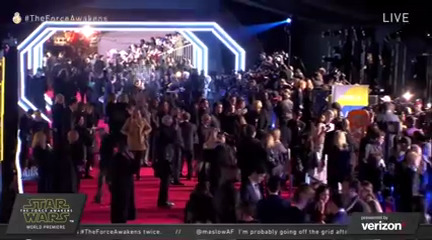
It's obvious why various critics would object to a film that makes light of Nazi Germany. Nevertheless, satire can reflect modern times as well as history in ways that straightforward drama can't. Some might argue that now isn't the right time for a Nazi satire, but others would debate that society needs a movie like Jojo rabbit. A great story about the Irishman is here.
Now more than ever, you're not to nuts. Jojo, tenue kids likes dressing up in front of you. If somebody wants to be part of a club. Number seven, the humor, the best weekend ever.
Soundtrack in the highest level of production
Wow. Your enjoyment of Jojo rabbit will hinder on how hard you laugh. Or of course, if you laugh, the film didn't tickle. Roger Freedman. Funnybone who wrote in his showbiz four one, one review Jojo rabbit is actually borderline antisemitic offensive on many levels and not even funny. Sam Adams of slate couldn't have disagreed more proclaiming for Jojo rabbit comedy.
Isn't a means to minimize, but to analyze wise, to pry at the way, hateful ideologies can be embraced as a comfort and how beneath their promise to. Blame how the world really works is an understanding no more sophisticated than a child's it's time to buy some books. Since humor is subjective, we guess there isn't always going to be a clear line between what's offensively funny and what's just plain offensive.
Oh God. Number six. Jewish jokes. Did you know, Jews can Z to each other's mind. So tell us, you know, who saw one? They could look just like us of Tyco. ITT satire is clearly the Nazis. However, the director who's of Jewish and Maori heritage also pokes fun at Judaism. Hi, well, the real Jordan Rumi was horrified by the audience's reception at the screening he attended.
Writing, you have no idea how it is to be surrounded by thousands of people laughing at jokes, specifically directed at Jews. That being said, Rumi seemed to be in the minority of a group that found the film. Hilarious. As with Borat and South park, many would argue that the humor and Jojo rabbit isn't intended to mock the Jewish faith, but to criticize how ignorant and Semites are a cute number five, the life is beautiful comparison, right?
Jojo Rabbit's reaction to mom's death
Yeah. Critics have stocked a Jojo rabbit up against numerous other films. But life is beautiful. Seems to be the one that's invited the most comparisons this 1997, Italian dromedy also presented world war II through a lighthearted lens, centering on a Jewish man who uses humor and imagination to shield his son from the horrors of the Holocaust. It's interesting what they write about this movie on Amazon.
Well, the film won an Academy award for best foreign language film, and even got nominated for best picture. There were those who found the movies comedic tone, inappropriate. Over two decades later, we will continue to debate if the movie is a life affirming fable or a dated misfire. It's actually eerie how much these two films have in common, especially since both one TIFs peoples choice award.

That is the strongest thing in the world. Number four, is it shocking enough? I was your age. I had an imaginary friend come in so much stuff even before the first trailer dropped Jojo rabbit was being built up as one of 20 nineteens most controversial movies. Weirdly enough though, some critics have expressed disappointment that the film isn't more shocking.
Well, audiences have arguably gotten more sensitive with time. There are still patrons who crave comedy that pushes the envelope to its limits. It's time to burn some books. Brian Talarico of the Chicago sun times felt Jojo rabbit played it too safe. Writing the final scenes of Jojo rabbit are too easy for a film that needs to be dangerous and daring.
Are the best scenes already included in the trailer?
Even if the film doesn't go all out with its edgy concept. Seeing Tyco, ITT dresses, Adolf Hitler will be more than enough to make a few jobs drop. What am I going to do? No idea. Going down the house in Glen Winston church one, negotiate number three. It's depiction of Nazis. The playlist Charles romesco took issue with the films, humanization of antisemites writing.
YTT concedes that a good percentage of Nazis really do hold hate in their heart. But maintains that at least some of them aren't you two seem to be getting on. Well, it doesn't seem like a bad cost. How much pain and suffering the Nazis caused many audiences will understandably struggle with this message.
However, if Ron Jones proved anything with his third wave social experiment in 1967, it's that even ordinary people can get swept up in the dangerous ideals of fascism. Likewise, Jojo rabbit poses, a challenging question. If we're not willing to acknowledge the bad and the good in people, how can we ever rid ourselves of prejudice?
Nothing makes sense anymore. Yeah, I know. It's definitely not a good time to be a Nazi. Number two it's message. And mother took me. She's kind me like a person, whatever your thoughts on Jojo rabbit, Tyco ITT clearly wanted to spread an anti hate message. YTT also claims that he started writing the screenplay before Nazis regained relevance in the media.
There's little doubt that why TTS intent was noble, whether or not the final product successfully gets his message across is where critics are split. A doubt of the a V club felt that making fun of Nazi Germany had been done before. Thus taking away from the movies, broader anti hate theme. Peter Howell begged to differ in his Toronto star review writing Taika YTT knocks it out of deer park with the meaningful lunacy of his anti hate satire, which is equal parts.
Adolf Hitler's thread in the movie
Mel Brooks, West Henderson, and own whimsical brilliance growing up too fast. Ten-year-olds and the celebrating war and talking politics. Before we continue, be sure to subscribe to our channel and ring the bell to get notified a better latest videos. You'll have the option to be notified for occasional videos or all of them.
If you're on your phone, make sure you go into your settings and switch on notifications. Number one it's depiction of Hitler. Well, they call me a scared rabbits. Okay. Let's address the giant rabbit in the room. Tyco YTT spends most of his screen time prancing around in a Nazi uniform and toothbrush mustache. If you want, you can read here about preparations for making a movie and other curiosities.

Without a doubt, YTT, didn't set out to deliver a serious or dignified portrayal of Hitler. Rather YTT aspired to make the fewer look as goofy and idiotic as possible. Oh, . Just painting Hitler as a wacky, even likable buffoon desensitized us to the atrocities. He committed though. Some may say yes while others may argue that it leaves audiences more informed and open-minded.
At the end of the day, everyone is going to have a different opinion of Jojo. Let them say whatever they want. People used to say a lot of nasty things about me. Oh, this guy's a lunatic. Oh, look at that psycho. He's going to get us all killed. Do you agree with our picks, check out this other recent clip from watch mojo and be sure to subscribe and ring the bell to be notified about our latest videos.
1 note
·
View note